
UK Medical School Admissions Experts

The Ultimate Guide to the BMAT Essay (BMAT Section 3) 2022
Section 3 of the BMAT requires you to write a short essay that covers a maximum of one side of A4 paper. You are given a choice of three essay titles that are usually in the form of a statement or a direct quote.
Normally, you’ll be asked to explain the reasoning behind the statement, argue to the contrary and then make a conclusion, although the sub questions can vary.
The quality of your content is scored from 1 to 5 (5 being the highest) and the quality of your English is scored from A-E (A being the highest).
So how should you prepare for this? Here are our top tips on preparing for BMAT Section 3!
Every Sentence Needs a Purpose
In the BMAT, you need to make sure every sentence has a purpose and adds to your argument/counterargument.
You need to make sure nothing is “fluffy” and each sentence makes a standalone point that could not be taken out of the essay. In some ways, this is like a scientific paper, where you want to skip any unneeded adjectives and storytelling to give the most coherent writing style possible.
Remember, you also only have one side of A4 so your space is precious!
Planning is Key!
A big chunk of your essay time should be spent making a plan. Depending on your writing speed, this can be anywhere between 10 and 15 minutes. Every sentence must have a purpose. If you plan in bullet points, you can cover each of your bullet points sentence by sentence.
Make your essay really structured, answering every subquestion individually. Some students use paragraphs to split this up; however, it may be wise to use small indents, as this gives you a little more space on the paper to write more.
It is most logical to follow the structure given in the sub-questions, which is usually:
Explain the reasoning behind the statement
Argue to the contrary
To give a conclusion
When asking your point, you need to give examples. This could be a specific scenario that you think the quote relates to or it could be an example from the news, public figures, a book, or a particular case.
Examples don’t need to be completely unique to score you highly, but they should be entirely relevant to the point of the essay. Don’t try to fit the essay around the example, instead, fit the example to the essay.
Practice as Though it were the Real Thing
You need to make sure that you are practising in the most realistic way possible. It’s really tempting to skip the plan and head straight into the essay; however, it’s going to be more effective if you time yourself the full 30 minutes and force yourself to use 10-15 minutes of this time to adequately plan.
If the BMAT is on pen and paper, download and print some section 3 answer sheets, so you know exactly how much space you have.
Have Fun With It!
I know this is really easy to say and hard in practice but, your application journey is an exciting period of your life. You get to decide on your own future and decide where you’re going to spend the next 5 or 6 years. The BMAT, although tricky, is a part of this and it may open up some really exciting doors for you!
If you would like further help, BMAT tutors can guide you.
Recent Posts
Book UCAT Exam 2023. When is UCAT 2023?
Stand Out in Medical School Admissions: The Power of Online Medicine Work Experience
UCAT 2023: Ultimate Guide, Important Dates, and Proven Tips for Success
Comentarios
- [email protected]
- +44 (0) 333 050 7764 (Mon-Fri (9AM-5PM)
- Award-Winning Medicine Application Support
- +44 (0) 333 050 7764 (Mon-Fri 9AM-5PM)
You decide how much you want to pay for our Personal Statement Bundles!
Other PS Support
All UCAT Support
All Interview Support
- All-In-One Tutor
- UCAS Statement Tutor
- Interview Tutor
- Medicine Mock Interviews
- A-Level Tutor
- Medical School Guides & Reviews
- Medical School Success Calculator
- PS Free Resources
- UCAT Free Resources
- Interview Free Resources
- Our Guarantee
BMAT: Section 3 [The Definitive Guide]
Home » Application Guide » BMAT: Section 3 [The Definitive Guide]
Looking for BMAT guidance?
Application Guide Menu
The BMAT has now been discontinued. All applicants for undergraduate medicine in the UK will be required to sit the University Clinical Aptitude Test (UCAT) for their application. Check out our wide selection of Free UCAT Guides to get started with your preparation.
Welcome to our guide on the final section of the BMAT – the essay Section 3.
Section 3 of the BMAT is where the test really shows its differences from the other medicine admissions test, the UCAT. Unlike every other section of both exams, this section is NOT multiple choice but a short writing task.
Let’s see how you can prepare your writing skills in time for the big test!
What is BMAT Section 3 and why is it tested?
Section 3 tests your ability to develop and organise ideas and to communicate them concisely and effectively in writing.
It is more commonly known as the dreaded essay section, and many candidates often find themselves questioning its relevance during revision frustration. However, the skills needed to do well in Section 3 are vital for a career in medicine.
The ability to formulate your own arguments and communicate your ideas clearly is crucial for a successful academic or clinical career. The university needs to be able to see a demonstration of these skills in order to be sure that a candidate will be the right fit for the course.
What will Section 3 look like in the BMAT?
The BMAT is a two-hour exam. You have 30 minutes to spend on Section 3. Here’s a quick refresher of the format of the BMAT exam:
The exam paper will offer a choice of three different essay questions, and you must choose one essay to answer. Each essay question will be followed by three prompts and you must address all three parts of this in your essay. For example:
BMAT Section 3 Example Questions (2019 Paper)
- People are often motivated to deny the existence of problems if they disagree with the solutions to those problems.
Explain what you think is meant by the statement. Present a counter-argument. To what extent do you agree with the statement?
2. ‘In science, there are no universal truths, just views of the world that have yet to be shown to be false.’ (Brian Cox and Jeff Forshaw)
Explain what you think is meant by the statement. Argue that scientists need to accept some things as ‘truths’ to advance their understanding. To what extent do you agree with the statement?
3. Teamwork is more important for surgical innovation than the skills of an individual surgeon.
Explain the reasoning behind this statement. Argue that the skills of individual surgeons are more important for surgical innovation or progress. To what extent do you agree with the statement?
Boost your BMAT Section 3 essay with 6med.
Learn expert writing techniques for the BMAT with guidance from tutors who scored in the top 10%, alongside expert resources to support you in every aspect of the test.
Need some extra guidance in boosting your BMAT score?
Learn everything there is to know about the BMAT, with our BMAT Bundle and be guided by a tutor who scored in the top 10% – meaning you’re truly getting expert help.
Want to learn how to smash the BMAT , then this bundle is the one for you…
You are given a single page of A4 as an answer sheet, and your essay must fit into this space. Only what is contained on the single A4 page will be scanned, sent to the examiner, and marked.
How Can I prepare for BMAT Section 3?
The BMAT essays, like medical interviews, will cover a range of social and medical issues. To prepare for the BMAT, it is recommended you keep up to date with current medical, social, and political issues.
Newspapers, medical journals, and medical blogs are good resources, with the Health and Science sections of BBC News being particularly useful. Reading these articles will not only arm you with points to use in your essays but will also show you how to argue these ideas articulately and concisely.
It is vital you practice formulating and communicating your ideas about a topic. Get together with other students who are preparing their medical applications and practice debating health and social topics with each other. This will not only increase your chances of getting a good Section 3 score but will also improve your medical interview skills.
The most vital preparation for all BMAT sections is practice. Download the official past papers here and get used to planning and writing essays under timed conditions. Print off the official answer sheet and use this for writing your essay; it is key you get used to writing in the limited space available.
Of course, we’d also recommend our own resources to help your prepare for the BMAT. We run the best crash courses in the world for the BMAT, as well as having an intuitive online platform in BMAT Ninja. You can get access to both, along with 5 x Section 3 essay edits with our BMAT Bundle (our best value BMAT support).
BMAT Essay Planning
To make the most of your limited answer space, it is incredibly important you spend at least 5-10 minutes planning your essay.
Take a spare piece of paper (there is usually a blank page in the question paper earmarked for this purpose) and plan your essay point by point before you think about touching the answer sheet.
The planning stage can be split into two clear parts.
Get everything down on paper.
Write down everything you know about the subject and all your ideas on the topic.
Organise these ideas.
Create clear subsections, which can be derived from the three prompts listed in the essay question, and structure your ideas into bullet points beneath each heading.
Before moving onto writing your essay make sure:
- The ideas conveyed in your bullet points flow smoothly from one to the next
- Your essay is well balanced , with points covering both sides of the argument
- You have not included any points that are outside the scope of the essay question
- You have only included your most relevant and most important points to make best use of the limited space
- Every part of the essay question and subsequent prompts have been addressed by your ideas
Writing Your Essay
The essay should be divided into three main parts: an Introduction, a Main Body, and a Conclusion. Let’s go into each section in a little more depth starting with the introduction.
THE INTRODUCTION
Your introduction should clearly set out the aims of what you are about to write.
You should state what the essay will try to achieve, and briefly mention some of the main points you will consider, both for and against the essay question.
The introduction is a brief overview of your argument and should not go into any great detail.
Your introduction is successful if it tells the reader:
- What is the topic of the essay?
- What is the essay planning to answer?
- What are the main points for and against?
The introduction is usually where you will tackle the first prompt of the essay question, which usually asks you to explain the reasoning behind a statement or to define a principle.
THE MAIN BODY
The main body of your essay is where you should address your key points in detail.
This should be the longest part of your essay and should be split up into 2-4 paragraphs. Most candidates will write at least one paragraph per each of the three prompts included in the essay question.
It is crucial that the main body of your essay includes points both for and against the essay question. The marking scheme mandates that the essay must communicate a balanced argument to secure a minimum content score of 3.
You should start a new paragraph for each major new idea in your essay, in order to clearly indicate to the examiner the structure of your argument. Each paragraph should start with a sentence that signposts the main point you are going to explore in that section. The rest of the paragraph will then expand and back up your main point in greater detail and with relevant examples.
In each paragraph, only include sentences that are directly related to the issue set out in the signposting sentence. Quoting sources and statistics can lend an air of professionalism and credibility to your essay. However, if you do not know any, do not make these up – the BMAT examiners are paid by the hour and therefore have the time to fact-check any claim you may make.
THE CONCLUSION
Your conclusion should summarise the main points of your essay, and if appropriate, draw a final judgement on the topic you have been discussing.
There should be no new evidence in your conclusion, it is simply a summary of what you have already stated in the main body of the essay.
In the next section, we will go through examples of successful essay plans so you can see how the entire process works. Read on to check it out.
Prepare for the BMAT with expert support from 6med.
Ace the BMAT with comprehensive support from 6med. Access expert revision and practice materials as soon as you sign up.
BMAT Online Course
We've got all the tips and tricks you need to score highly on the BMAT.
With our BMAT Bundle, cover Sections 1, 2 and 3 of the BMAT in detail with tips and strategies to ensure you achieve the highest possible score.
Examples of Successful Essay Plans
First, we’ll start by presenting the question that we want to answer. Then we’ll go into the kind of notes you should be writing when planning your essay.
An important part to consider is the wording within the question – this will give you an indication of what the examiners are wanting to see and should direct your essay plan.
Fully Worked Essay Question [1]
As a physician, you have a duty to consider the wider society when treating an individual patient.
Explain the reasoning behind this statement. Argue that a doctor’s main priority should always be the patient he is currently treating. With respect to medical treatment, to what extent can a patient’s interests differ from those of the wider population?
Fully Worked Essay Plan [1]
Explain the statement..
- The four principles of medical ethics, as described by Beauchamps and Childress (2008) are autonomy, beneficence, non-maleficence, and justice.
- This statement is clearly addressing the principle of justice: the duty to share and allocate treatment equally across all patients.
Argue that a doctor’s main priority should always be the patient he is currently treating.
- Medical treatment should be individualised where possible. Each patient may respond differently to the same treatment, depending on their individual characteristics and co-morbidities. Therefore while general guidelines may be useful, we should tailor our treatments to best benefit the patient we are currently treating.
- While utilitarianism holds its place in medical ethics, it is important we do not use ‘considering the wider society’ as an excuse to provide subpar care.
With respect to medical treatment, to what extent can a patient’s interests differ from those of the wider population?
- Resources are finite; we must allocate treatments where it will be the most effective and provide the most benefit. For example, a specific drug may provide little or no benefit to a terminal cancer patient but may be curative to those with early stage cancer. Therefore we should prioritise the treatment for the latter group.
- We must consider the cost-effectiveness of each drug. We cannot in good conscience supply an extremely expensive drug that treats only a small number of patients when this comes at the cost of several cheaper treatments that benefit the entire population.
- Certain medical diagnoses are notifiable and Public Health England must be informed, even if the patient does not wish the condition to be disclosed. This is because in some scenarios (e.g. potential spread of a highly contagious disease) protecting the public is deemed more important than an individual’s right to confidentiality. A similar situation arises if a patient refuses to disclose certain diagnoses to official bodies as required by law (e.g. epilepsy to the DVLA). In this case, the doctor is required to override the patient’s wishes and inform the body themselves.
Fully Worked Essay Question [2]
2. Publishing surgeons’ mortality rates may lead to surgeons declining to perform high risk cases and only operating on safer, more routine patients.
Explain what this statement means. Argue that the publication of such statistics is necessary. To what extent do you believe league tables will change surgeons’ behaviour to benefit patients?
Fully Worked Essay Plan [2]
Explain what this statement means..
- Publishing a ‘league table’ of surgeons by their mortality rates may cause physicians to avoid operating on high-risk cases risk to avoid lowering their personal statistics. This will lead to an overall decline in the ability of surgeons and also a dearth of doctors willing to treat difficult cases.
Argue that the publication of such statistics is necessary.
- Publication of such data is needed for clinical governance, namely to produce audits comparing individual surgeon performance to national and regional averages to ensure competency.
- Transparent mortality rates could highlight discrepancies in surgical teaching and education between regions
- By comparing one surgeon to another, surgeons will be incentivised to improve the quality of care they are delivering
- The NHS ‘Choose and Book’ system was introduced to allow patients greater autonomy over who they are treated by. Publication of surgeons’ mortality rates would help patients make an informed decision when choosing a doctor.
To what extent do you believe league tables will change surgeons’ behaviour to benefit patients?
- It would be hoped that publication of league tables would incentivise surgeons to perform better, seek continual training, and strive for optimal performance.
- In medical ethics, beneficence describes a doctor’s duty to perform actions that will benefit patients. It is likely the fear of a poor mortality rate would supersede a surgeon’s duty to abide by this principle; resulting in surgeons avoiding high-risk cases. This would result in an overall detriment, not benefit, to patients.
How will you be marked?
For Section 3, you are graded on both the quality of your content and the quality of your English.
Content quality is graded on a scale from 1-5.
English quality is graded from A-E .
Therefore the best possible mark you can gain from this section is 5A, however, the average mark achieved is 3A, with only the top 5% of students achieving 4A and above.
Each essay is double marked. For the quality of content, the scores given by each examiner are averaged if they are the same or one point away from each other. So if you are awarded a 3 by Examiner 1 and a 4 by Examiner 2, you will be awarded a 3.5.
However, if the two examiners disagree by more than one point in their marking (e.g. if you are awarded a 2 and a 4) the essay will be sent to a third examiner, with the final mark will be checked by the BMAT Assessment Manager.
For the quality of English, each examiner awards a score of either A, C, or E. The two scores are then combined in the following ways to give the final result: AA = A, AC = B, CC = C, CE = D, EE = E
What do I need to do to get the top mark?
To achieve a 5 for quality of content, you need to produce an essay that:
- Has no significant weaknesses
- Addresses all aspects of the question
- Has an argument that is clear, logical, and well-reasoned
- Covers a wide range of relevant points
- Has a clear and compelling conclusion
To achieve an A for quality of English, your writing must have:
- Good sentence structure
- Good use of vocabulary
- Good spelling, punctuation, and grammar
Does the essay section even matter?
You may hear people say that Section 3 isn’t as important as Section 1 or Section 2. There is an element of truth to this; Oxford and Leeds place a higher weight on Section 1 and 2 (40% each) compared to Section 3 (20%).
However other universities, such as Cambridge, take all marks for the BMAT score into consideration alongside a number of other factors, such as your A-level grades and interview scores.
Therefore, to be an attractive medical candidate to as many universities as possible, it is important to prepare well for every part of your medical application, including Section 3 of the BMAT.
Top Tips For BMAT Section 3
Download the official practice and past paper examinations.
This will make sure you have familiarised yourself with the question format.
Don’t slack when you’re practicing!
Even when practicing, make sure you plan your essays well: this is the most important part of writing your essay.
Use the official answer sheet.
Practice writing essays using the official answer sheet to get used to the space given.
Only practice under timed conditions.
There is little point in writing a perfect essay if it has taken longer than you will have in the exam.
Write neatly, and in the smallest font that is still clearly legible to the examiner.
For an examiner faced with hundreds of essay papers to mark, a well-presented and tidy essay will be a delightful change and they will be more likely to award higher marks.
Keep up to date with the latest medical, social, and political issues.
You can do this by reading news articles and medical journals. This will allow you to provide an educated argument and bring in fresh viewpoints.
Discuss recent medical and political issues with friends & family.
This will help you to shape your ability to formulate and effectively communicate an argument.
Revising for Section 3 of the BMAT is as essential as any other part of your medical application preparation. The knowledge and skills needed to write a good BMAT essay will serve you well in medicine, and more short-term, in your medical interviews.
The key to achieving a competitive score BMAT sections is to familiarise yourself with past papers, practice under timed conditions, and start prepping early!
unlock infinite medical wisdom
Just leave your email in the box and you’ll receive weekly updates and the best tips for your medical application!
Application Support
- Personal Statement
- Crash Courses
- 1-1 Tutoring
Free Resources
- Personal Statement Free Resources
- Medicine Application Guides
Other Stuff
- UCAT.Ninja™
- Exams.Ninja
- School Support
- Tutor With Us
- Help Centre
Lost with your application?
A friendly medic is just a phone call away! Get some helpful advice and get on track with your application.
Username or email *
Password *
Forgotten password?
[email protected]
+44 (0)20 8834 4579
Your Extensive Guide To The BMAT
Please note that the BMAT is now discontinued. Most universities that used the BMAT will use the UCAT from 2024 onwards. See our comprehensive UCAT guide.
Understand BMAT
- Understand the BMAT test format
- Get the key BMAT dates
- See what’s changing in the future
Jump to Section
The BMAT (BioMedical Admissions Test) used to be required by a handful of Medical, Dental and Veterinary schools. However, it’s now been fully discontinued. Most universities that used the BMAT will use the UCAT from 2024 onwards. See our comprehensive UCAT guide .
What Is BMAT?
BMAT is a two-hour admissions test that assesses a combination of aptitude and knowledge. It tests a broad range of skills across three sections:
- Section 1 tests your skills in problem-solving, understanding arguments, and data analysis and inference. You’ll answer 32 multiple-choice questions in 60 minutes.
- Section 2 examines your ability to apply scientific knowledge that is typically covered in school Science and Mathematics by the age of 16. You’ll answer 27 multiple-choice questions in 30 minutes.
- Section 3 assesses your ability to select, develop and organise ideas, and to communicate them concisely and effectively in writing. You’ll produce an essay on one of three questions that you choose, and you get 30 minutes to do this.
The BMAT is a tough exam because you can’t use a calculator or dictionary, there’s a lot of time pressure, and it tests such a broad range of skills. Many scientifically-minded students specifically view the essay-writing component with trepidation.
Boost Your BMAT Score
Get Doctor-designed strategies trusted by top schools
Future BMAT Changes
In 2023, the BMAT exam will run as normal. However, it has been announced that the BMAT will be discontinued from 2024 onwards.
This means that BMAT universities will be putting alternative arrangements in place for the future. Some of them may become UCAT universities or introduce their own university-specific admissions tests. The University of Leeds, a former BMAT university, has already made changes and switched to the UCAT this year.
Find out more about the cancellation of the BMAT in this blog .
Who Should Sit The BMAT Test?
If you want to apply to any BMAT universities, you’ll need to sit this exam. If you don’t sit the exam, you won’t be considered by this select group of Medical Schools and will only be able to apply to UCAT unis .
Some people choose not to apply to BMAT unis because they want to focus on UCAT only – but others understand that by doing both tests, you’ll be able to apply to a wider variety of Medical Schools, allowing you to be more strategic with your UCAS choices.
Which Universities Require BMAT?
Six UK universities currently require the BMAT. Discover which ones – and how they’ll use your BMAT score – in our guide to BMAT universities .
Save Money With BMAT Packages
Get a 20% discount when you bundle BMAT prep together with our packages
How Is BMAT Scored?
For sections 1 and 2, you’ll get a score (to one decimal place) on a nine-point scale.
Section 3 is scored very differently: your quality of content will be scored on a scale from one to five, and your quality of English will be scored on a scale from A to E.
Importance Of BMAT Scores
BMAT scores are more important than ever before. The increasing numbers of Medicine applicants with competitive grades means a high BMAT score is one of the few ways you can really stand out as a candidate.
Furthermore, your score is really important to make sure you get invited to Med School interviews . BMAT universities will either set a cut-off score that you need to beat, rank candidates by score, or use it alongside the Personal Statement when shortlisting candidates.
Find out more about how it works in our BMAT Scores guide .
How Do I Prepare For BMAT?
We recommend that the best BMAT preparation should include:
- Learning the right strategies, for example by joining our BMAT course or Online BMAT Course
- Practising with BMAT questions
- Getting one-to-one teaching with BMAT tutoring , if you need additional prep support
BMAT Preparation Tips
- Check out our guide to BMAT revision
- Learn BMAT strategies with our Online BMAT Course
- Find out what scientific knowledge Section 2 questions may require on the BMAT site
- Build your aptitude in Maths and Science with small-group BMAT teaching
- Practise with BMAT questions and mock tests
Bmat Preparation
BMAT Course
Our BMAT Course has been created by Doctors and Oxbridge Science grads. It even includes a secret formula for Section 3 success. Secure your place in-person or online.
Online BMAT Course
Combine the very best of BMAT teaching, live courses, online practice and private tutoring. You'll save 20% on everything with our BMAT-boosting prep packages.
BMAT Questions
Our BMAT Question Bank allows you to answer and mark BMAT questions from every section of the test. See step-by-step solutions and discover your score for past papers.
BMAT Tutors
Give your BMAT performance a big boost with one-to-one BMAT Tutoring. Learn our proven pedagogy from Doctor-trained tutors.
Independent Reviews
Deciding on medicine.
Loading More Content
⚡️ Boost your A-Level revision this Easter with our LIVE revision classes. Now with 10% OFF with the code EASTER10. Click to find out more!
BMAT Past Paper Compilations with Free Worked Solutions
Unsure how much to revise for bmat physics looking for free explanations for official bmat past papers struggling to find bmat section 3 essay plans.
Welcome to our BMAT Past Paper Bank with BMAT Past Paper Compilations for BMAT Section 1 and 2 along with detailed explanations and worked solutions. We also have BMAT Section 3 Essay Plans - your golden BMAT resource.
BMAT S1 Past Papers
| BMAT Past Paper 2023 Section 1
| BMAT Past Paper 2019 Section 1
| BMAT Past Paper 2018 Section 1
| BMAT Past Paper 2017 Section 1
| BMAT Past Paper 2016 Section 1
| BMAT Past Paper 2015 Section 1
| BMAT Past Paper 2014 Section 1
| BMAT Past Paper 2013 Section 1
| BMAT Past Paper 2012 Section 1
| BMAT Past Paper 2011 Section 1
| BMAT Past Paper 2010 Section 1
| BMAT Past Paper 2009 Section 1
| BMAT Past Paper 2008 Section 1
| BMAT Past Paper 2007 Section 1
| BMAT Past Paper 2006 Section 1
| BMAT Past Paper 2005 Section 1
| BMAT Past Paper 2004 Section 1
| BMAT Past Paper 2003 Section 1
BMAT S2 Past Papers
| BMAT Past Paper 2023 Section 2
| BMAT Past Paper 2019 Section 2
| BMAT Past Paper 2018 Section 2
| BMAT Past Paper 2017 Section 2
| BMAT Past Paper 2016 Section 2
| BMAT Past Paper 2015 Section 2
| BMAT Past Paper 2014 Section 2
| BMAT Past Paper 2013 Section 2
| BMAT Past Paper 2012 Section 2
| BMAT Past Paper 2011 Section 2
| BMAT Past Paper 2010 Section 2
| BMAT Past Paper 2009 Section 2
| BMAT Past Paper 2008 Section 2
| BMAT Past Paper 2007 Section 2
| BMAT Past Paper 2006 Section 2
| BMAT Past Paper 2005 Section 2
| BMAT Past Paper 2004 Section 2
| BMAT Past Paper 2003 Section 2
Biology BMAT Past Papers
12 | Inheritance and Genetics
11 | Homeostasis
4 | Digestion
6 | Respiration
5 | Cell Division
6 | Nervous System
3 | Natural Selection
5 | Genetic Engineering
2 | Cell Structure
1 | Heart and Circulation
3 | Kidneys
1 | Carbon Cycle
Physics BMAT Past Papers
10 | Electricity
3 | Speed, Distance, Time
1 | S.I. Units
9 | Energy and Work Done
2 | Density
2 | Electromagnetism
9 | Radioactivity
Chemistry BMAT Past Papers
4 | Atomic Structure
3 | Separation
14 | Calculations
1 | Electrolysis
5 | Structure and Bonding
1 | Equilibria
9 | Balancing Equations
3 | Reactions & Elements
3 | Organic
Maths BMAT Past Papers
18 | Algebra
1 | Transformations
2 | Calculations
5 | Area & Length
4 | Trigonometry
6 | Probabilities
2 | Graphs and Gradients
Critical Thinking BMAT Past Papers
1 | Assumptions
2 | Conclusions
4 | Inferences
5 | Strengthening Evidence
6 | Weakening Evidence
8 | Conclusions (IMAT)
9 | Conclusions 2 (IMAT)
10 | Assumptions (IMAT)
11 | Flaws (IMAT)
12 | Effect of Evidence (IMAT)
13 | Applying Principles (IMAT)
14 | Matching Arguments (IMAT)
BMAT Section 3 Essay Plans
1 | BMAT 2016 Q1
2 | BMAT 2016 Q2
3 | BMAT 2016 Q3
4 | BMAT 2017 Q1
5 | BMAT 2017 Q2
6 | BMAT 2017 Q3
7 | BMAT 2018 Q1
8 | BMAT 2018 Q2
9 | BMAT 2018 Q3
BMAT S3 Past Papers
| BMAT Past Paper 2019 Section 3
| BMAT Past Paper 2018 Section 3
| BMAT Past Paper 2017 Section 3
| BMAT Past Paper 2016 Section 3
| BMAT Past Paper 2015 Section 3
| BMAT Past Paper 2014 Section 3
| BMAT Past Paper 2013 Section 3
| BMAT Past Paper 2012 Section 3
| BMAT Past Paper 2011 Section 3
| BMAT Past Paper 2010 Section 3
| BMAT Past Paper 2009 Section 3
| BMAT Past Paper 2008 Section 3
| BMAT Past Paper 2007 Section 3
| BMAT Past Paper 2006 Section 3
| BMAT Past Paper 2005 Section 3
| BMAT Past Paper 2004 Section 3
| BMAT Past Paper 2003 Section 3
Free BMAT Textbook
- Free Guide on Acing BMAT
- 50+ Practice Questions
- Learn effective techniques
Get the real learning experience by trying one of our lessons for free today!
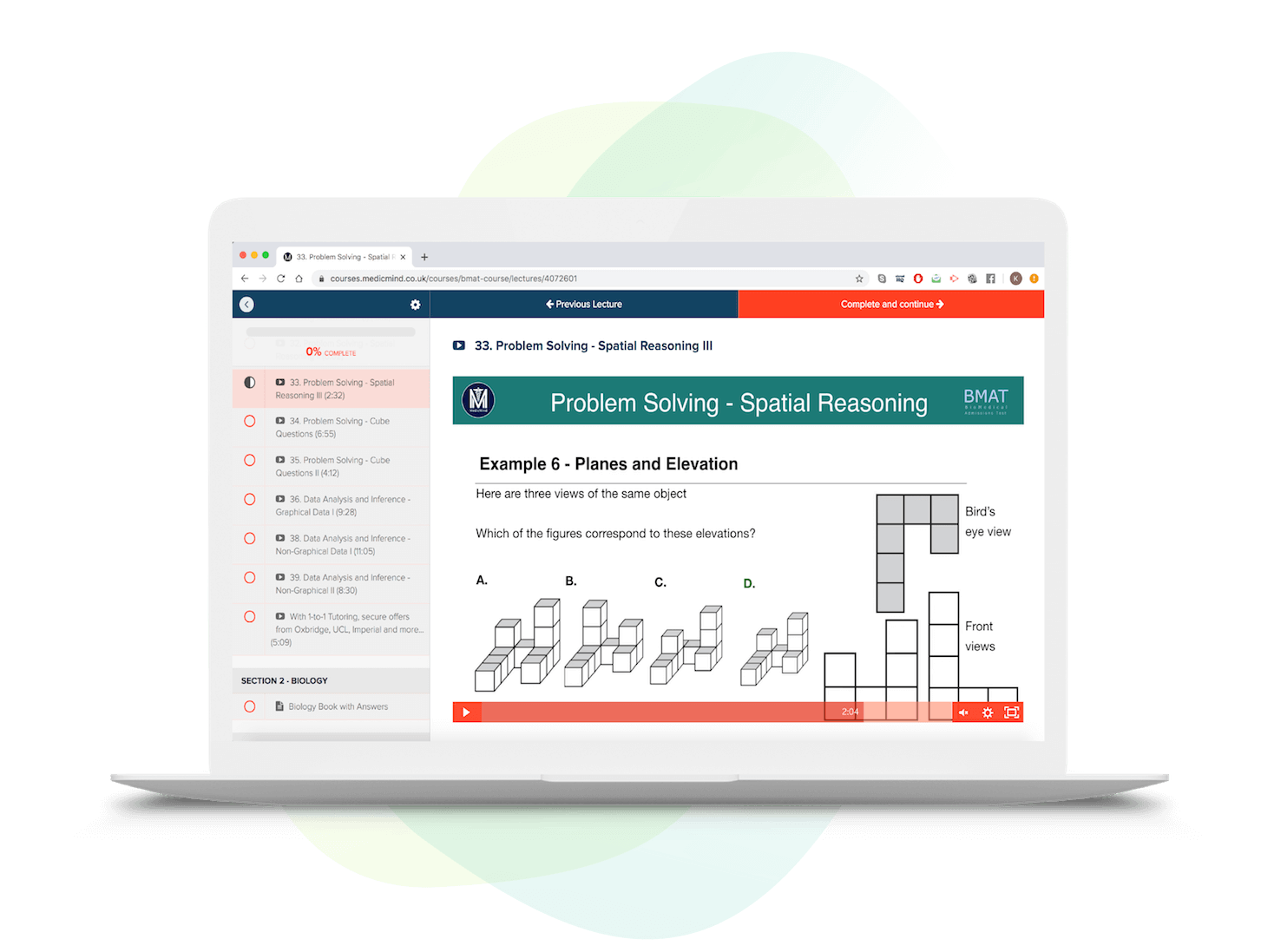
Get the real learning experience for free today
Liked our BMAT Past Paper Worked Solutions? Get the full BMAT Experience today! Click the button below to try a sample of our BMAT Online Course!
We cover every BMAT Past Paper Question
S1: critical thinking.
We go through BMAT Past Papers from 2003 for Critical Thinking and teach you evidence-based methods to help you answer BMAT Section 1 Questions and do well in the BMAT in 2024.
- Lesson 1 Introduction
- Lesson 2 Conclusions: Theory
- Lesson 3 Conclusions: Questions
- Lesson 4 Assumptions: Theory
- Lesson 5 Assumptions: Questions
- Lesson 6 Flaws: Theory
- Lesson 7 Flaws: Questions
- Lesson 8 Evidence: Theory
- Lesson 9 Evidence: Questions
- Lesson 10 Inferences: Theory
- Lesson 11 Inferences: Questions
- Lesson 12 Principles: Theory
- Lesson 13 Principles: Questions
- Lesson 14 Parallels: Theory
- Lesson 15 Parallels: Questions
Introduction
Here will introduce what critical thinking question types are most common and look at BMAT trends from BMAT past papers over the past 5 years and beyond.
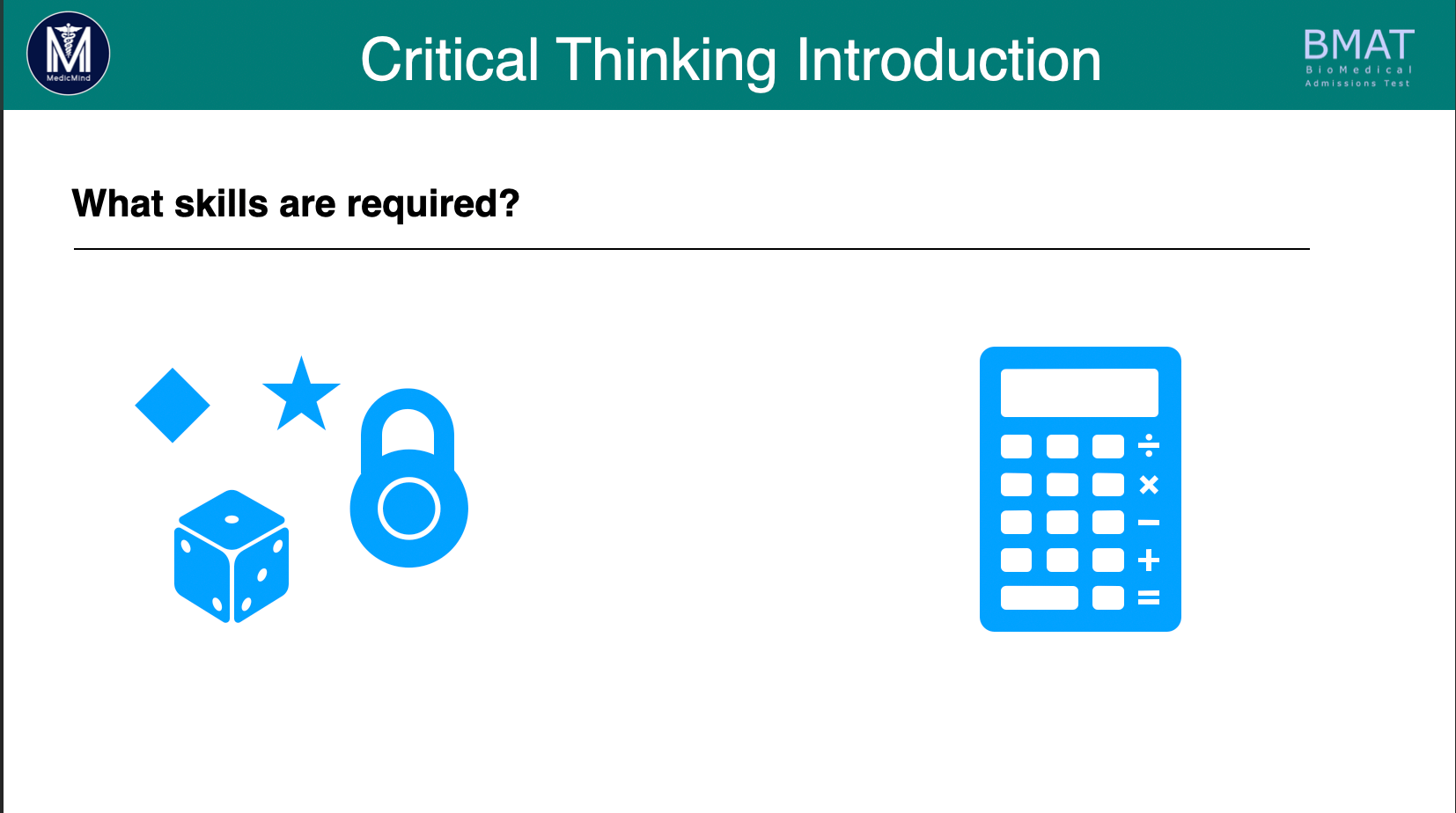
Conclusions: Theory
Here we tackle the easier Conclusion questions. We’ll discuss what these questions involve, and practice some questions together from BMAT Past Papers
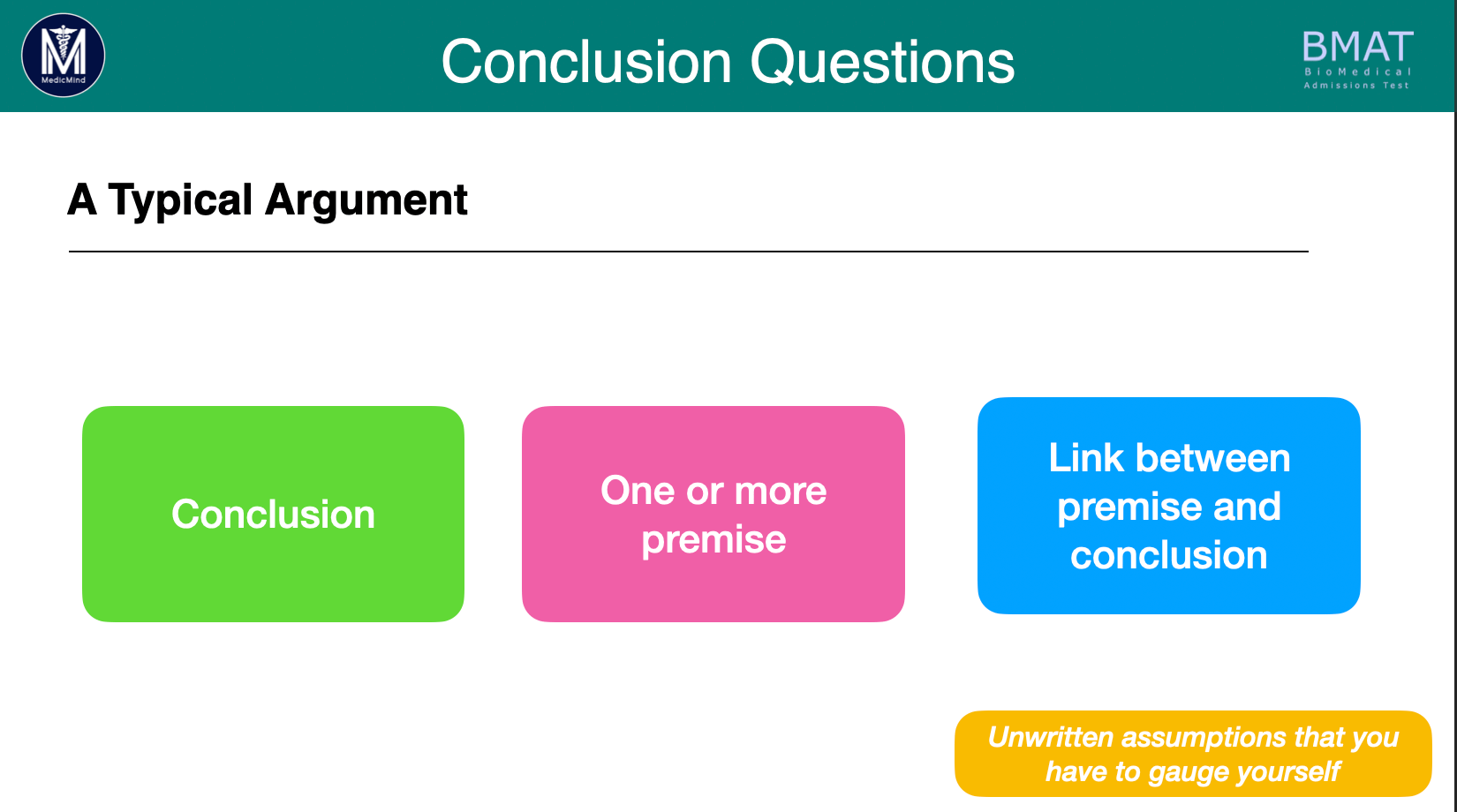
Conclusions: Questions
Hopefully by now you have understood the theory and we will apply it to BMAT Past Paper questions to see if you can show us that you have! If you are struggling, we will delve deeper and go into theory more.
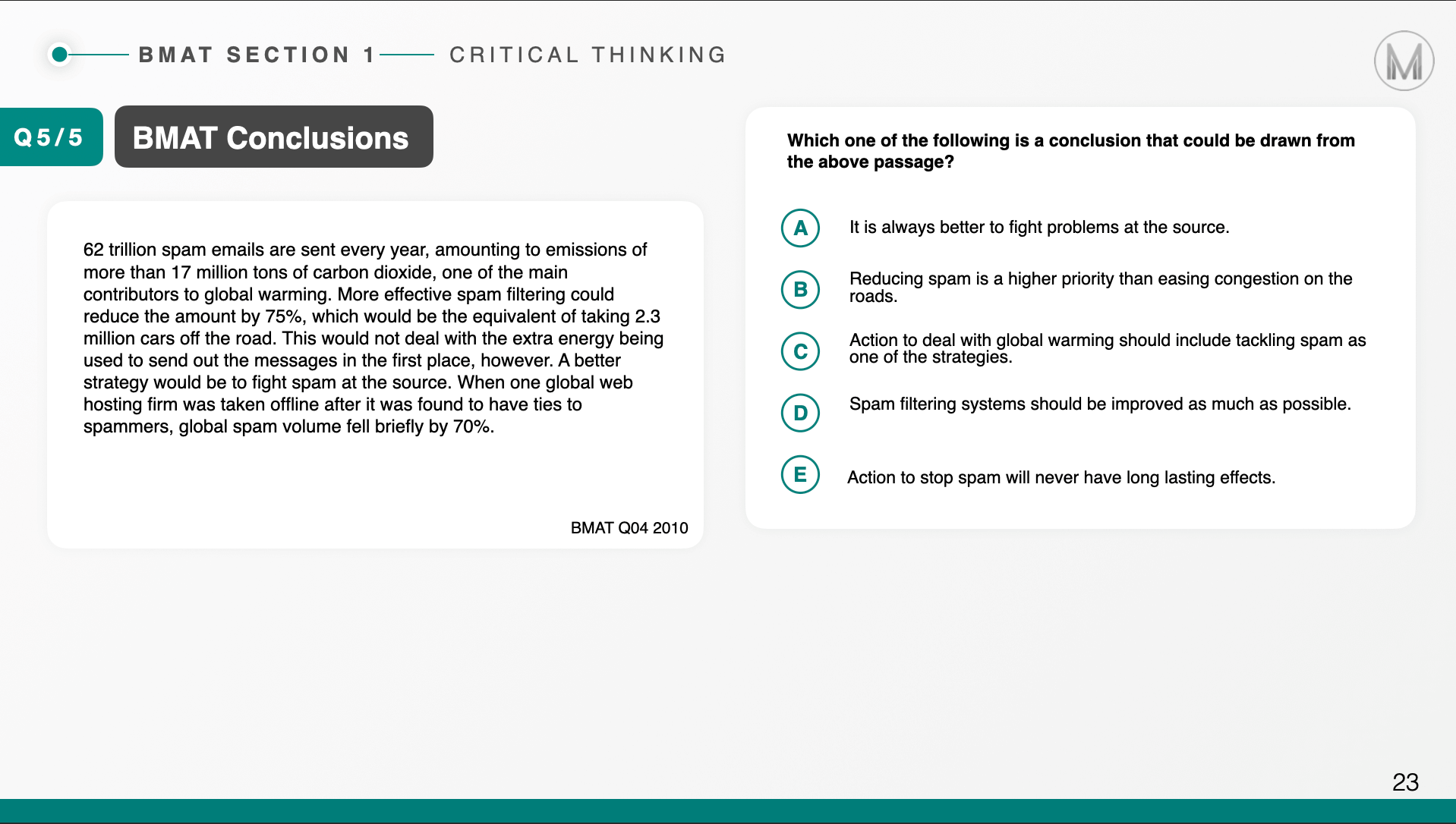
Assumptions: Theory
In this tutorial, we tackle the more difficult Assumption questions, discussing a range of techniques for time-saving and efficient working. We work through BMAT Past Paper Worked Solutions
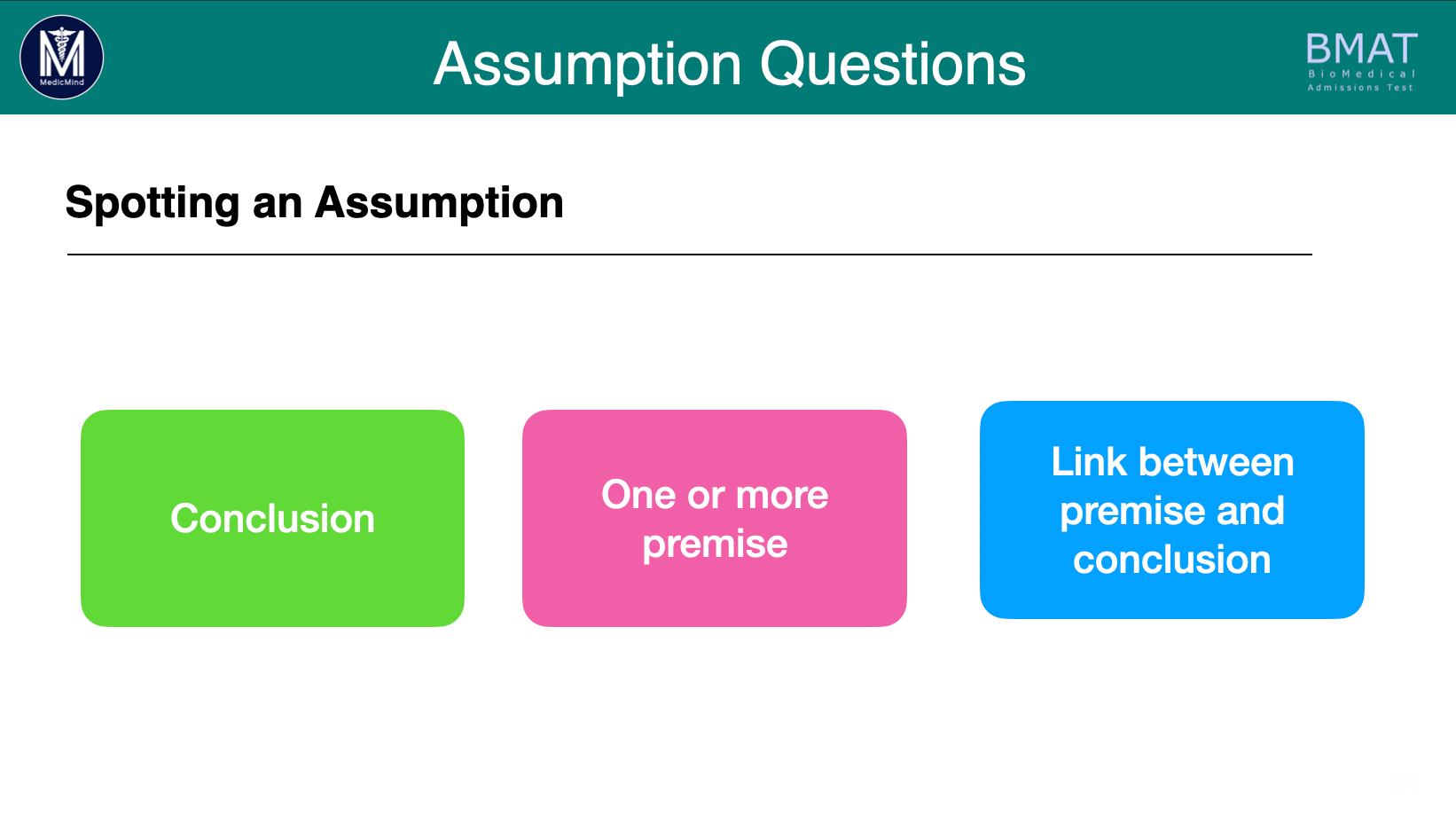
Assumptions: Questions
To make sure you’re 100% confident, we’ll test you on a few questions from BMAT Past Papers ensure you’ve fully grasped the content we have taught you
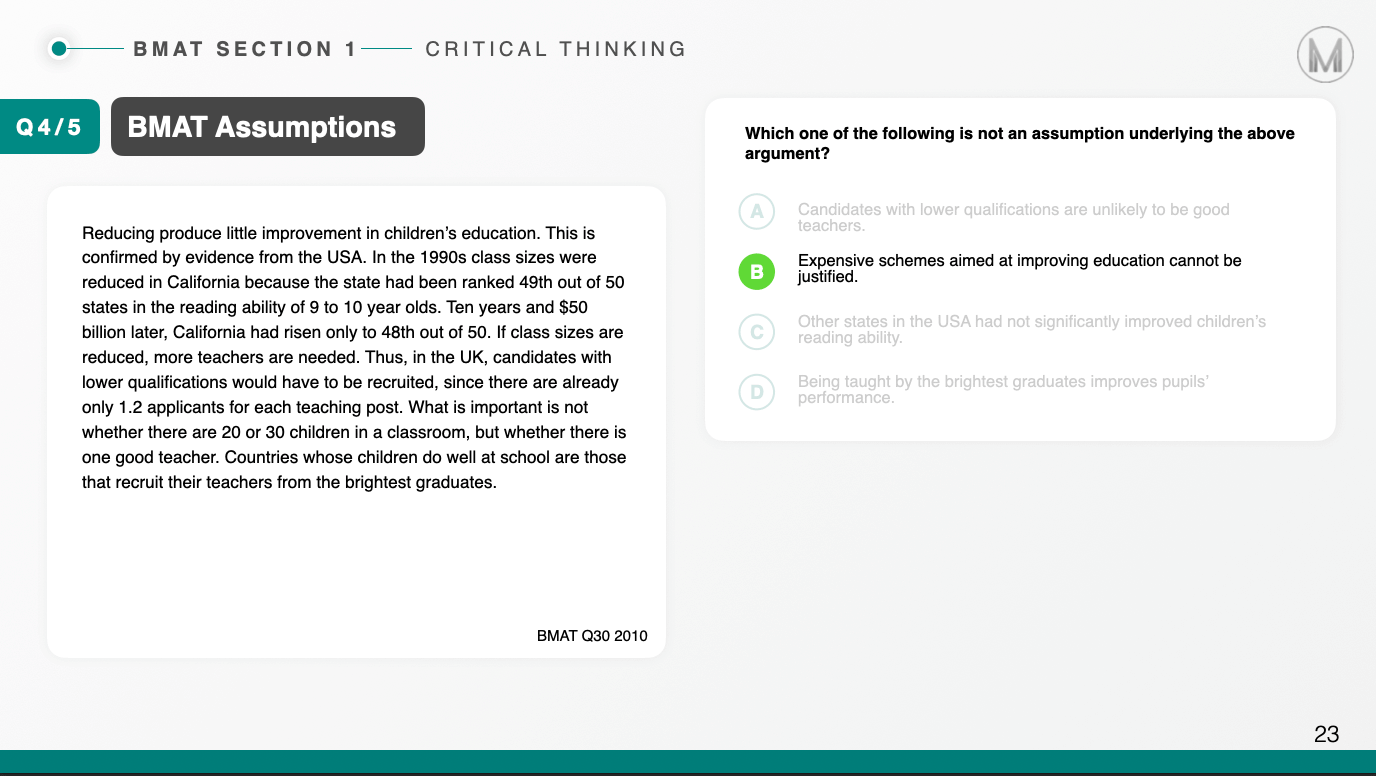
Flaws: Theory
Flaw Questions often trick BMAT students up – even after doing lots of BMAT Past Papers. We’ll teach you how to spot them and answer them well in a limited amount of time.
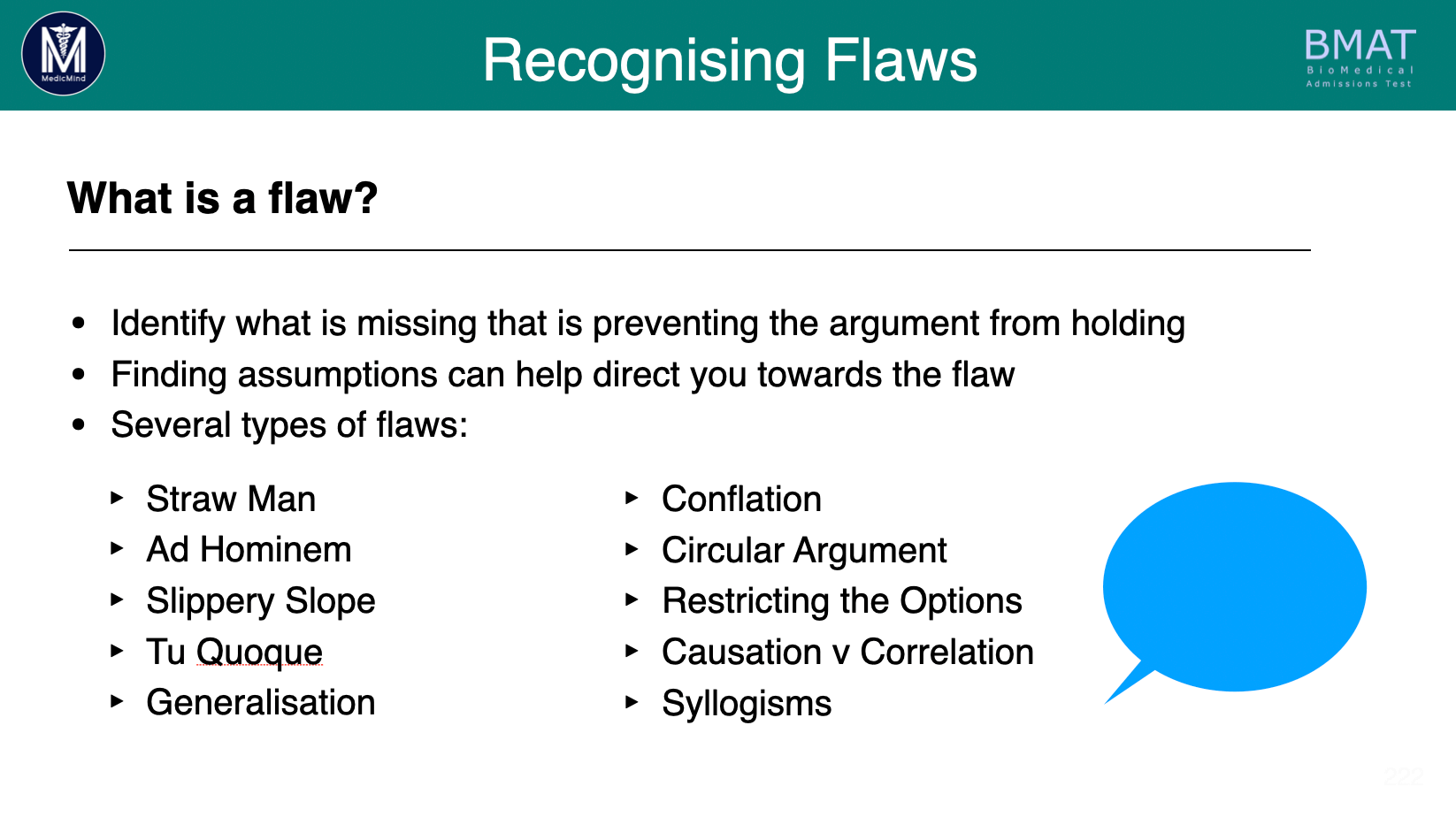
Flaws: Questions
You will then apply the knowledge gained from the previous tutorial and become confident in knowing how to approach spatial reasoning questions. We’ll have plenty of BMAT Questions for you to use.
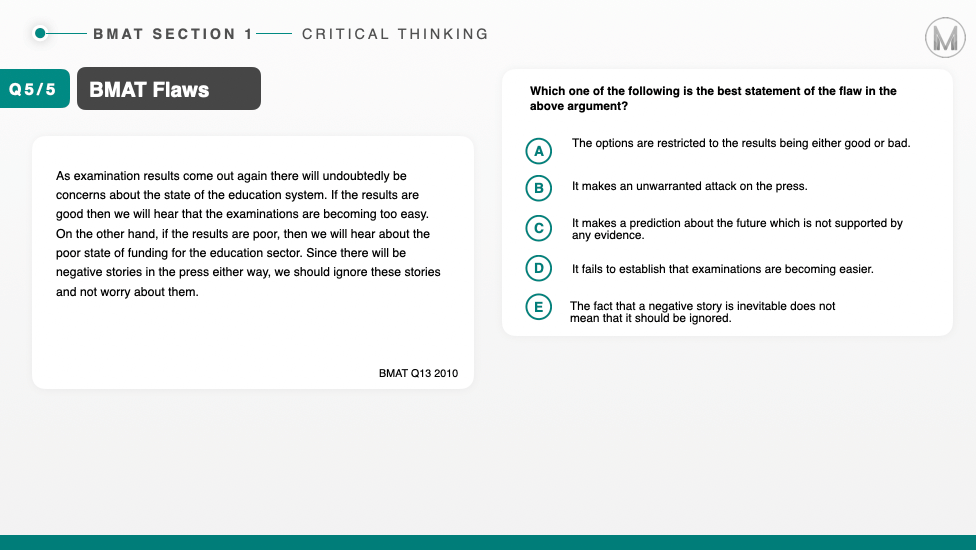
Evidence: Theory
Here, we teach you how to apply our Critical Thinking techniques on the most difficult and long-winded questions in the BMAT – Evidence Questions. Our BMAT Past Papers will be absolutely vital here in securing your grade
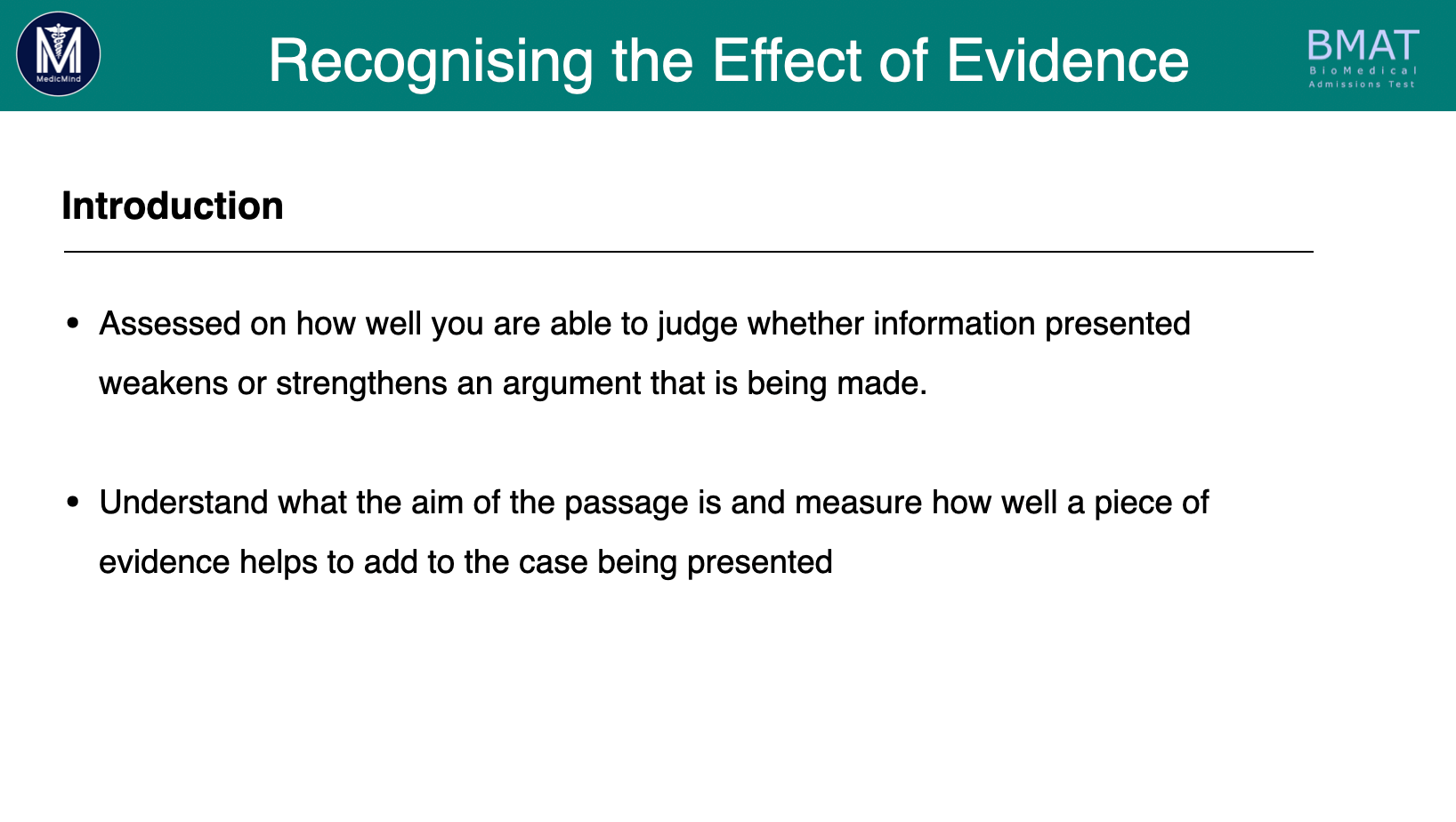
Evidence: Questions
In this BMAT tutorial we put the theory of evidence into practice and allow you to bring in examples of questions you are struggling with too.
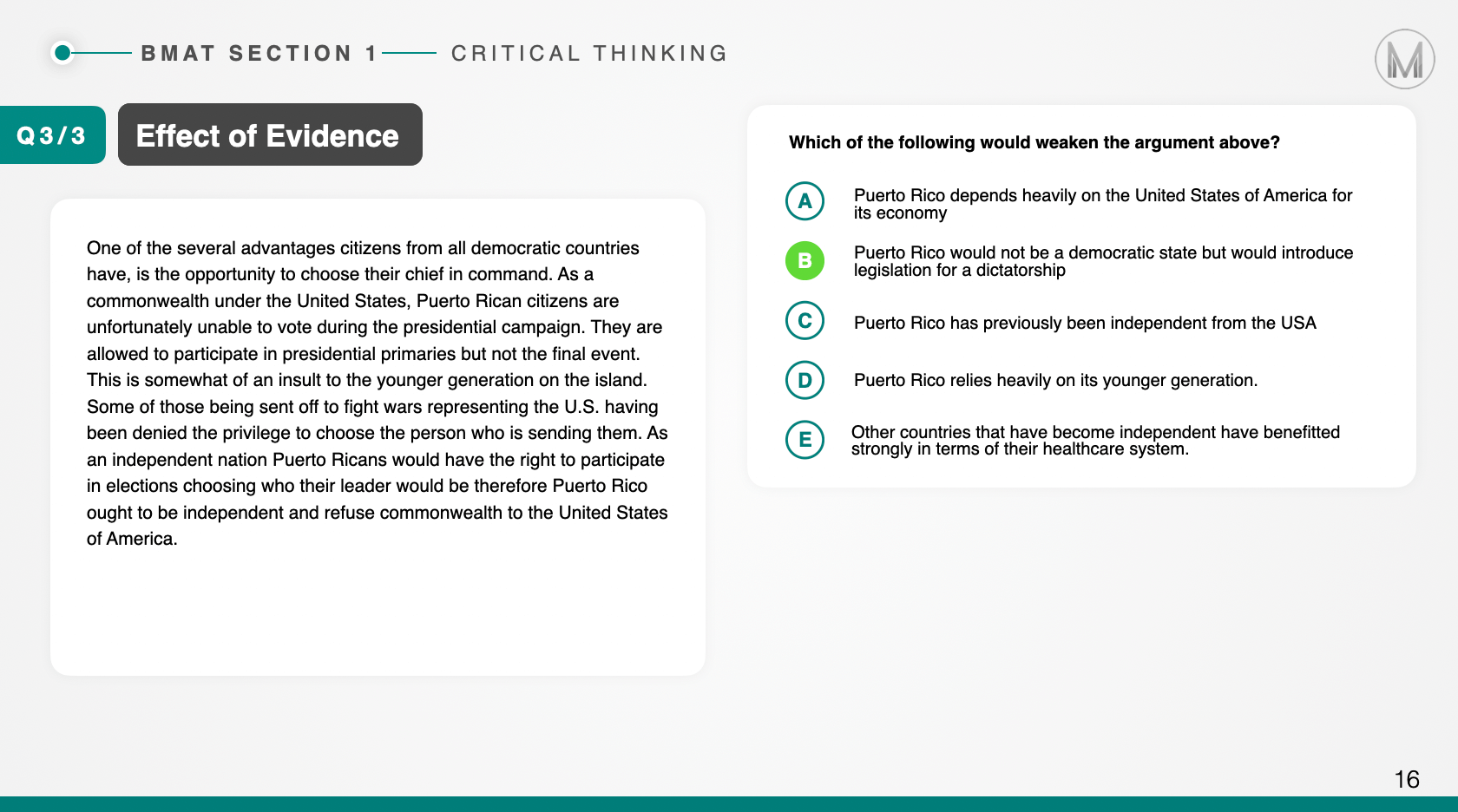
Inferences: Theory
In this tutorial, we teach you how to successfully tackle the more complicated, passages where you have to make inferences rather than extracting info quickly.

Inferences: Questions
Now we will go through BMAT questions that present you with this sort of information and produce a strategy that works for you.
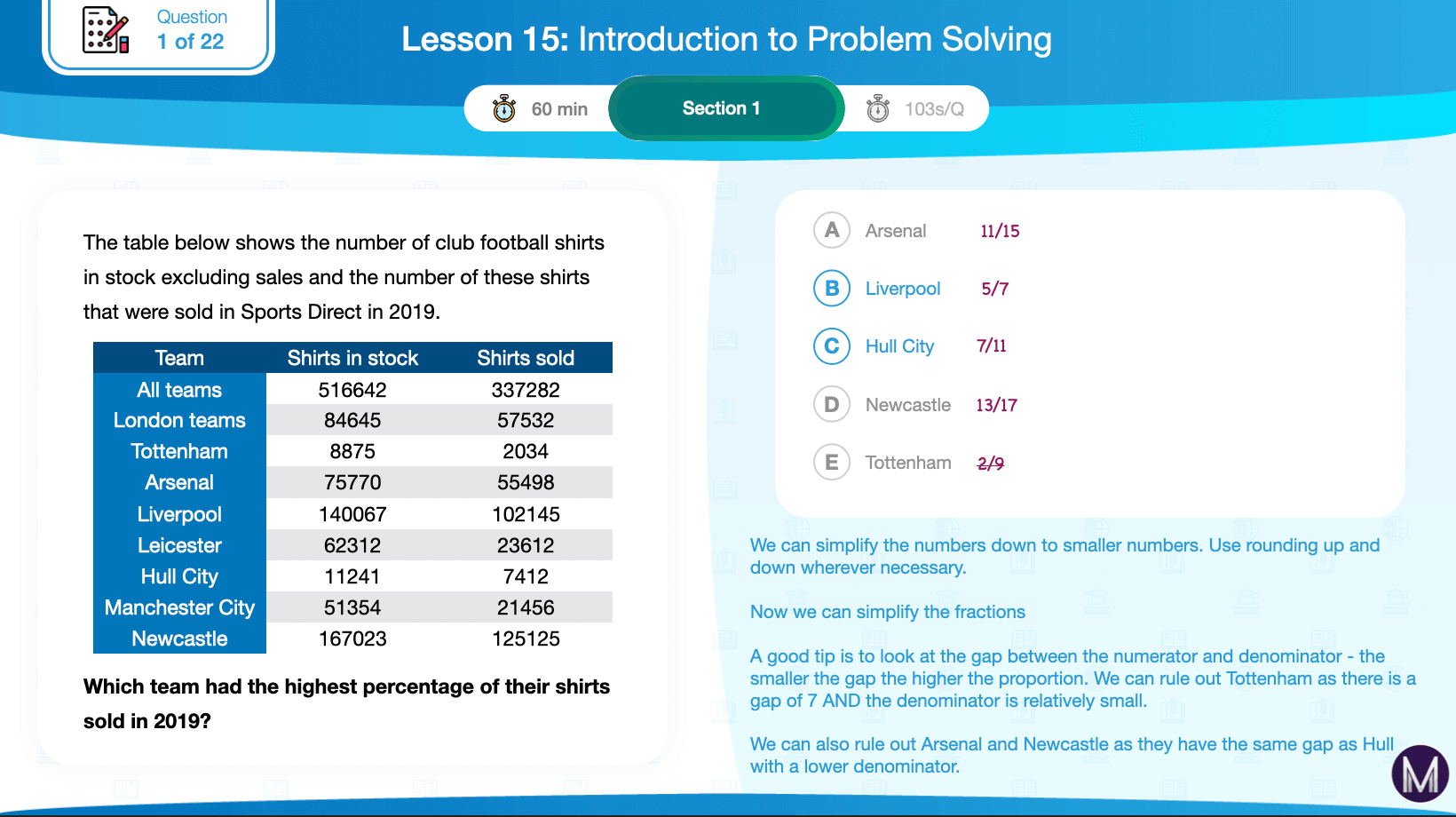
Principles: Theory
We will apply the principles of reasoning and look at how questions around principles come up in the BMAT exam and help you develop effective techniques.
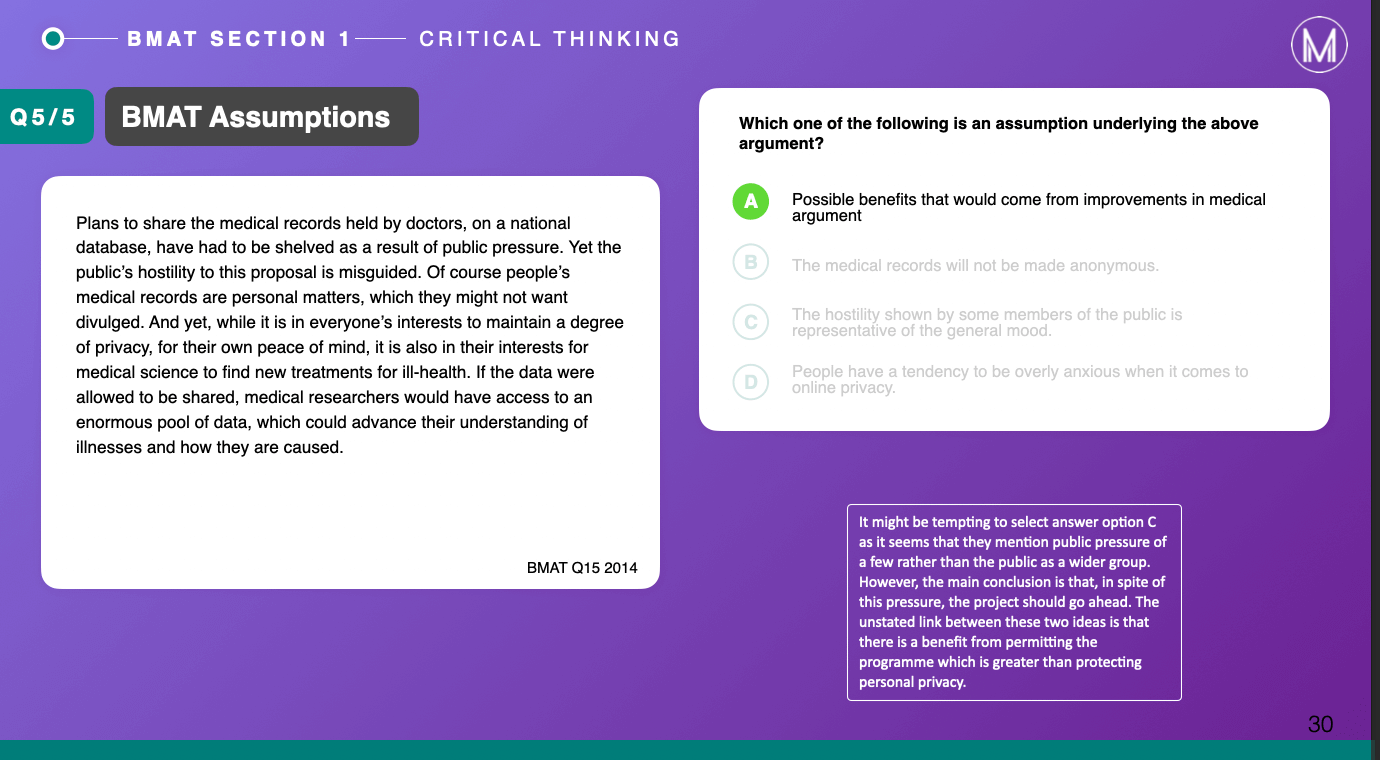
Principles: Questions
You should be getting into the swing of things by now! Tackle the hardest BMAT questions you could get to make you confident for test day.
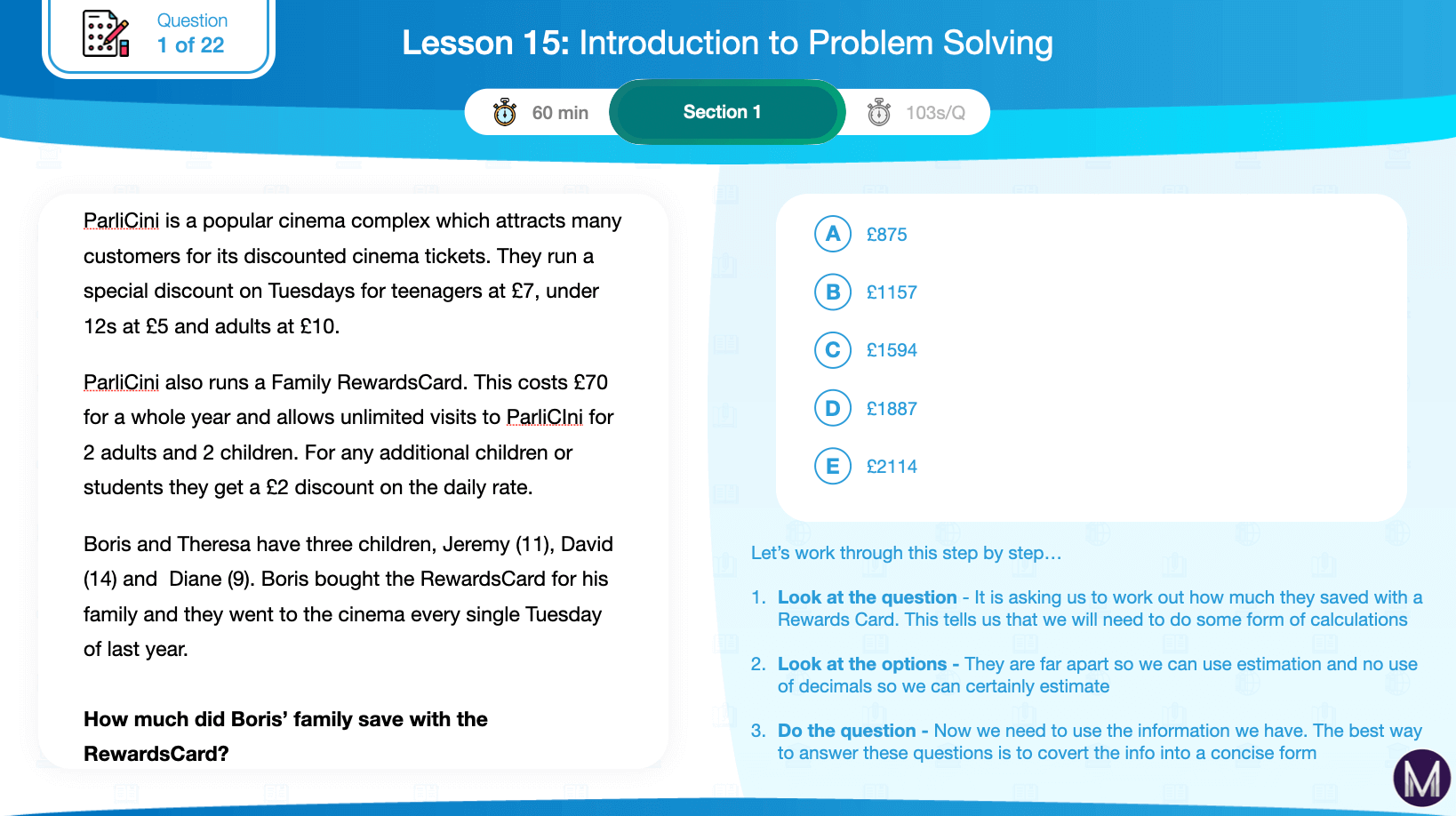
Parallels: Theory
We have compiled every parallels question that has come up and we can use this to our advantage in tackling these question types for BMAT!

Parallels: Questions
We will apply this theory through Section 1 BMAT questions which we will cover together with you and help you advance further.
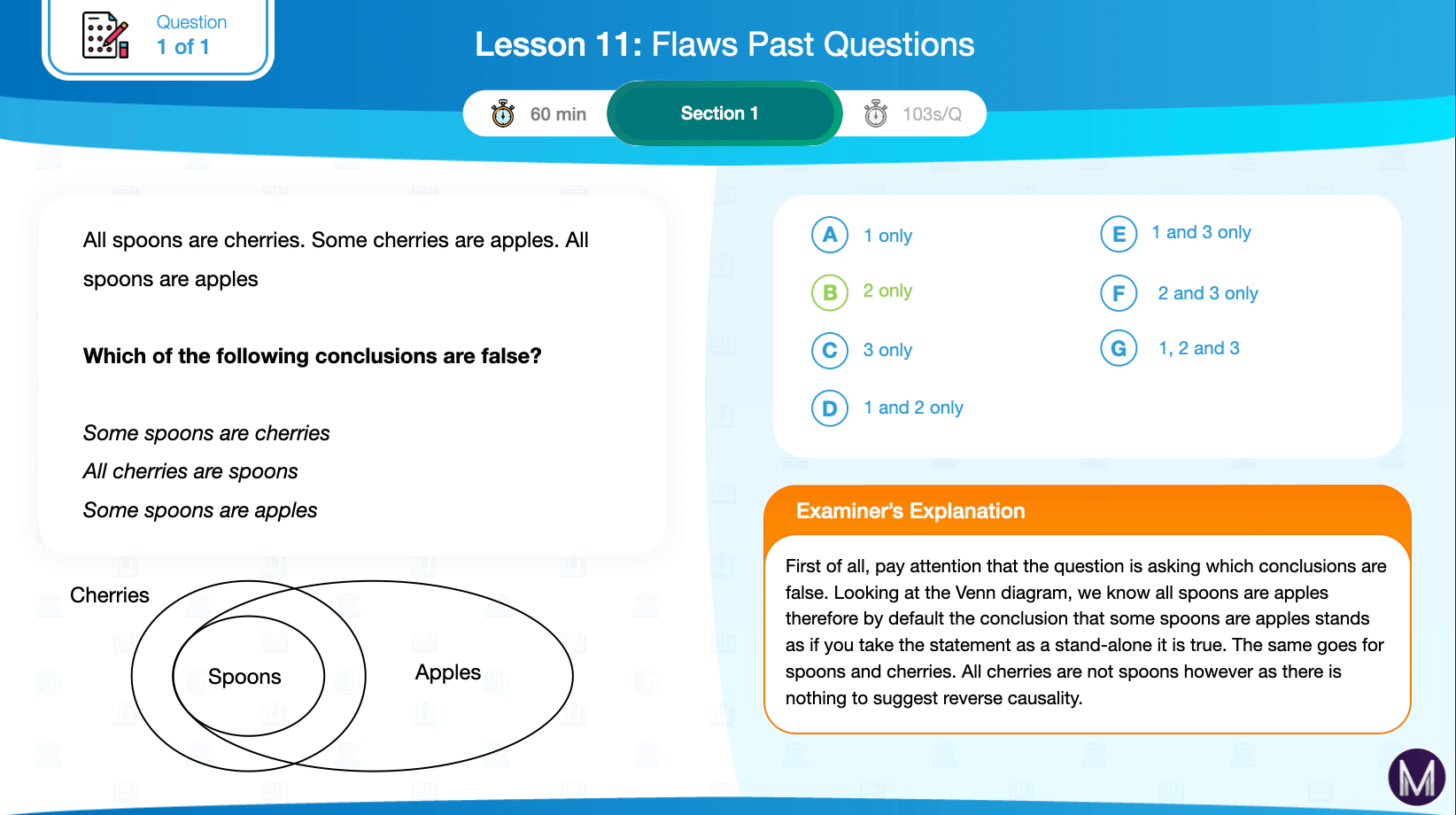
S1: Problem Solving
We approach Problem Solving by systematically working through the various question types you can expect to face in the exam and teach you shortcuts to save you time.
- Lesson 2 Date & Time: Theory
- Lesson 3 Date & Time: Examples
- Lesson 4 Pin Codes: Theory
- Lesson 5 Pin Codes: Questions
- Lesson 6 Speed + Distance: Theory
- Lesson 7 Speed + Distance: Qs
- Lesson 8 Tabular Data: Theory
- Lesson 9 Tabular Data: Questions
- Lesson 10 Mathematical Qs
- Lesson 11 Mathematical Qs
- Lesson 12 Spatial Reasoning I
- Lesson 13 Spatial Reasoning II
- Lesson 14 Cubes: Theory
- Lesson 15 Cubes: Questions
- Lesson 16 Graphical Data: Theory
- Lesson 17 Graphical Data Qs
- Lesson 18 Data Analysis: Theory
- Lesson 19 Data Analysis: Questions
Here will introduce what problem solving question types are most common and look at trends in question types over the past 5 years and beyond.
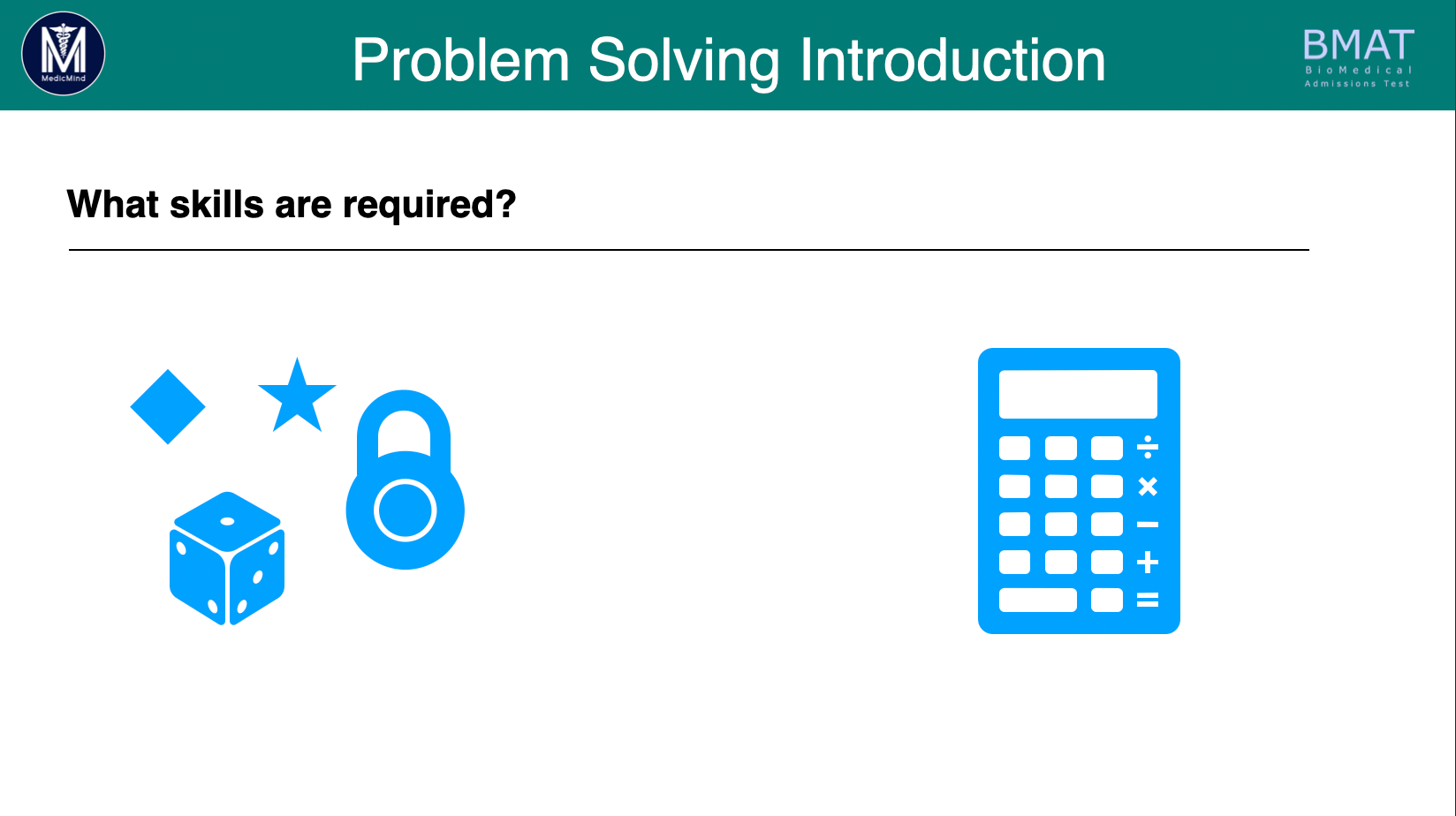
Date & Time: Theory
Date and Time questions involve you knowing how many minutes there are in a year, seconds in a week and more! We help you memorise the important information making your life a lot easier.
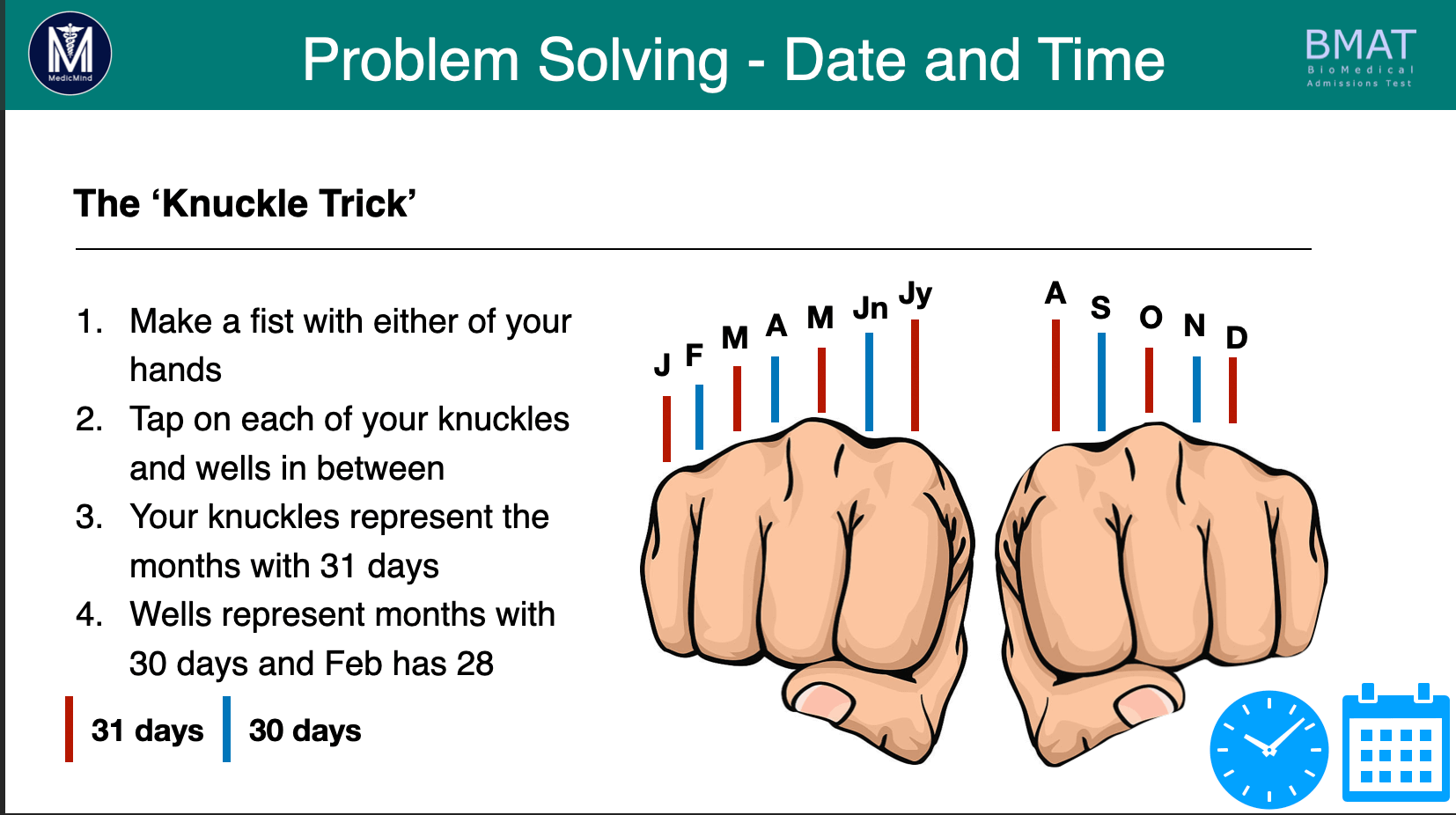
Date & Time: Examples
We will put the theory from this section into practice by doing interactive questions together and give you a walkthrough so you are prepared.
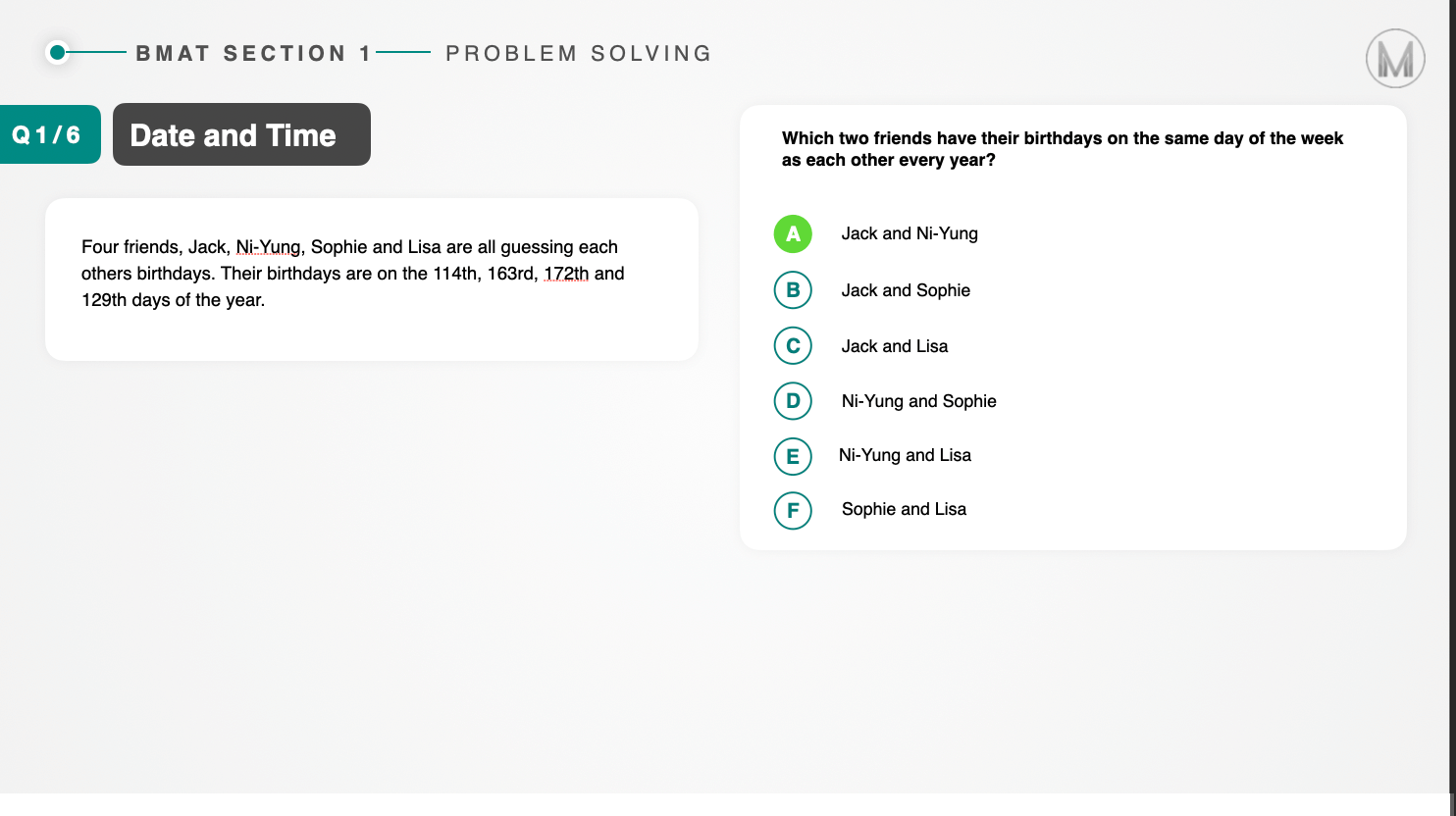
Pin Codes: Theory
These come up every year! We’ll show you hidden secrets that help you do well in Section 1 Problem Solving questions and become Sherlock Holmes in disguise!
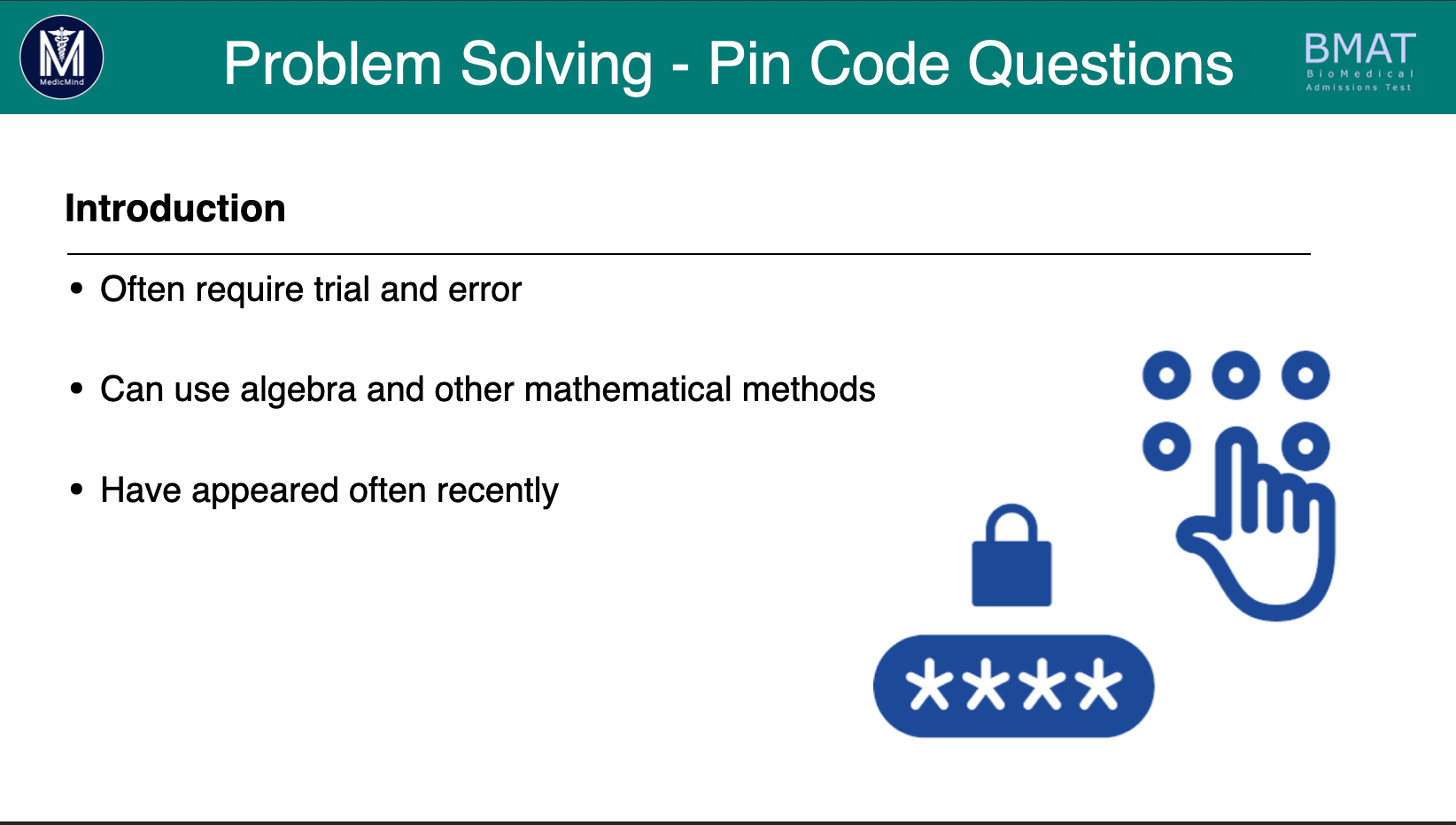
Pin Codes: Questions
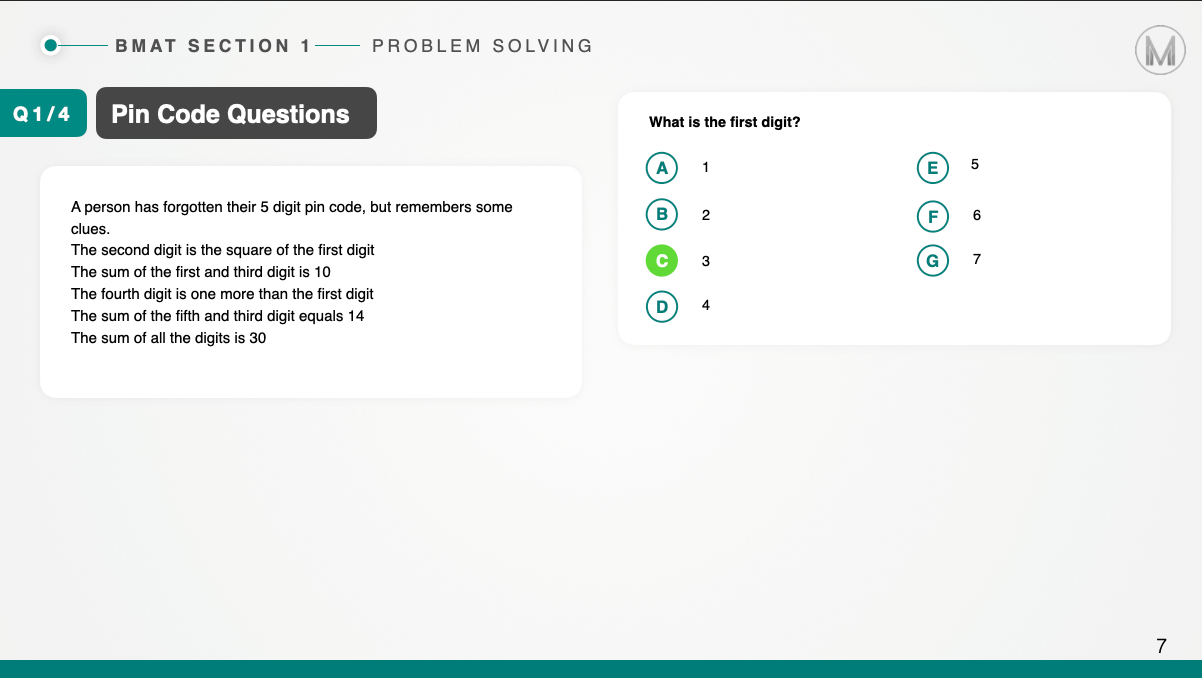
Speed + Distance: Theory
Speed, Distance & Time is an important part of the exam to test your mathematical nous. We help you understand how to convert units and answer questions.
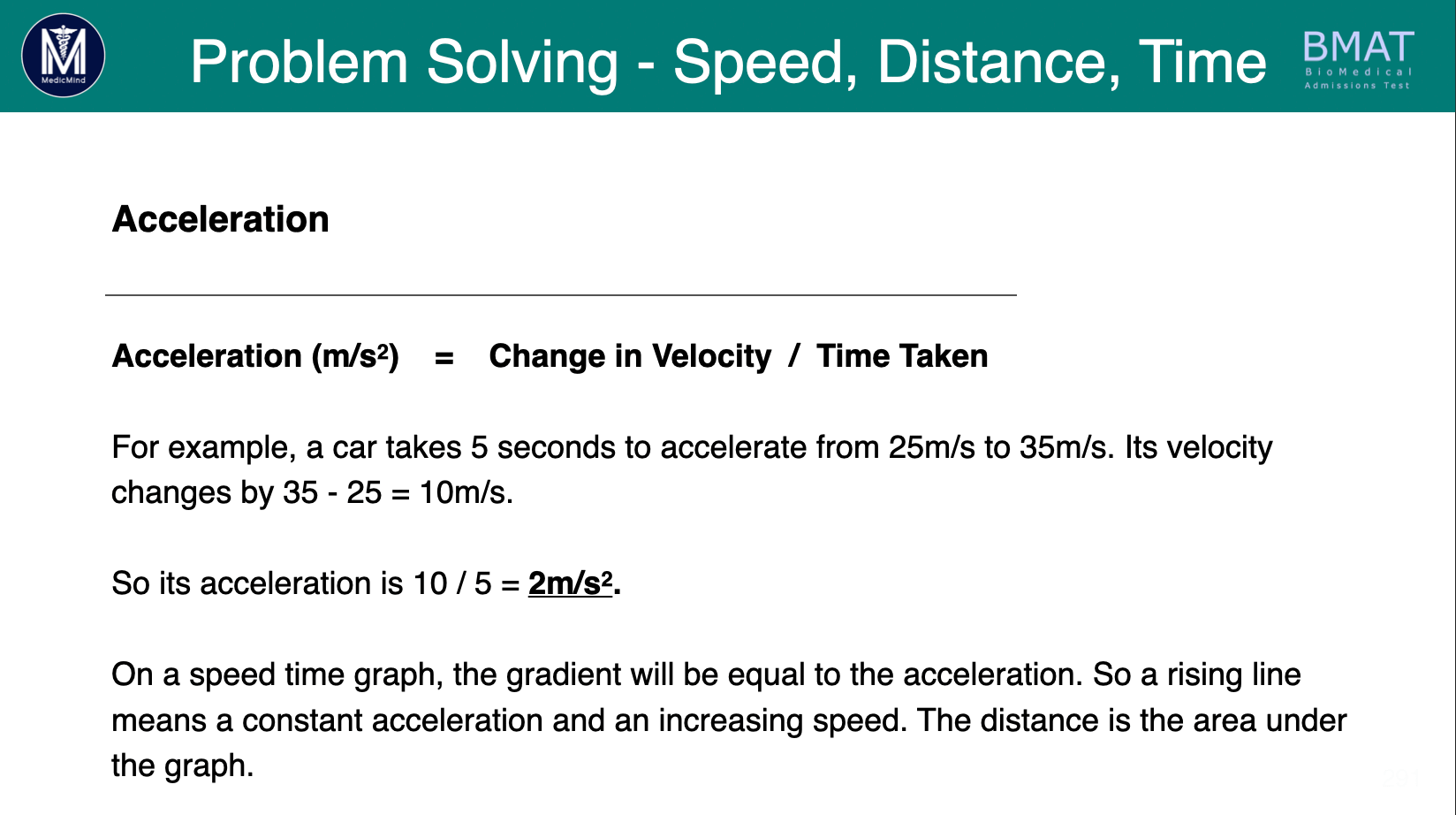
Speed + Distance: Qs
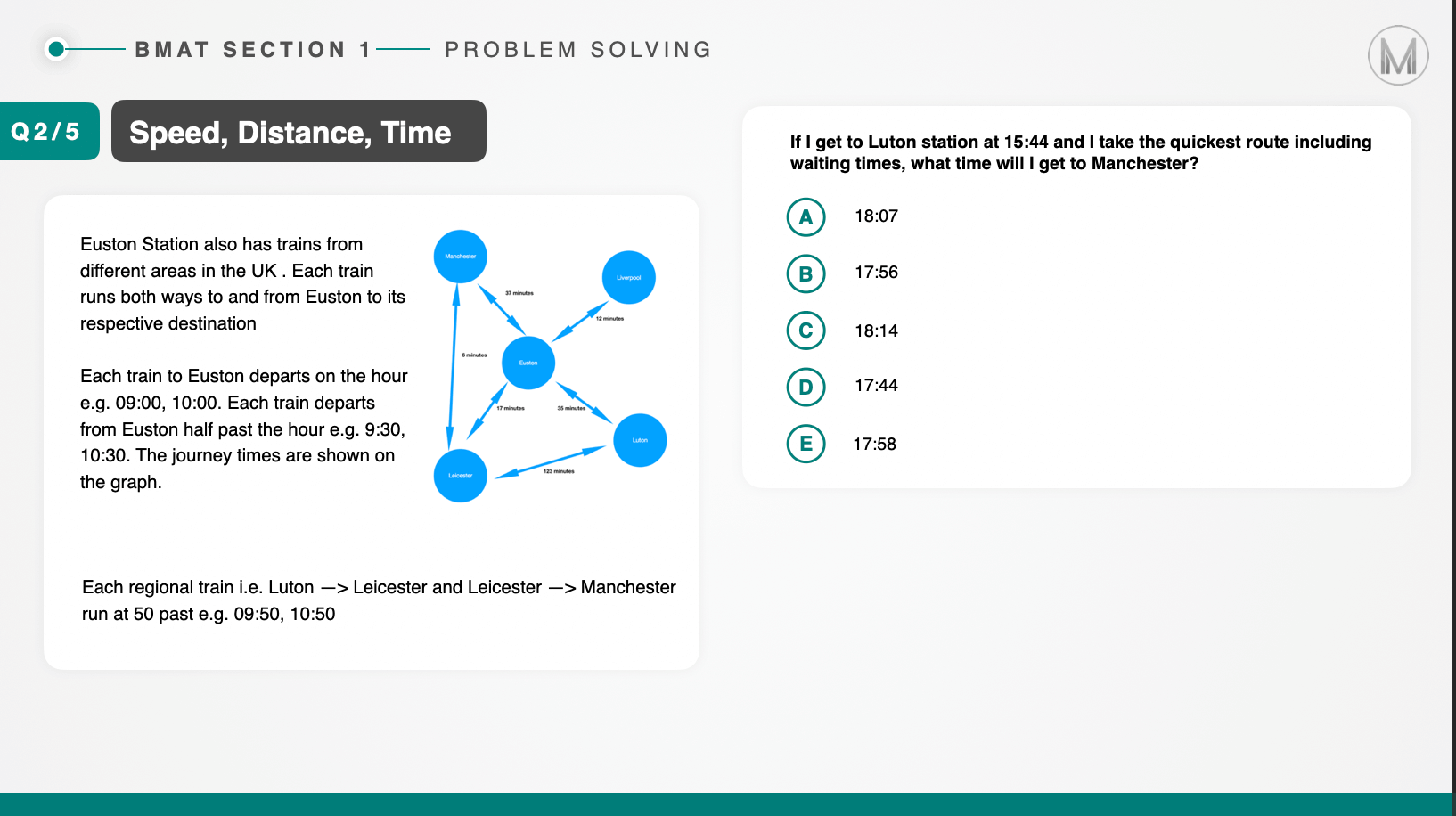
Tabular Data: Theory
BMAT questions often present you with data in confusing tables so we strategise and allow you to see common pitfalls students face.
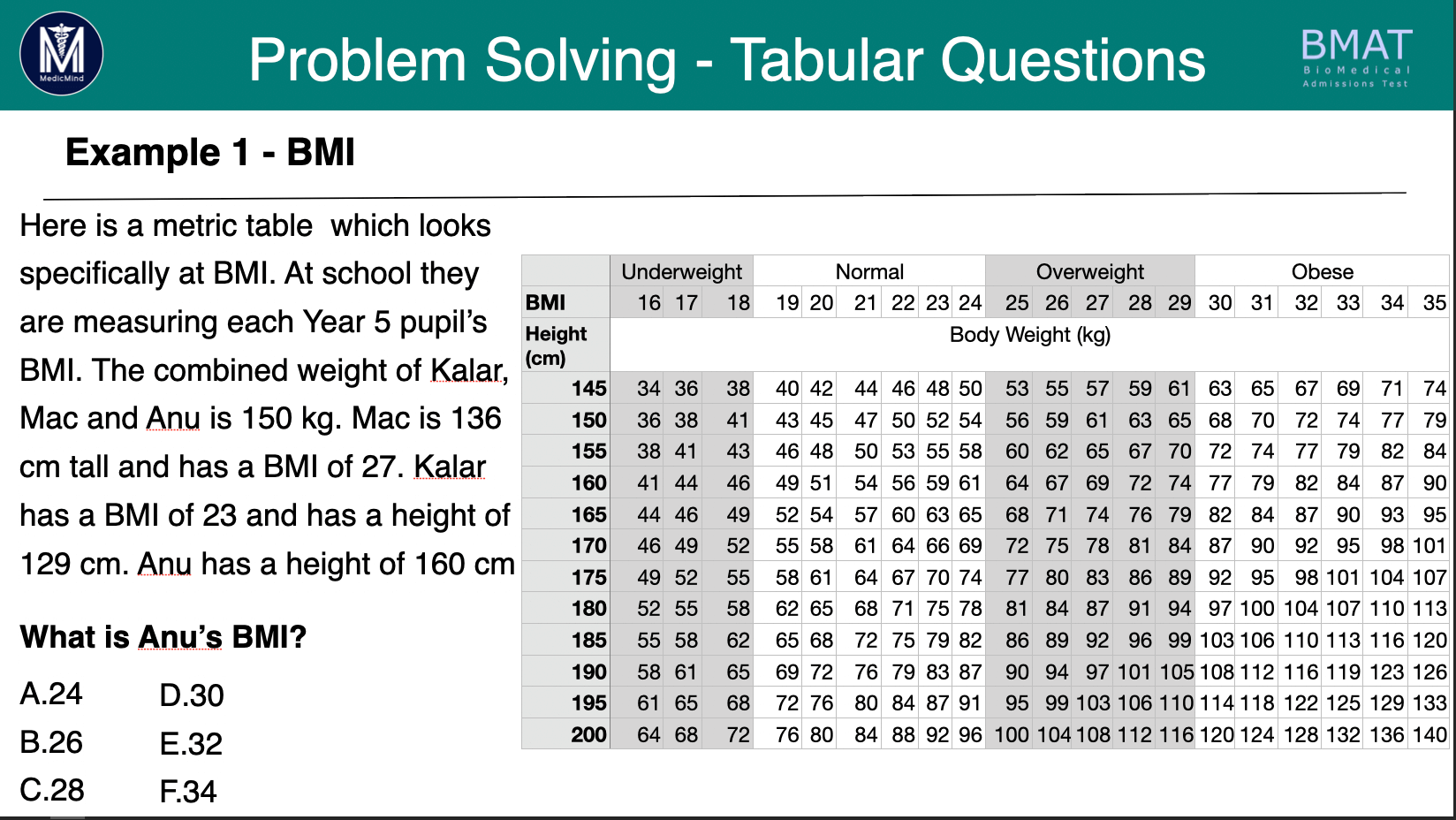
Tabular Data: Questions
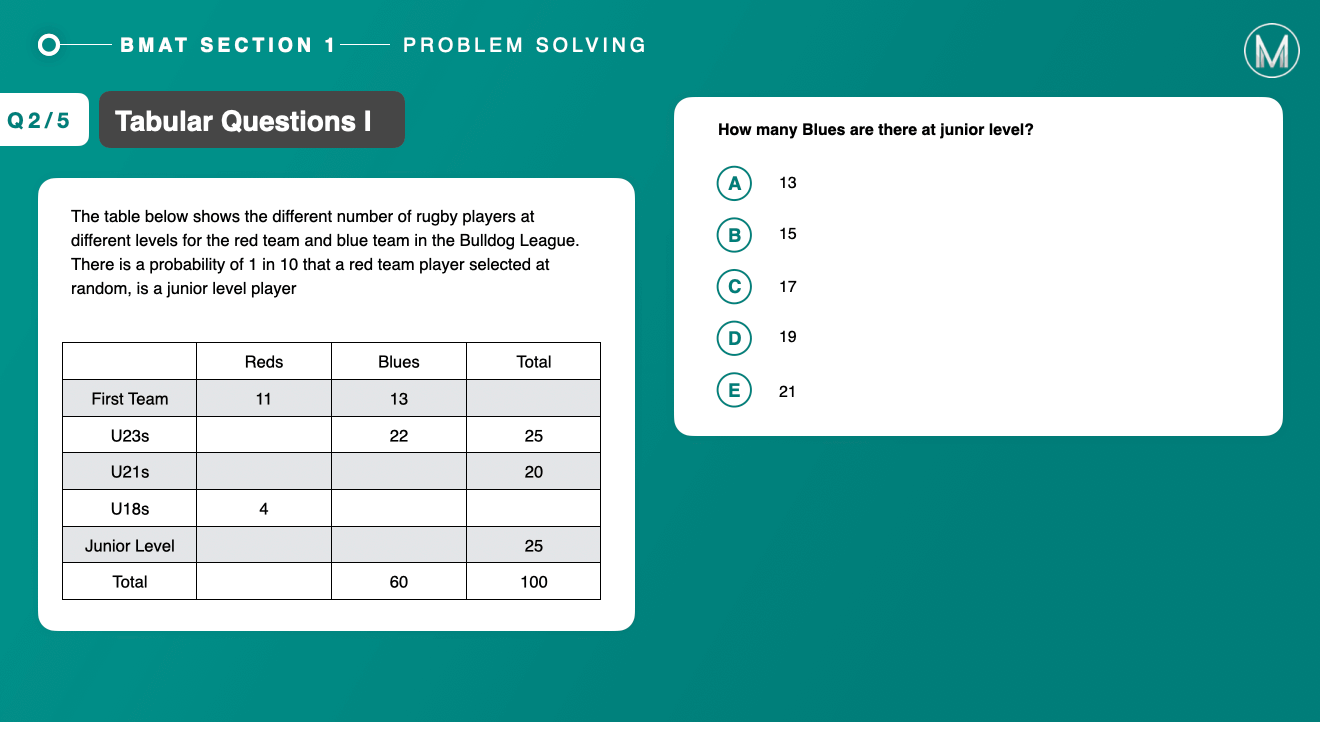
Mathematical Qs
We brush up on your mathematical reasoning and help you work out how to answer these questions by condensing the information down into an understandable format.
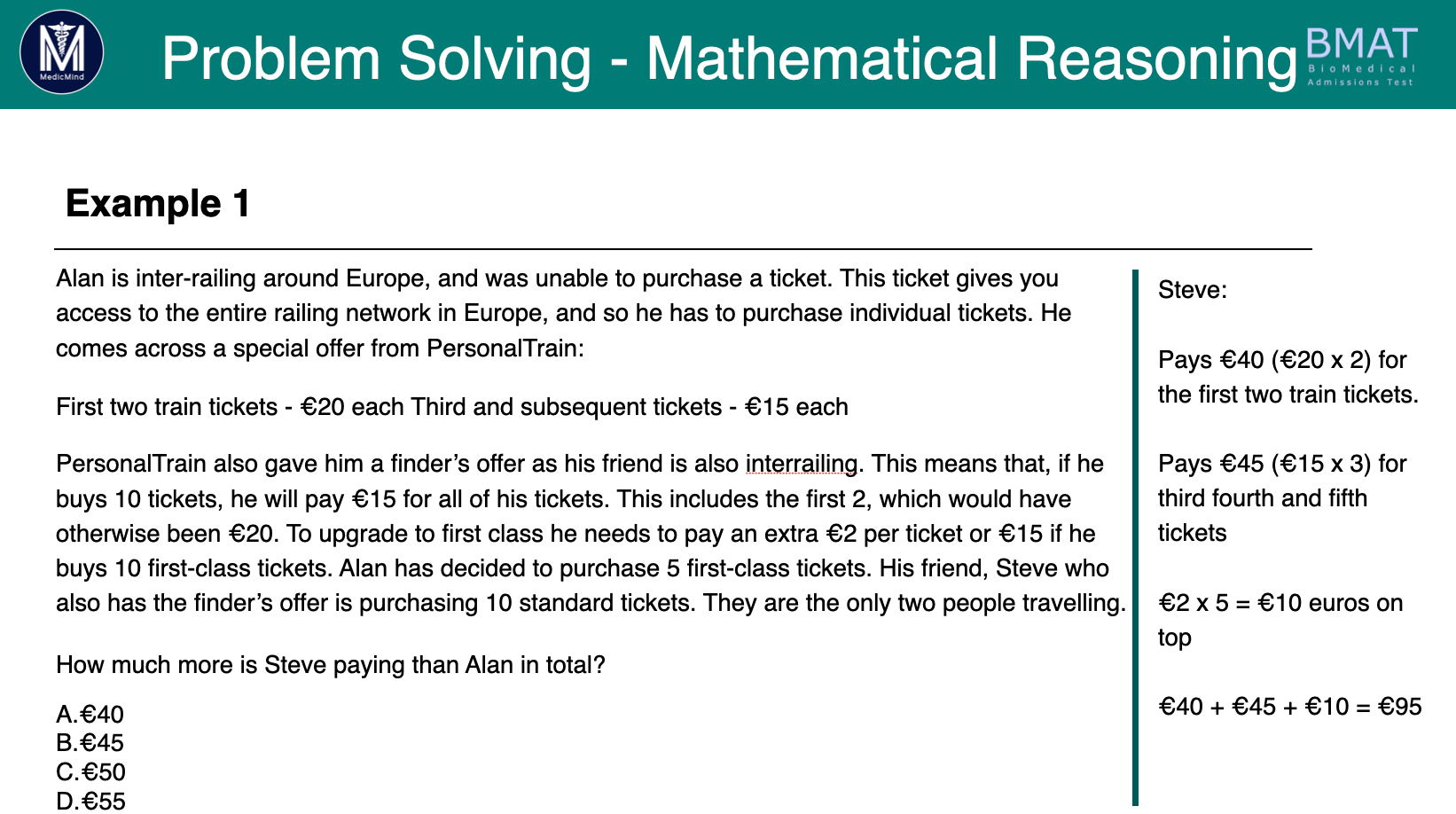
In this BMAT tutorial we put the theory of mathematical reasoning into practice and allow you to bring in examples of questions you are struggling with too.
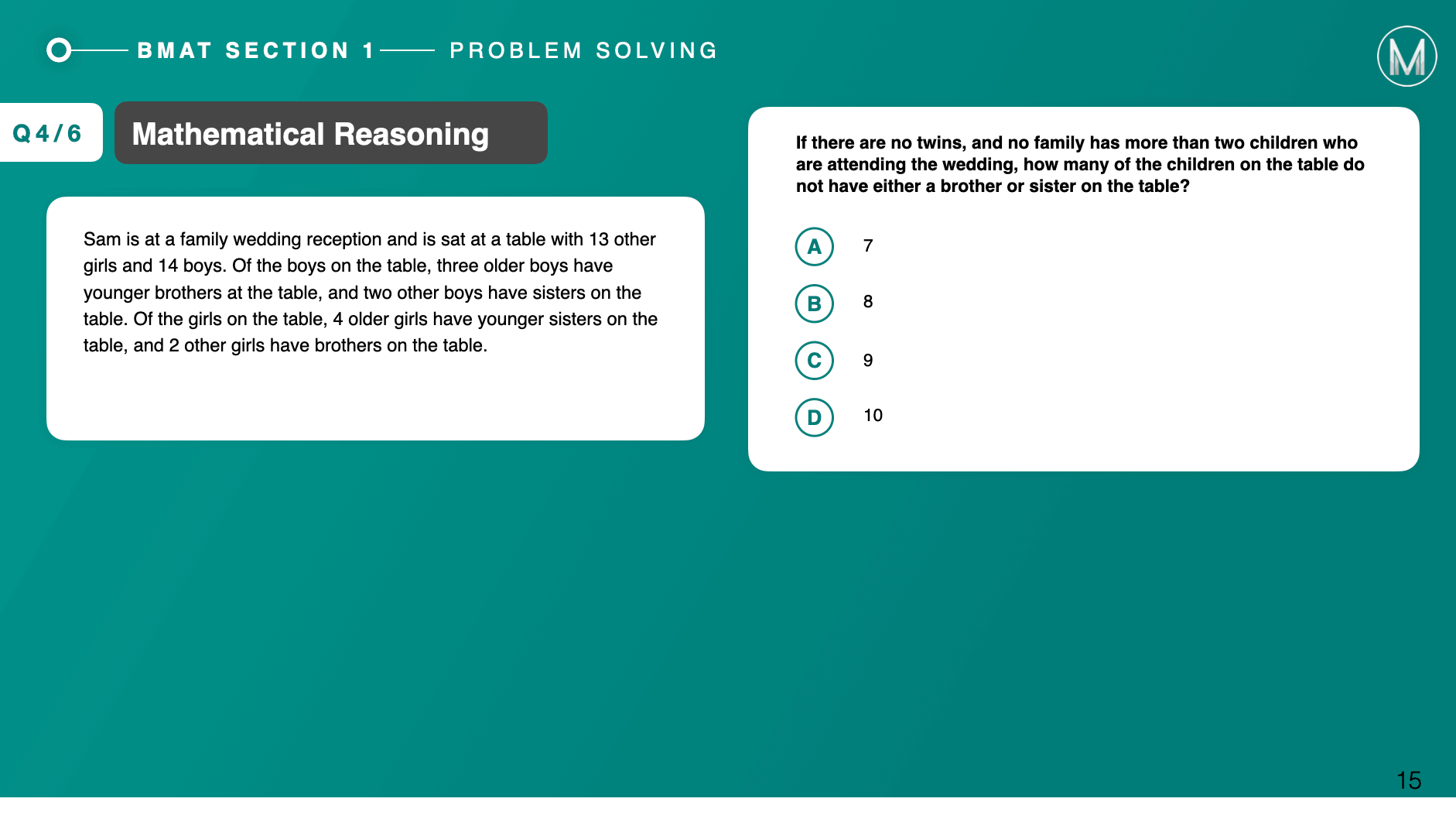
Spatial Reasoning I
Spatial Reasoning is almost guaranteed to come up in BMAT! We teach you a unique, super fast method for questions involving both 2-D and 3-D shapes
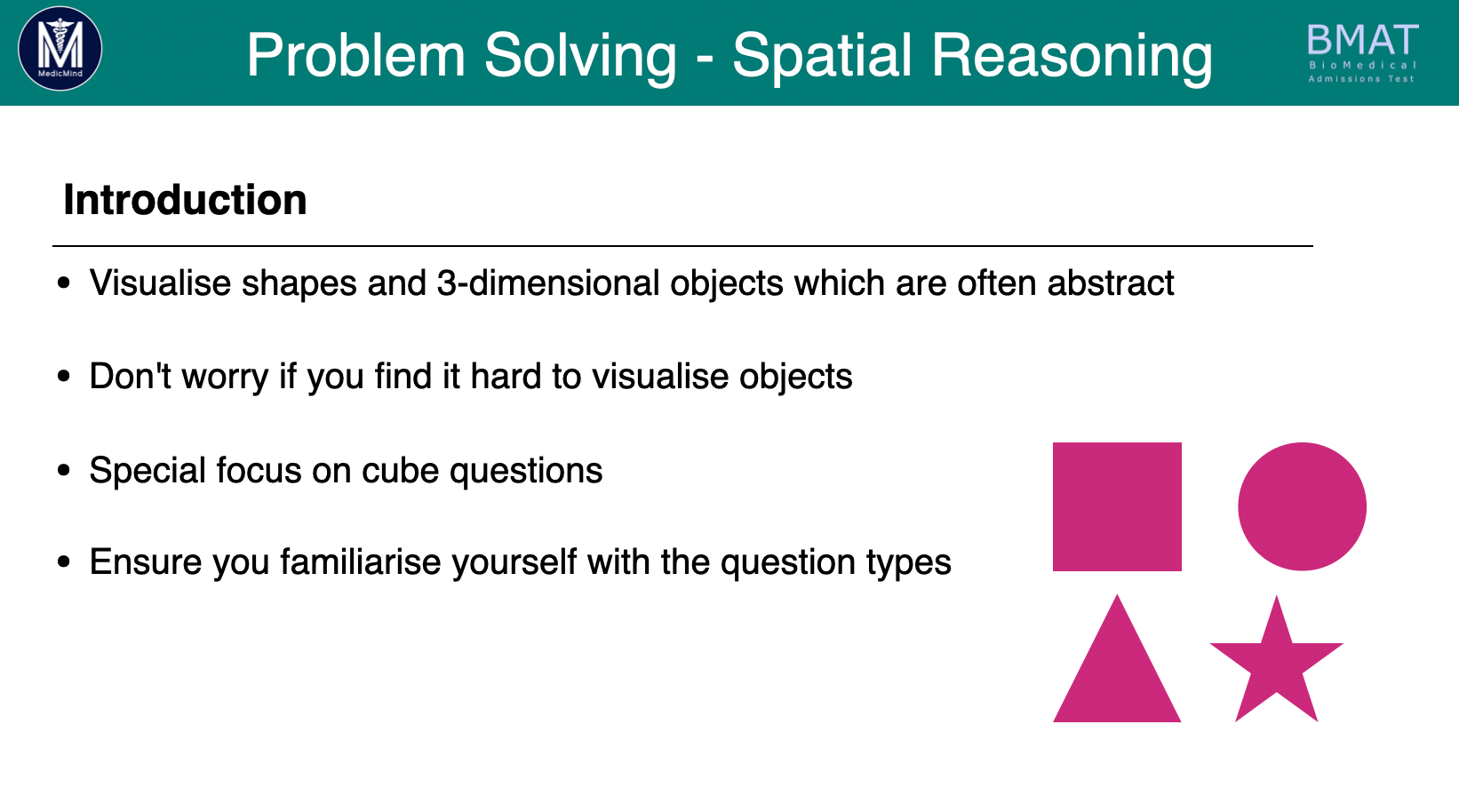
Spatial Reasoning II
You will then apply the knowledge gained from the previous tutorial and become confident in knowing how to approach spatial reasoning questions.
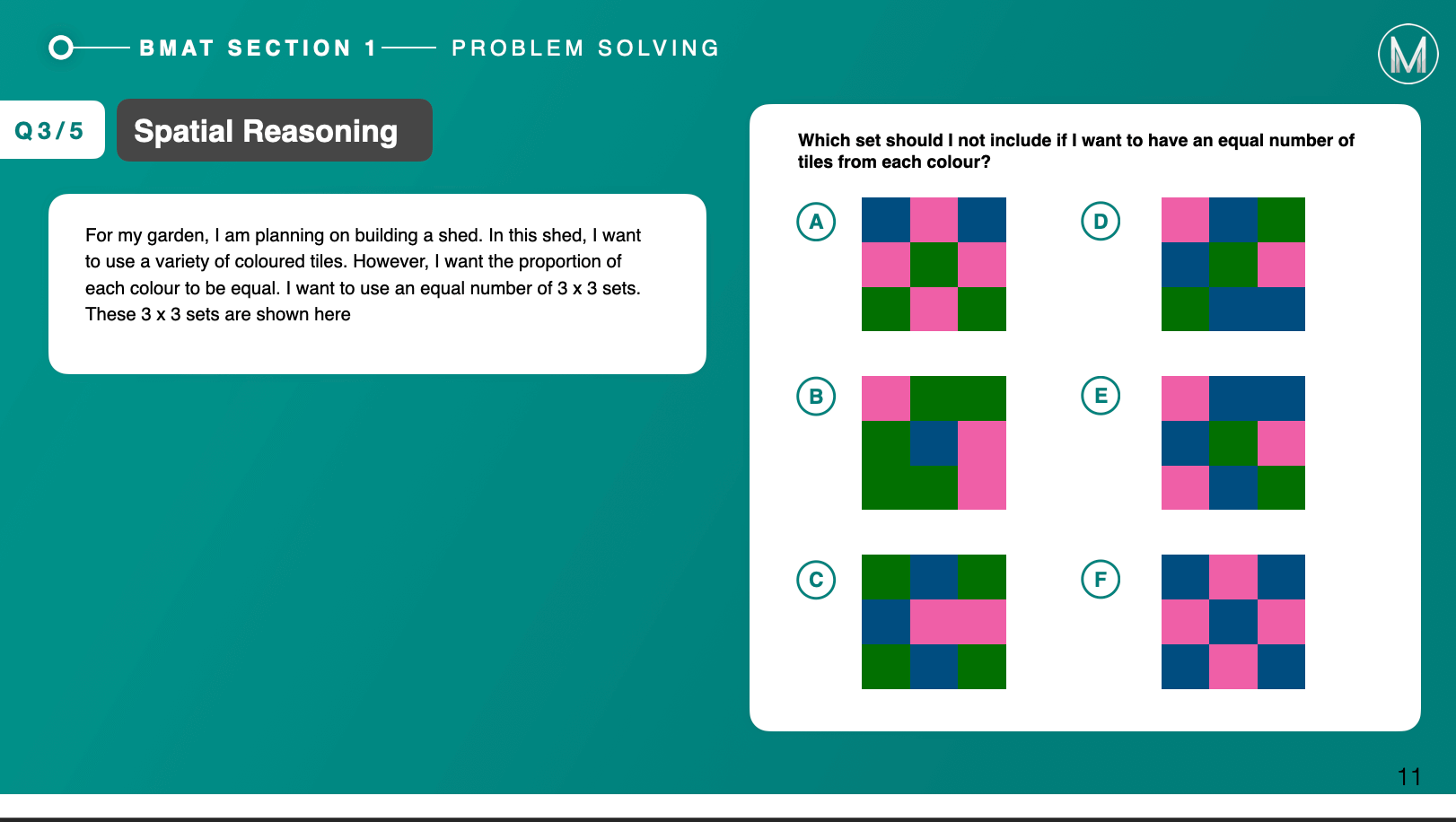
Cubes: Theory
Here we will introduce one of our most effective Problem Solving Resoning techniques – answering cube questions. We’ll discuss shortcuts if you struggle to visualise information as many do!
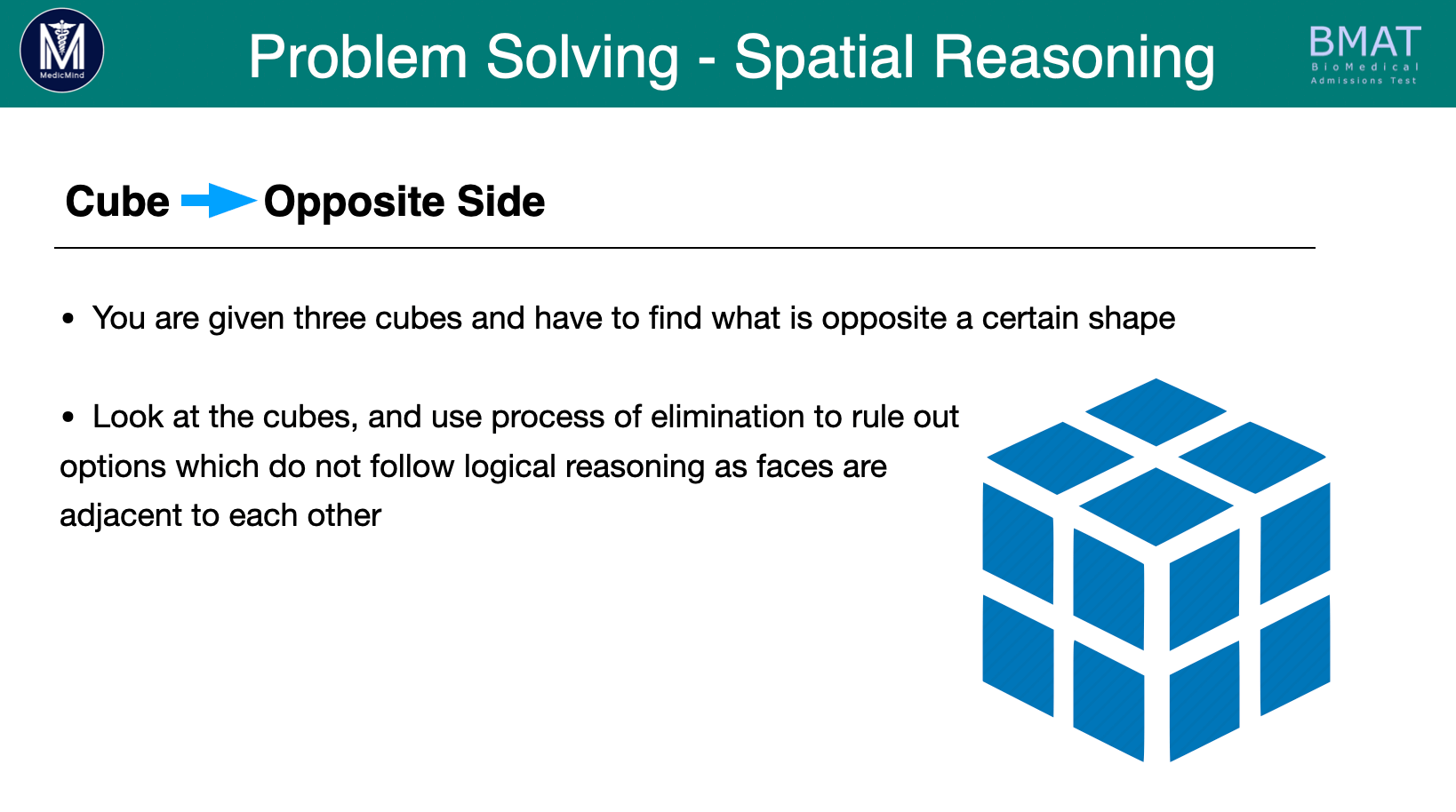
Cubes: Questions
To make sure you’re 100% confident, we’ll test you on a few questions to ensure you’ve fully grasped the content we have taught you.
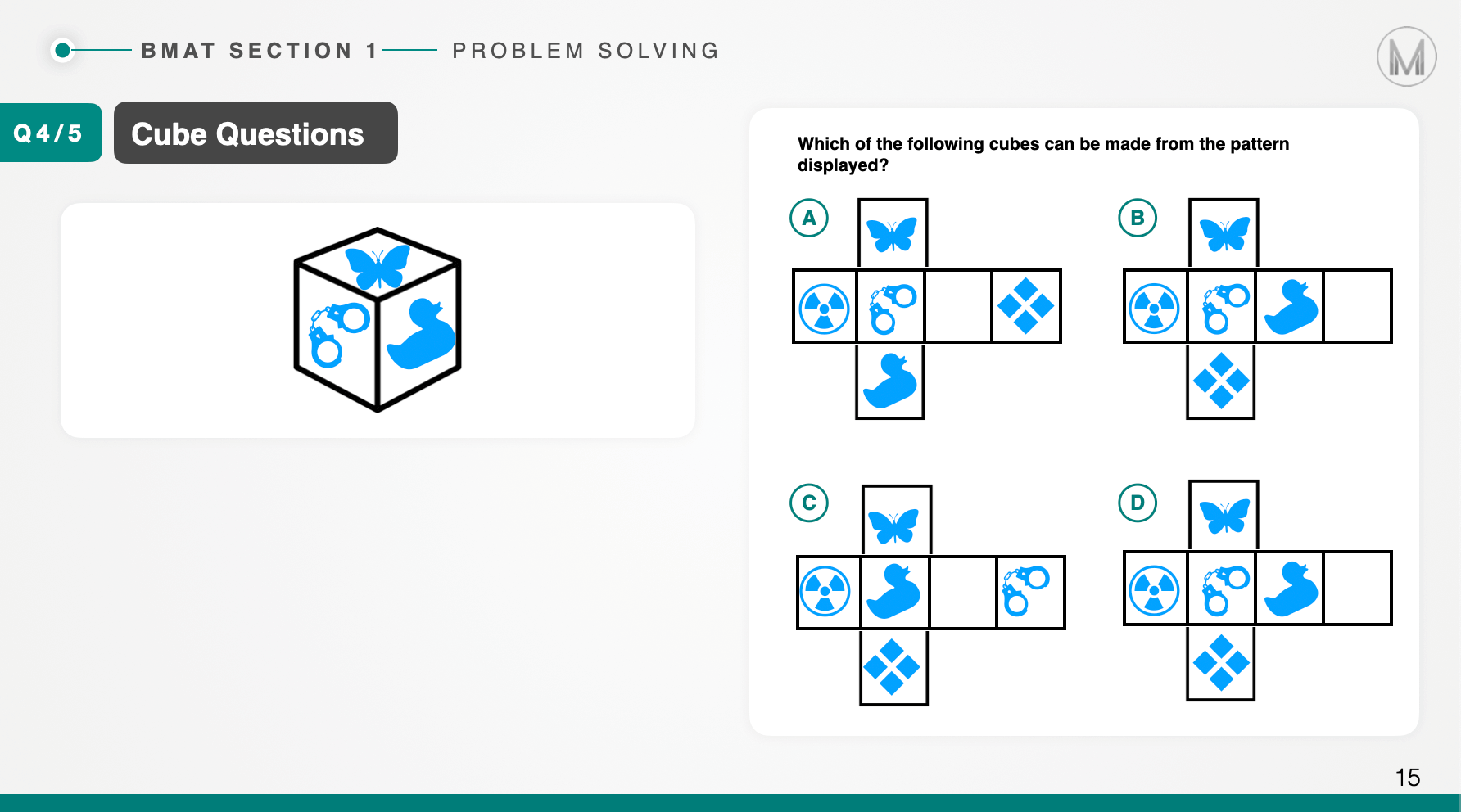
Graphical Data: Theory
It’s easy to forget the basics of graphical data that is presented and while it is hard to prepare for all of these questions, we teach you a method you can apply to all of these BMAT questions.

Graphical Data Qs
Hopefully by now you have understood the theory and we will apply it to see if you can show us that you have! If you are struggling, we will delve deeper and go into theory more.
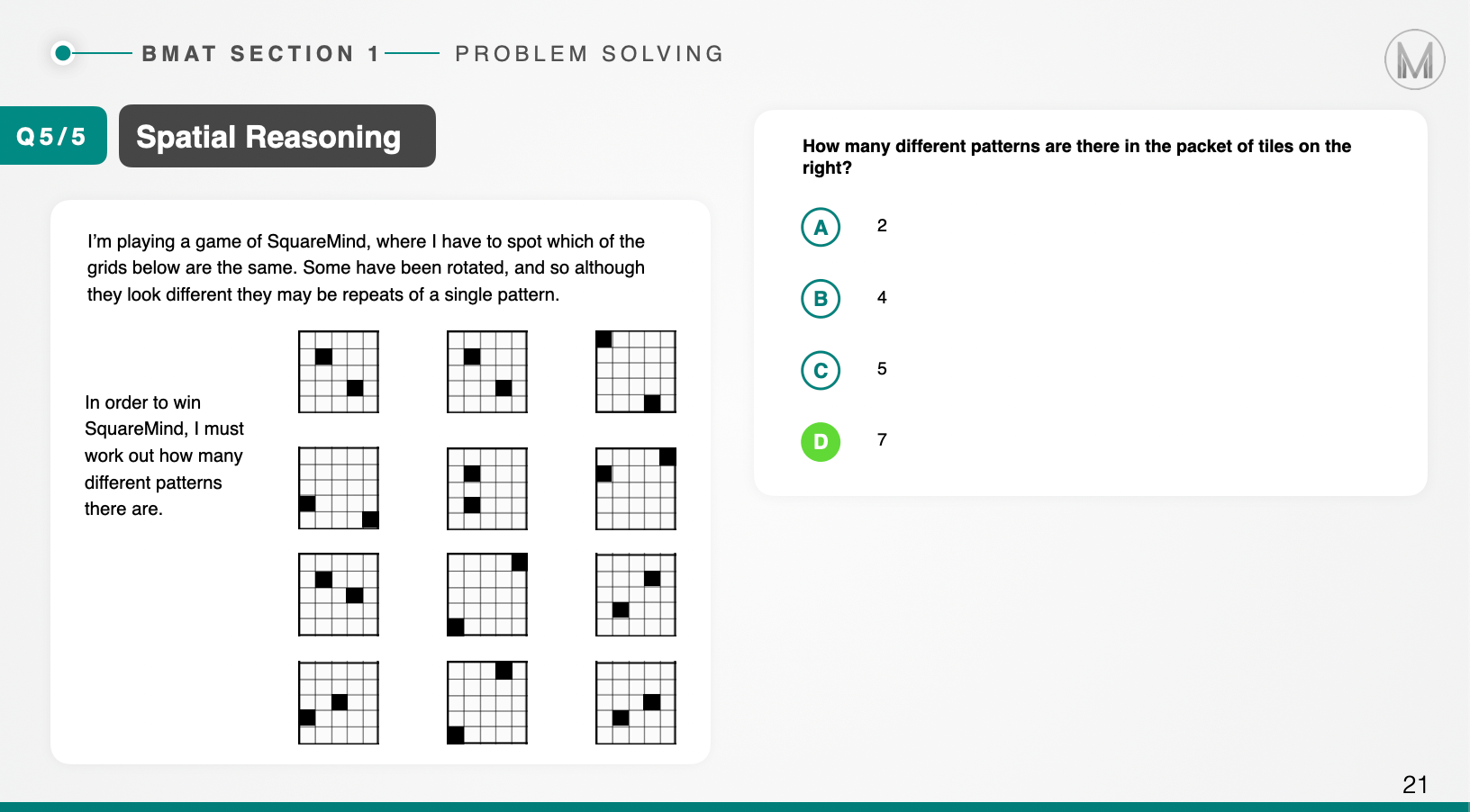
Data Analysis: Theory
Coming to the end of this section now, we will cover the last element of the course which we think is necessary to do well.
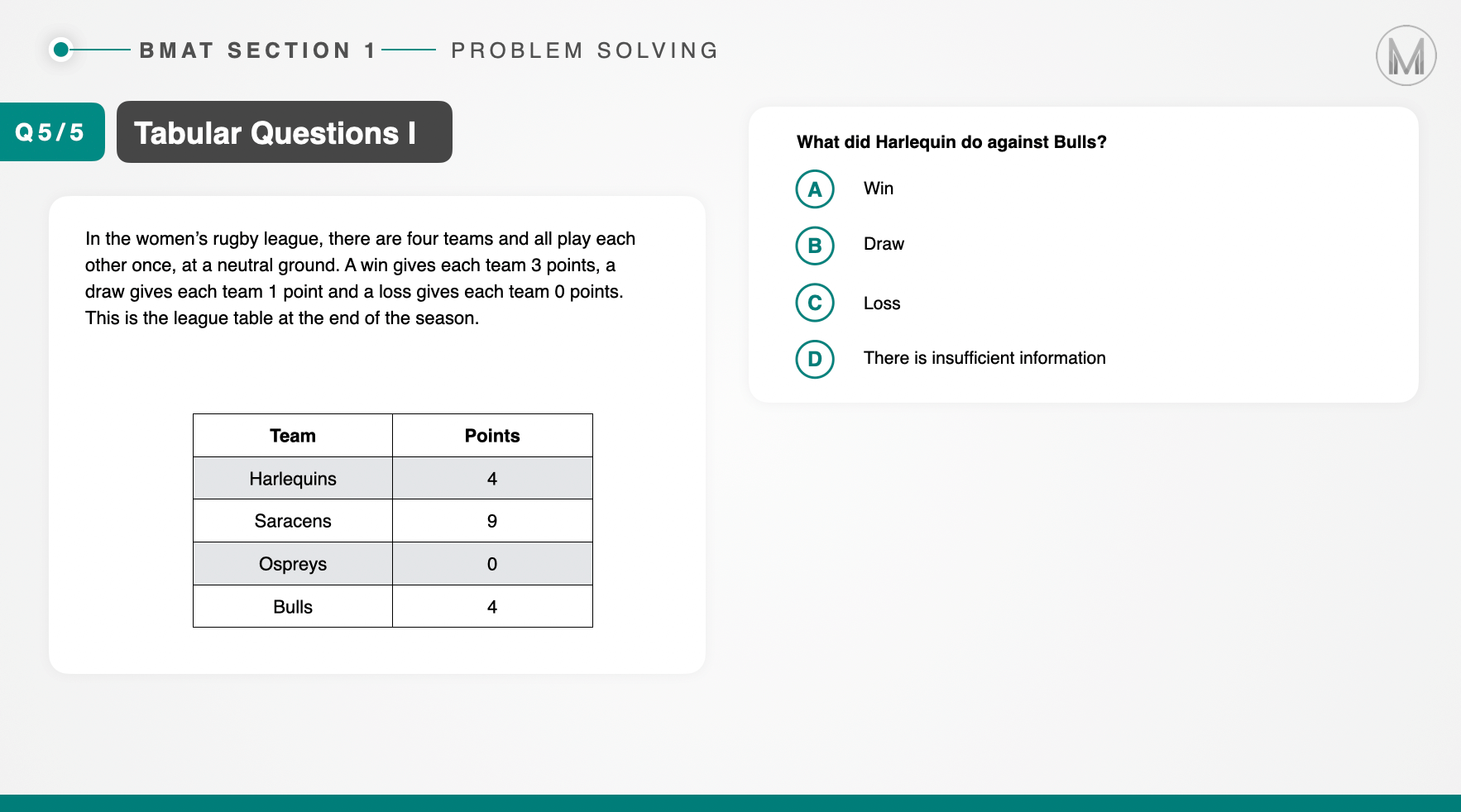
Data Analysis: Questions
The final hurdle to completing BMAT Section 1 Problem Solving! We will apply the techniques with interactive questions and real past paper question compilations.
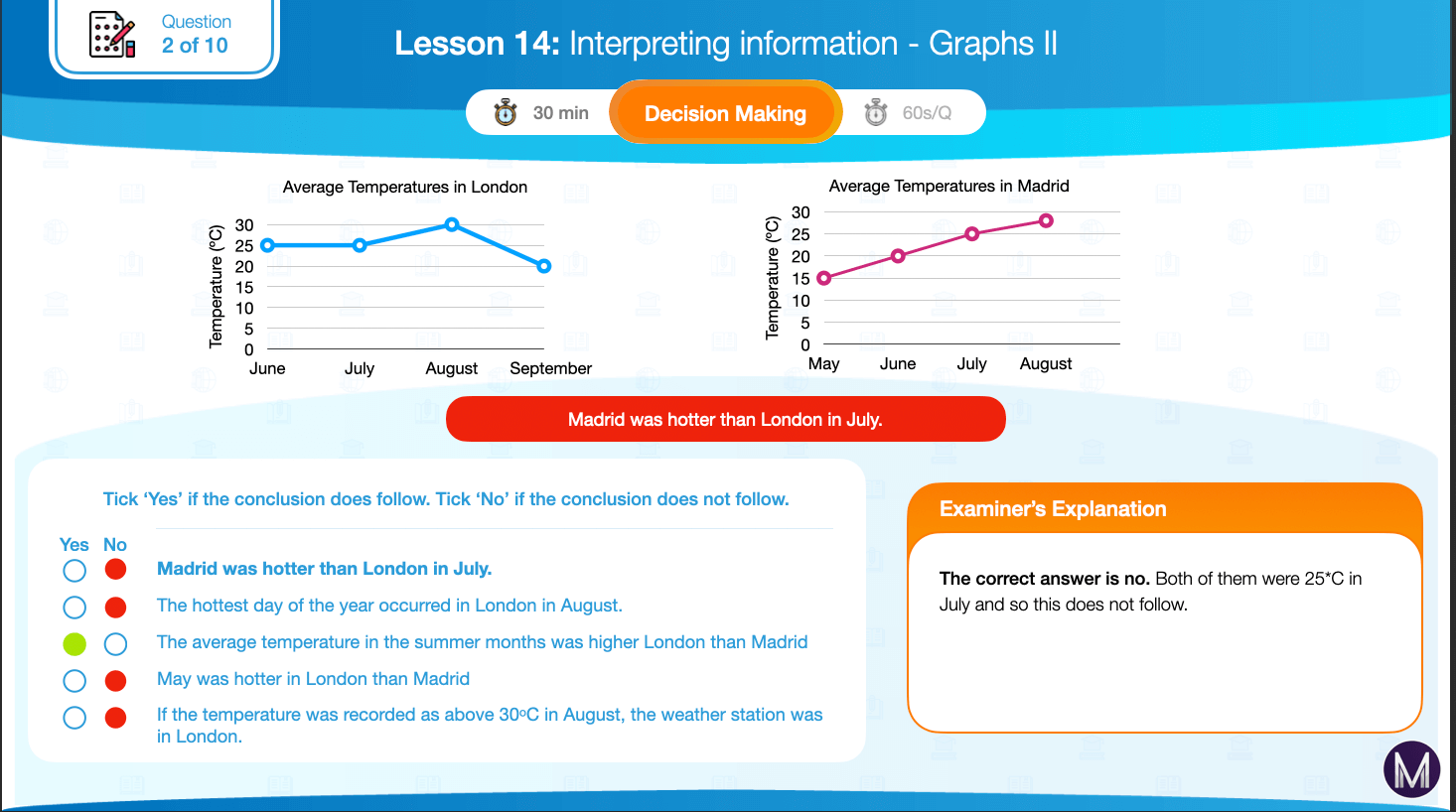
S2: Biology + Chemistry
We’ve broken down Section 2 into the most commonly tested topics as well as giving you a refresher of the topics you’re least familiar with like GCSE Physics! Our statistical analysis will aid your revision plan and help you achieve above 7 in S2!
- Lesson 1 Inheritance & Genes
- Lesson 2 Homeostasis
- Lesson 3 Digestion
- Lesson 4 Respiration
- Lesson 5 Nervous System
- Lesson 6 Natural Selection
- Lesson 7 Genetic Engineering
- Lesson 8 Cell Structure
- Lesson 9 Cell Division
- Lesson 10 Heart and Circulation
- Lesson 11 Atomic Structure
- Lesson 12 Calculations I
- Lesson 13 Calculations II
- Lesson 14 Calculations: % Yield
- Lesson 15 Structure and Bonding
- Lesson 16 Balancing Equations
- Lesson 17 Separation Techniques
Inheritance & Genes
There have been 14 BMAT Past Paper Questions on Inheritance. It is the most commonly tested topic, so we will discuss inheritance maps, genes, alleles, DNA and more!
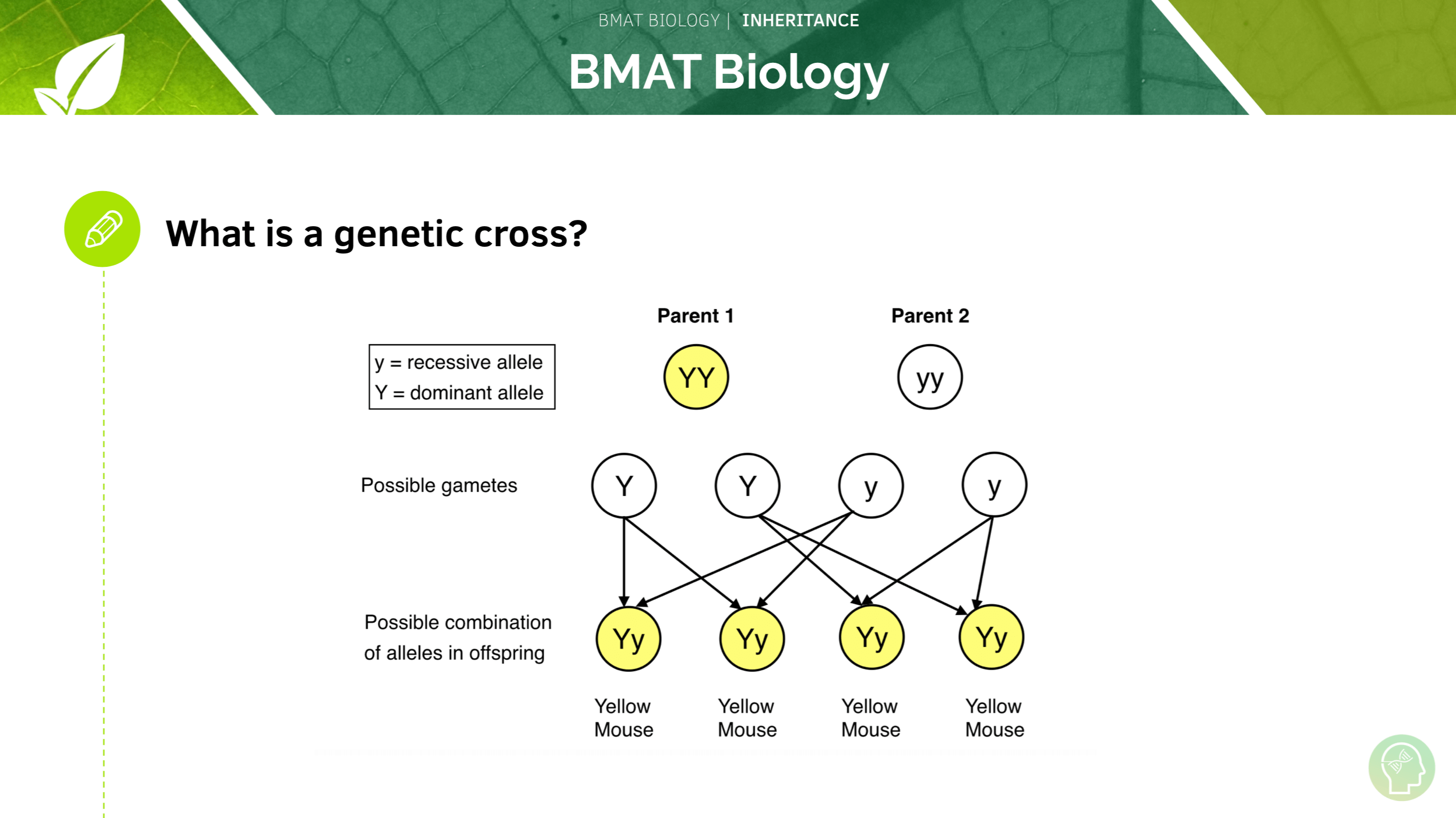
Homeostasis
There have been 13 BMAT Past Paper Questions on Homeostasis. We will discuss realistic BMAT questions on osmoregulation, thermoregulation, negative feedback and more.
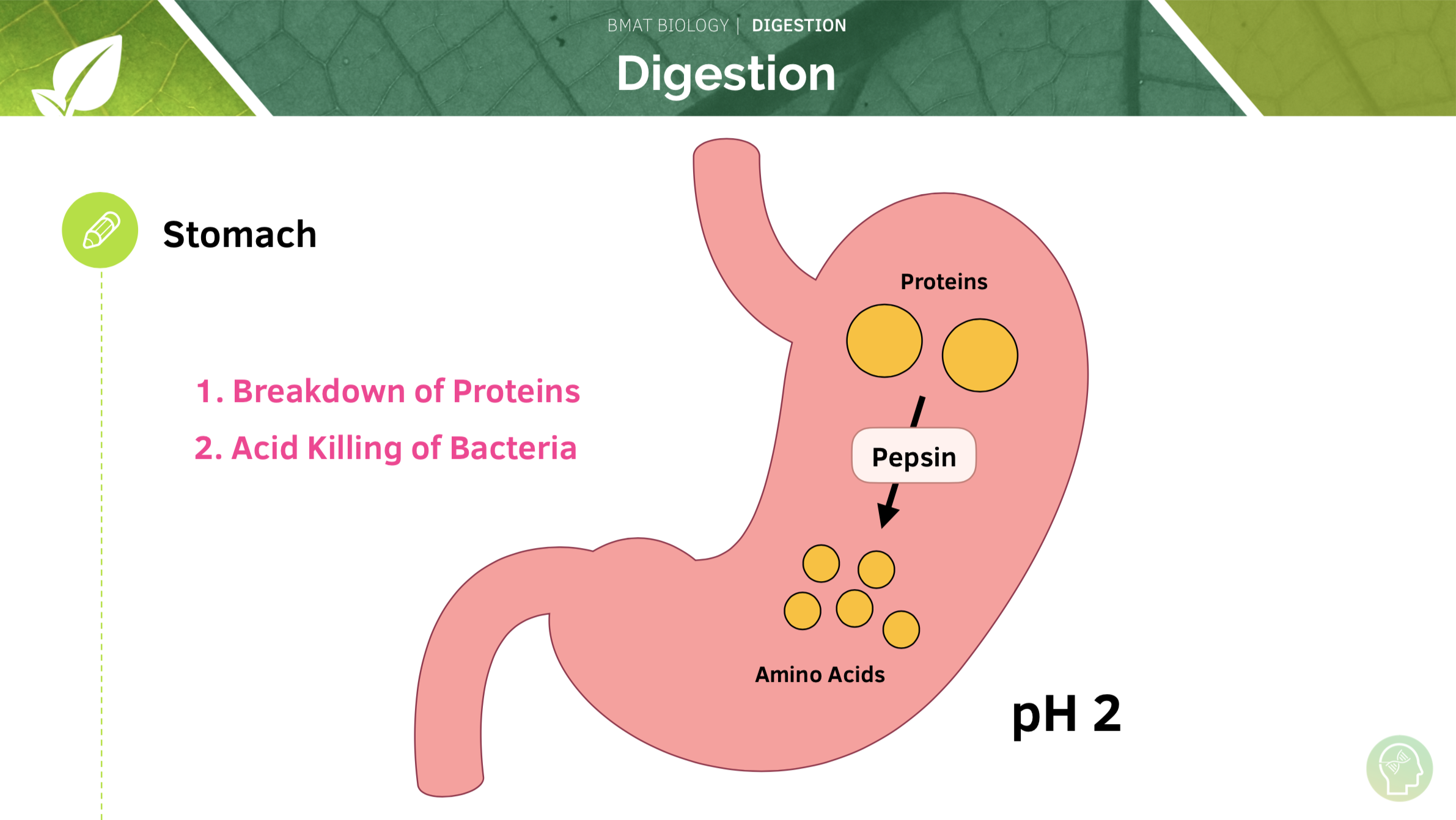
There have been 4 BMAT Past Paper Questions on Digestion. We will discuss realistic BMAT questions on osmoregulation, thermoregulation, negative feedback and more.
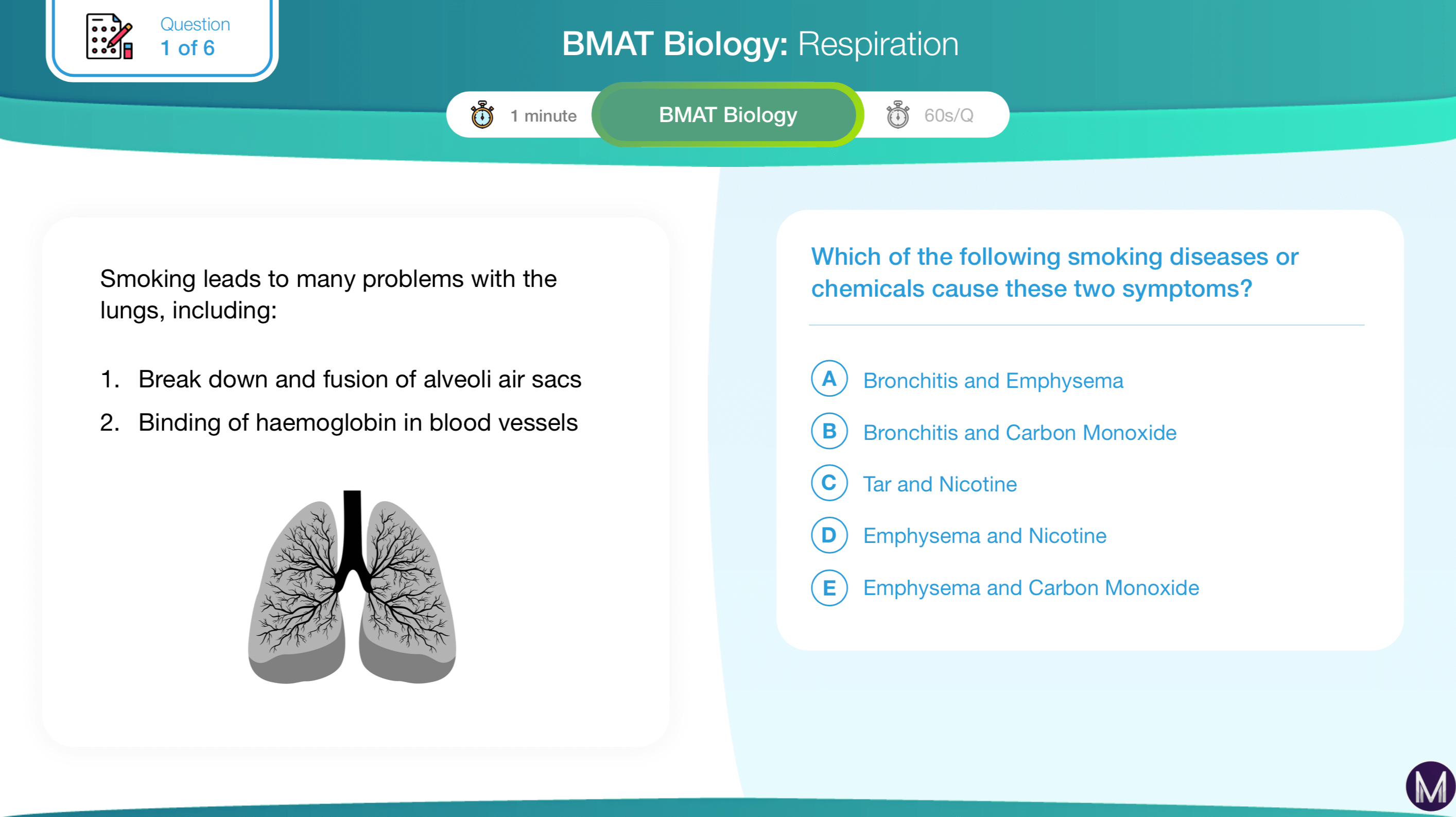
Respiration
There have been 6 BMAT Past Paper Questions on Respiration. We will discuss topics such as aerobic respiration, anaerobic respiration, energy and more.
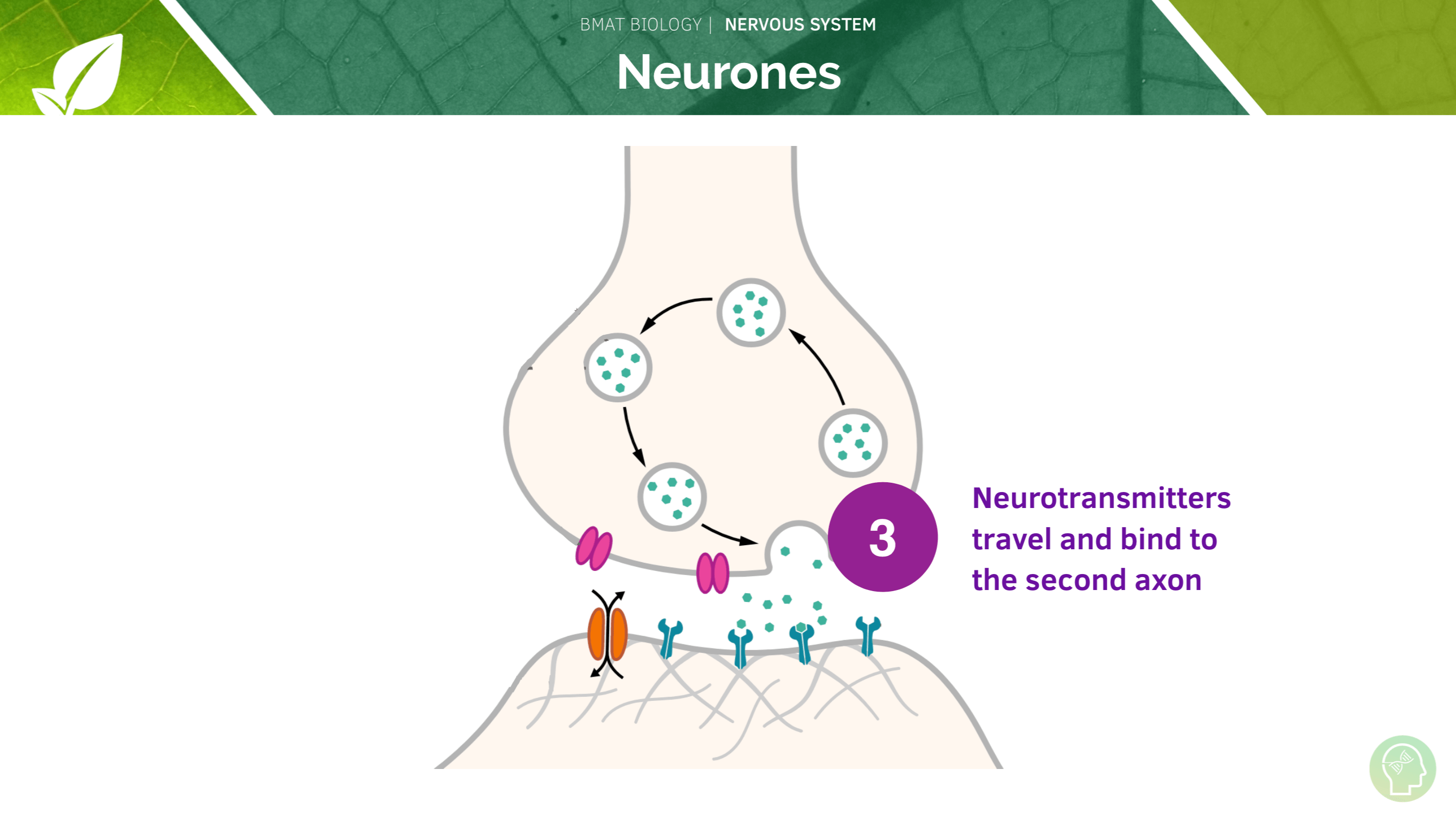
Nervous System
There have been 6 BMAT Questions on the Nervous System. We will discuss realistic BMAT Past Paper Questions on neurone structure, impulses, reflexes and more.
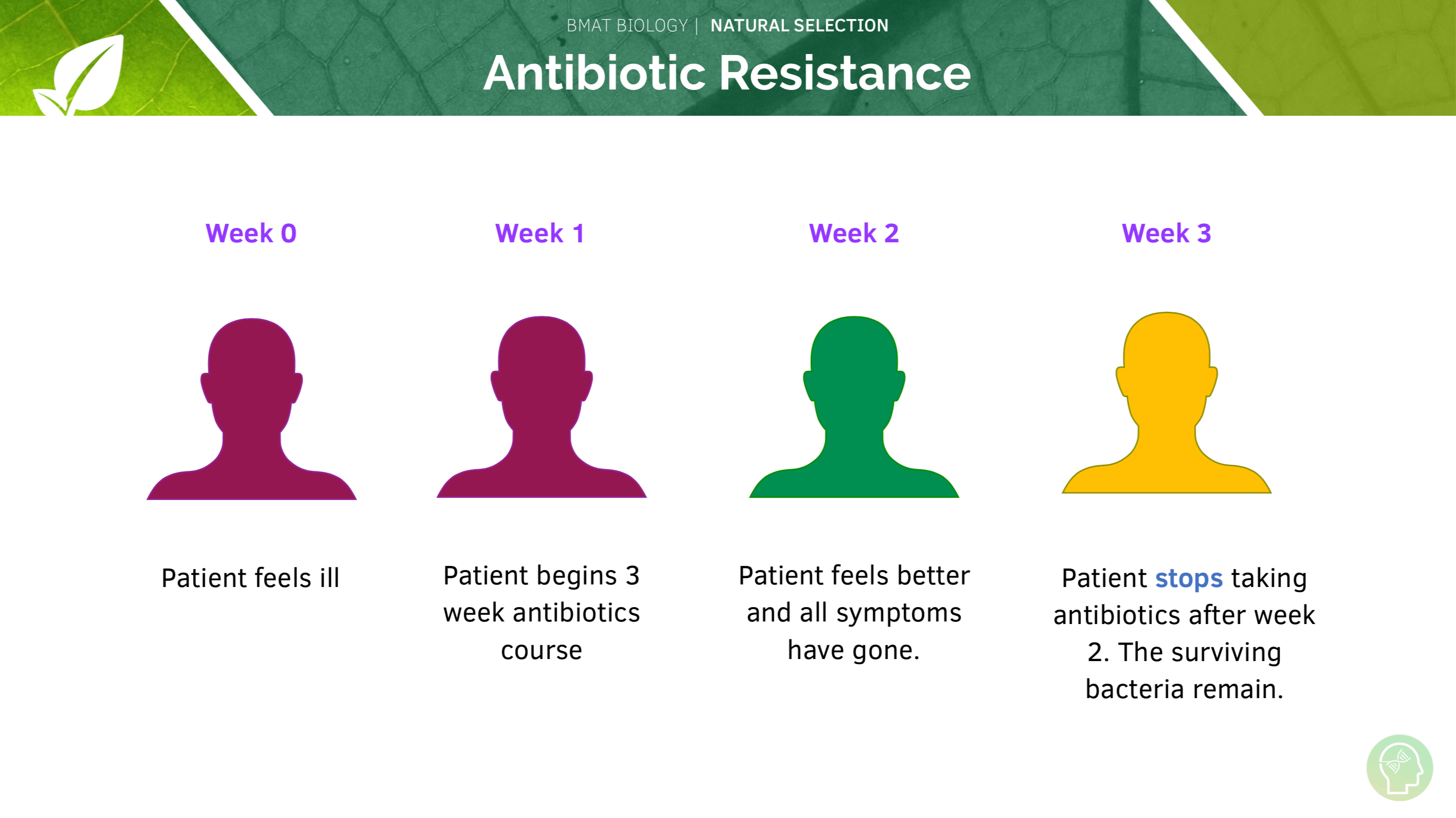
Natural Selection
There have been 3 BMAT Questions on Natural Selection. We will discuss realistic BMAT Past Paper Questions on speciation, evolution, adaptation and more.
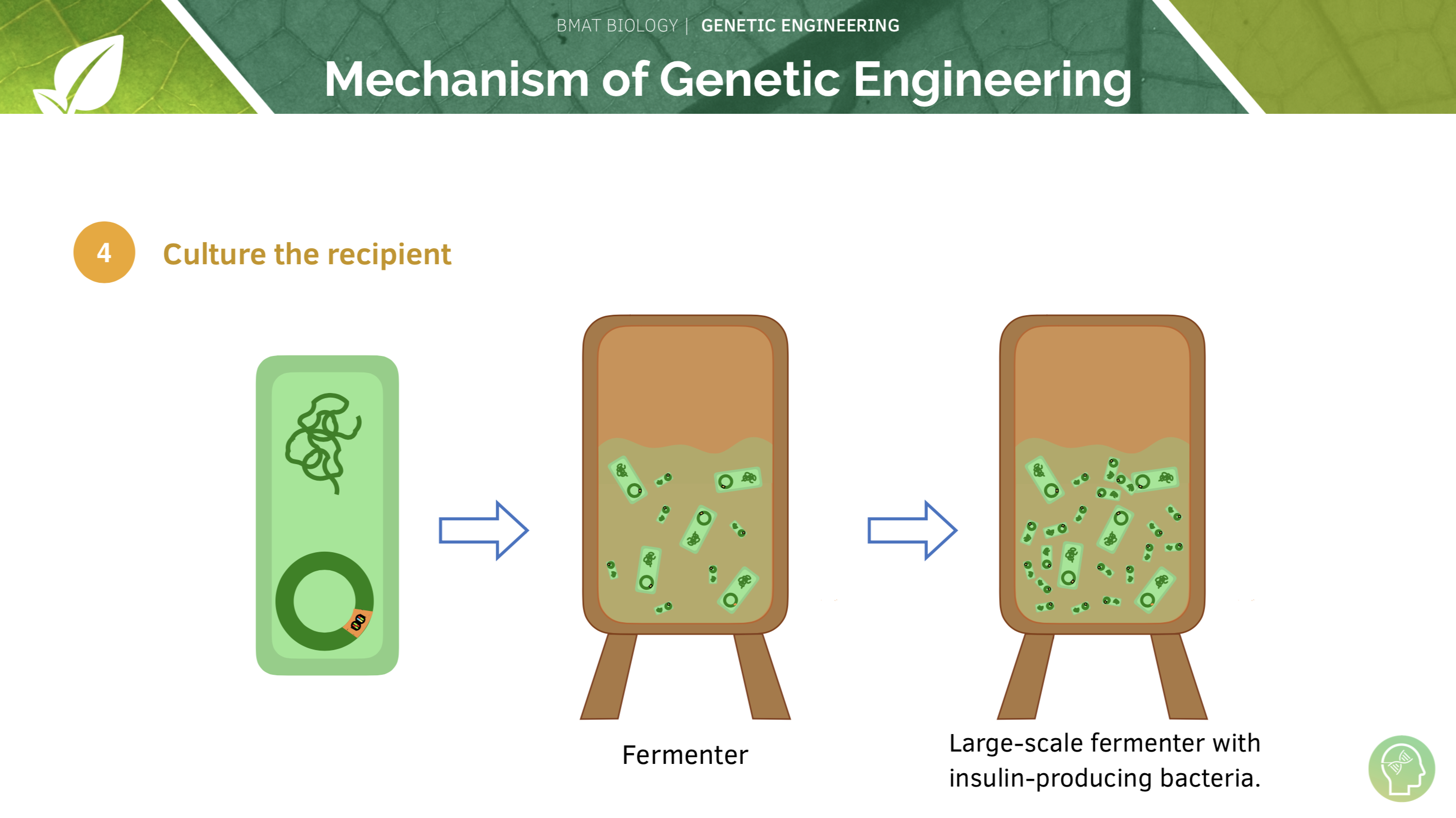
Genetic Engineering
There have been 5 BMAT Questions on Genetic Engineering. We will discuss realistic BMAT Past Paper Questions on gene engineering, production and biotechnology.
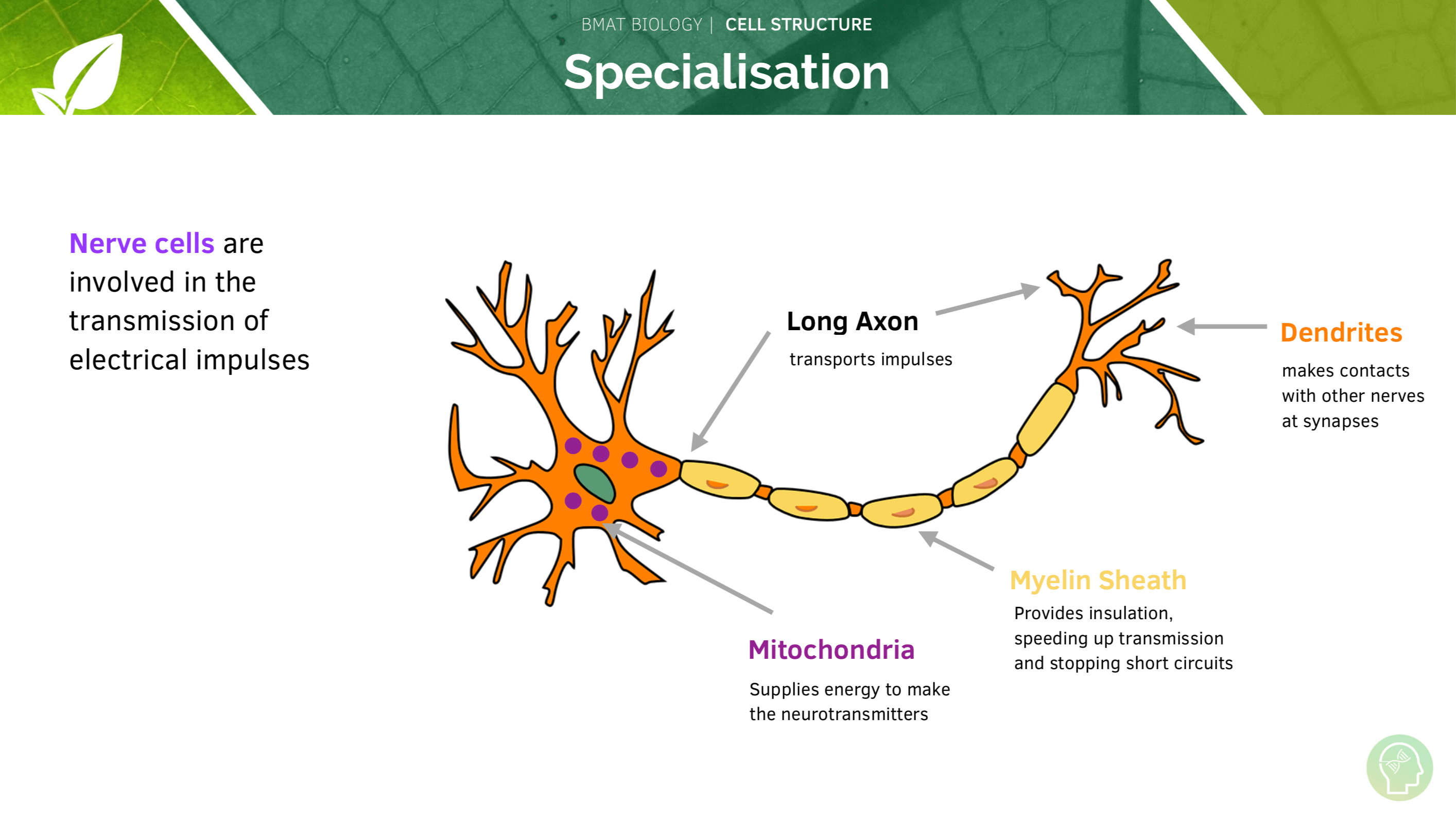
Cell Structure
There have been 2 BMAT Questions on Cell Structure. We will discuss realistic BMAT Past Paper Questions on organelles, cell functions and more.
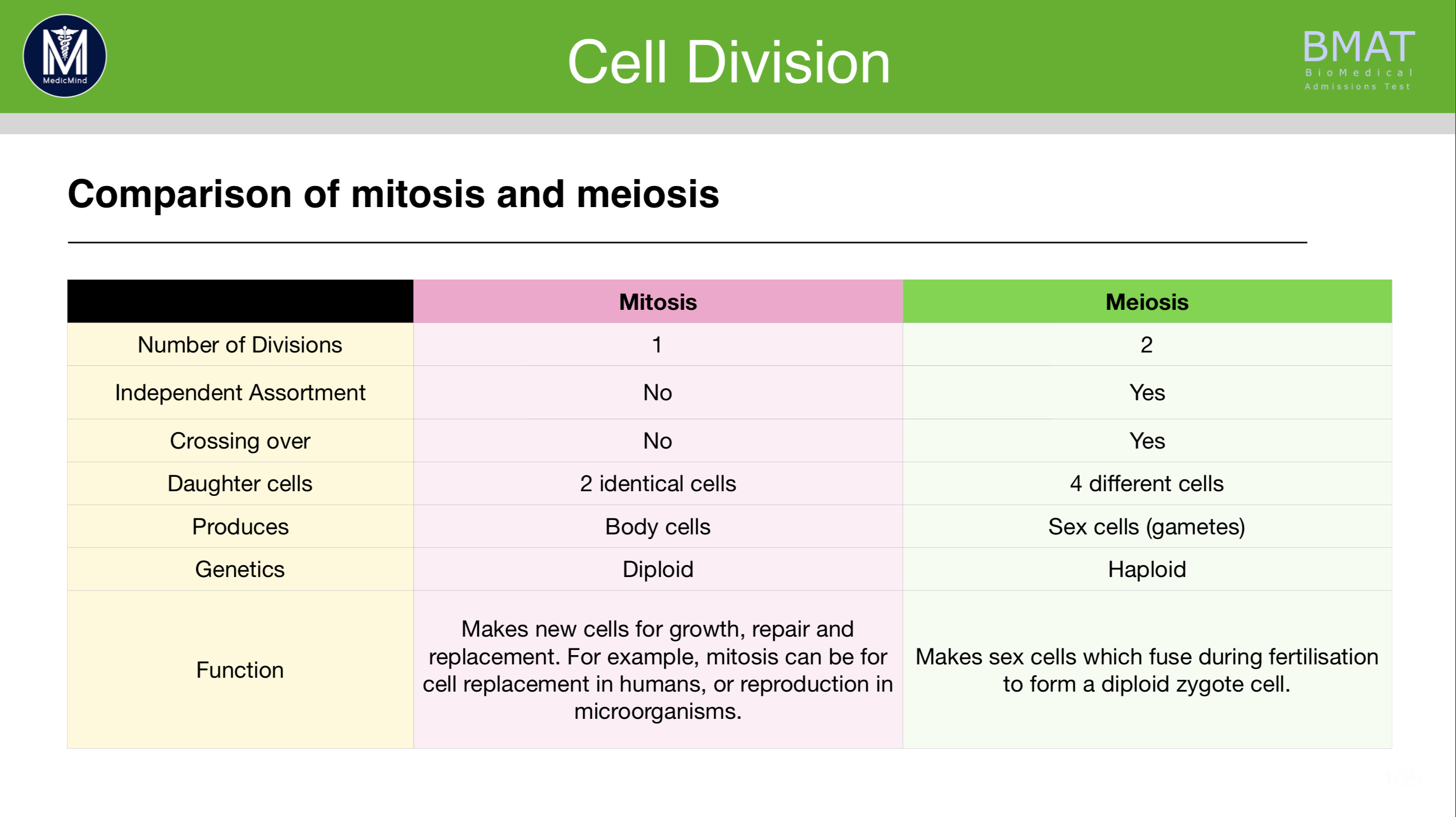
Cell Division
There have been 5 BMAT Questions on Cell Division. We will discuss realistic BMAT Past Paper Questions on mitosis, meiosis, inheritance and more.
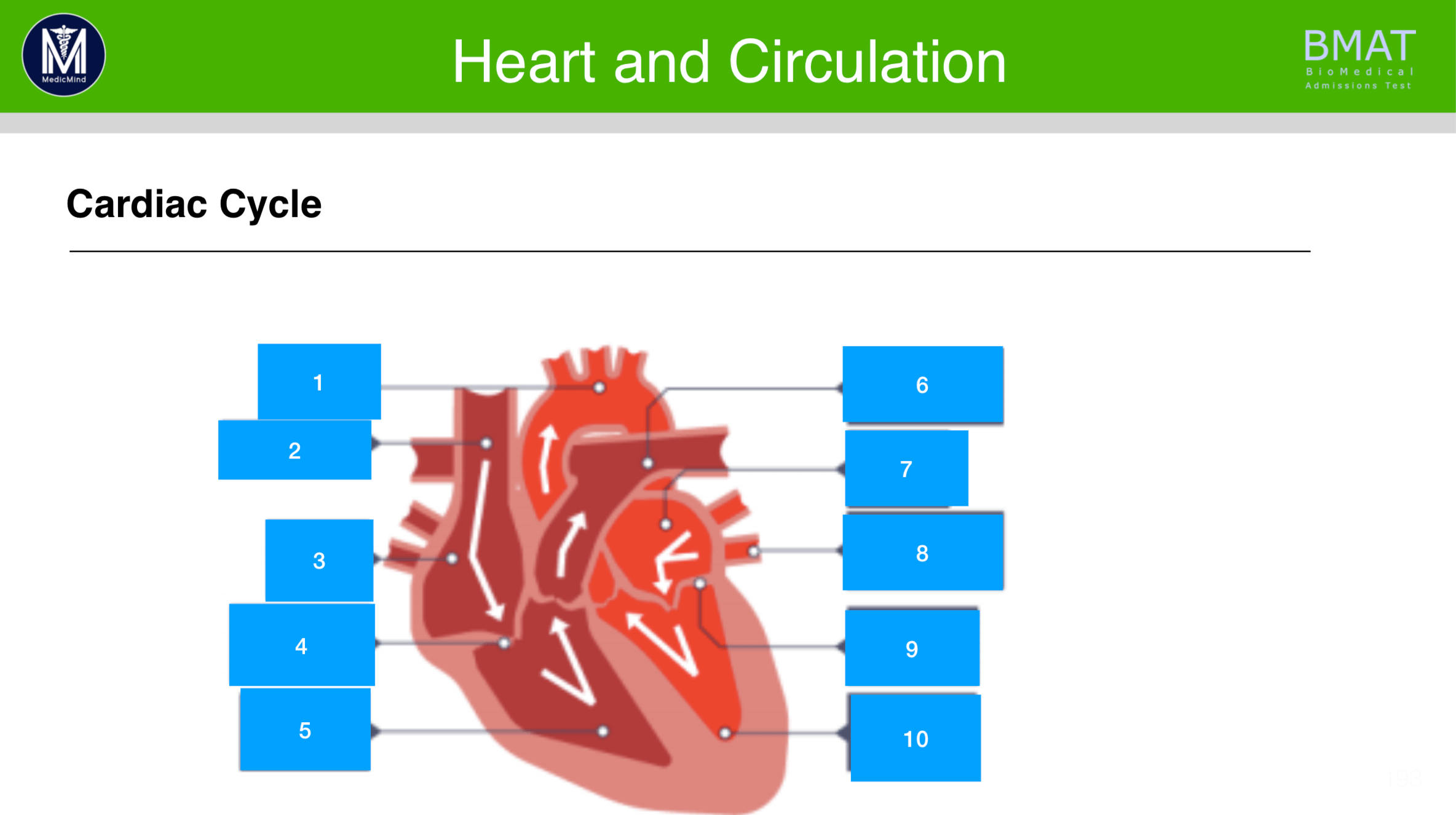
Heart and Circulation
There have been 2 BMAT Questions on the Heart. We will discuss realistic BMAT Past Paper Questions on heart function, the circulatory system, blood vessels and more.
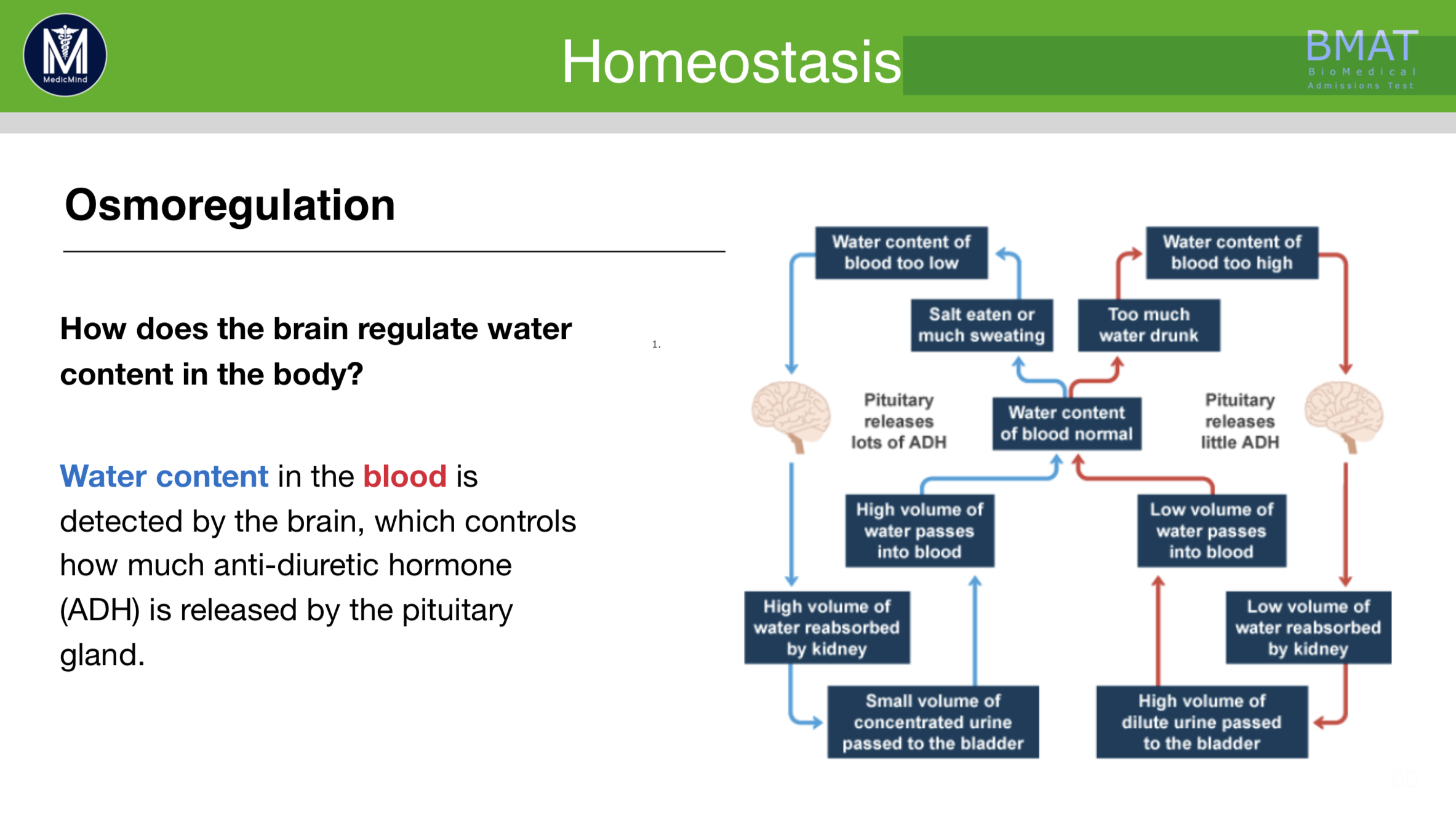
Atomic Structure
There have been 4 BMAT Questions on Atomic Structure. We will discuss realistic BMAT Past Paper Questions on RAM, RMM, atomic number, isotopes, mass number, electron shells and more.
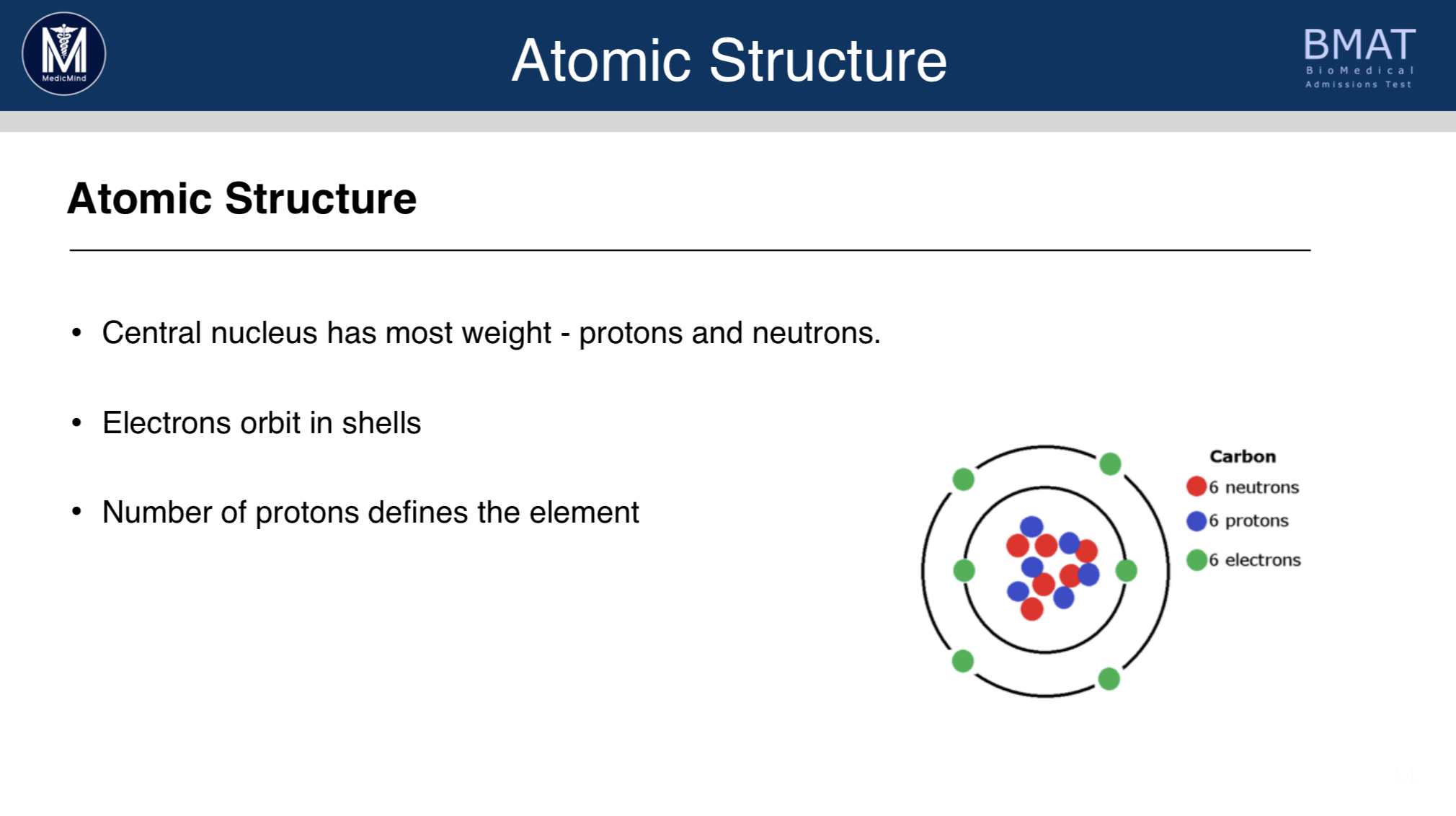
Calculations I
There have been 14 BMAT Questions on Chemistry Calculations. We will discuss realistic BMAT Past Paper Questions on moles, molar mass, gas volumes, reacting masses, concentration and more.
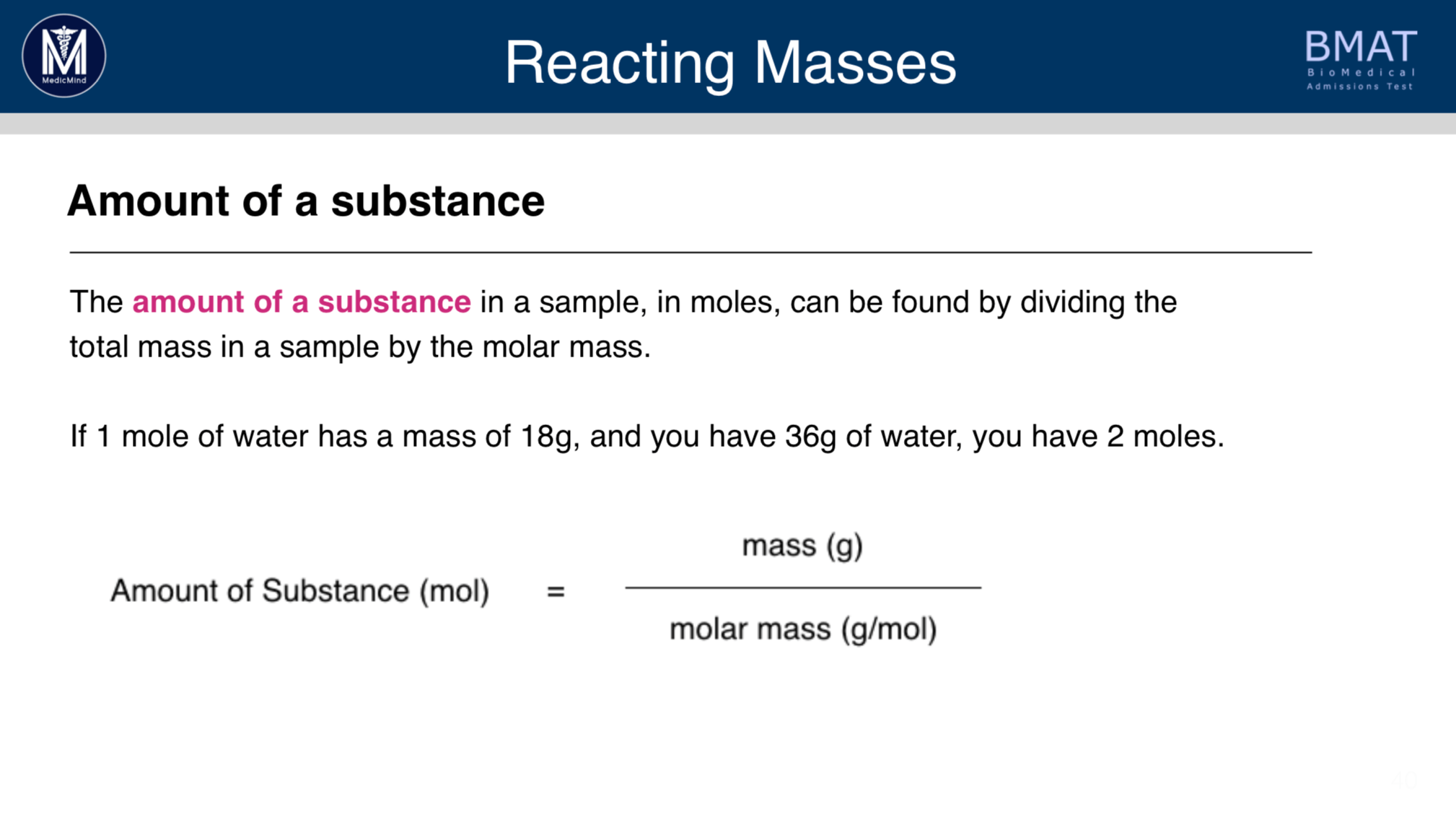
Calculations II
There have been 14 BMAT Questions on Chemistry Calculations. We will discuss realistic BMAT Past Paper Questions on RAM, RFM, RMM and more.
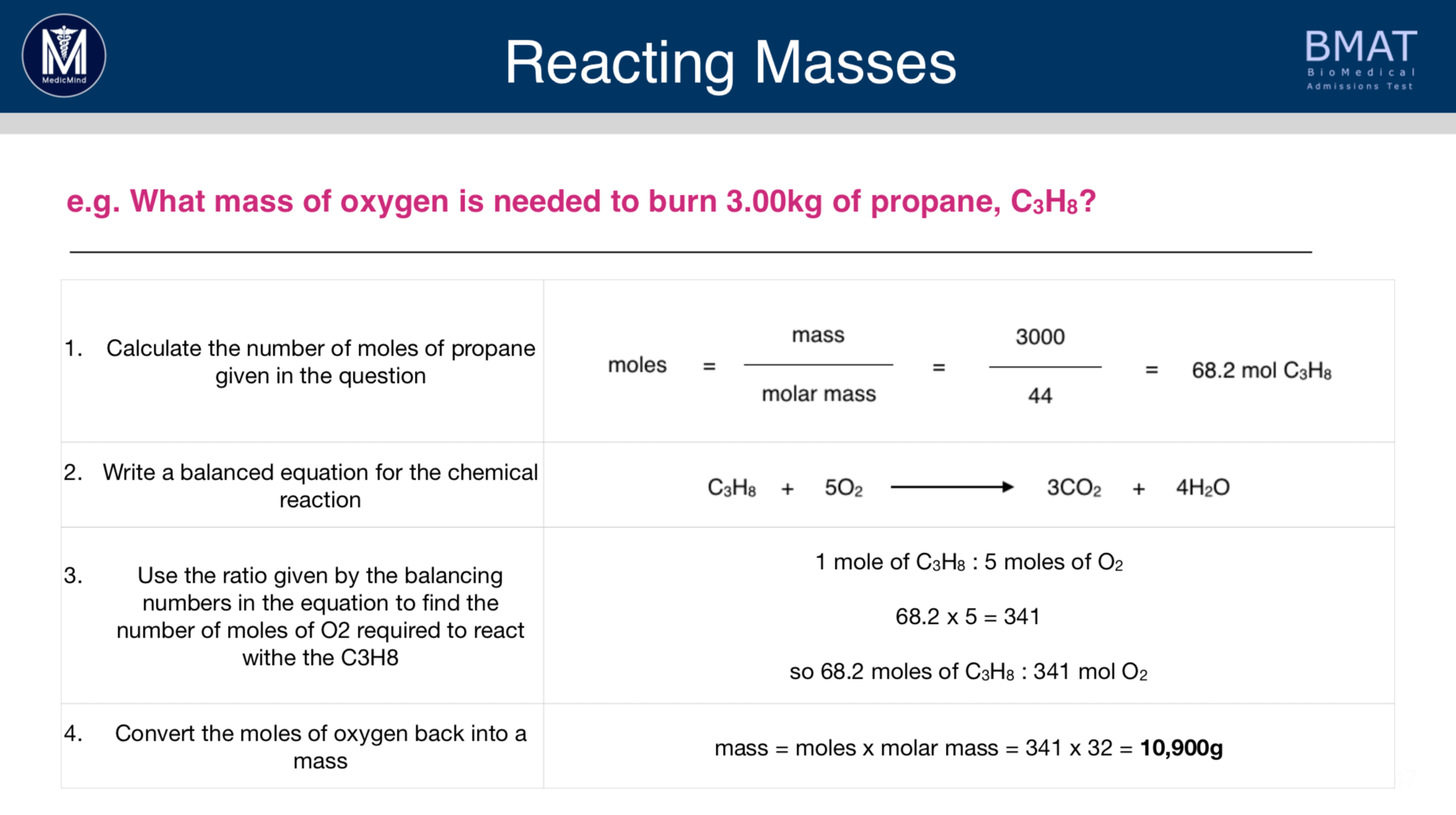
Calculations: % Yield
There have been 14 BMAT Questions on Chemistry Calculations. We will discuss realistic BMAT Past Paper Questions on calculating percentage yield and percentage composition.
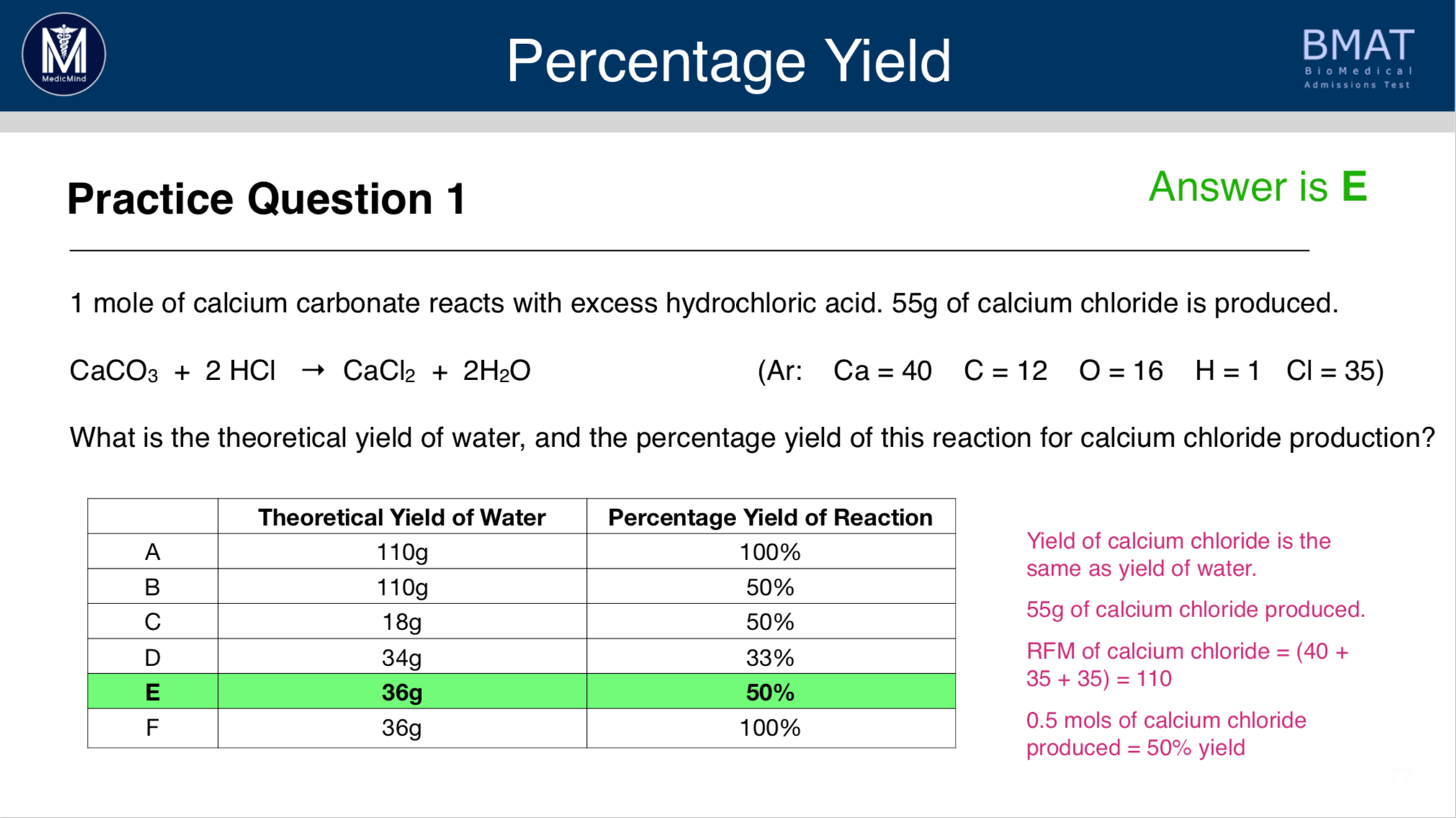
Structure and Bonding
There have been 5 BMAT Questions on Structure and Bonding. We will discuss realistic BMAT Past Paper Questions on giant ionic, giant covalent, simple molecular and metallic structures.
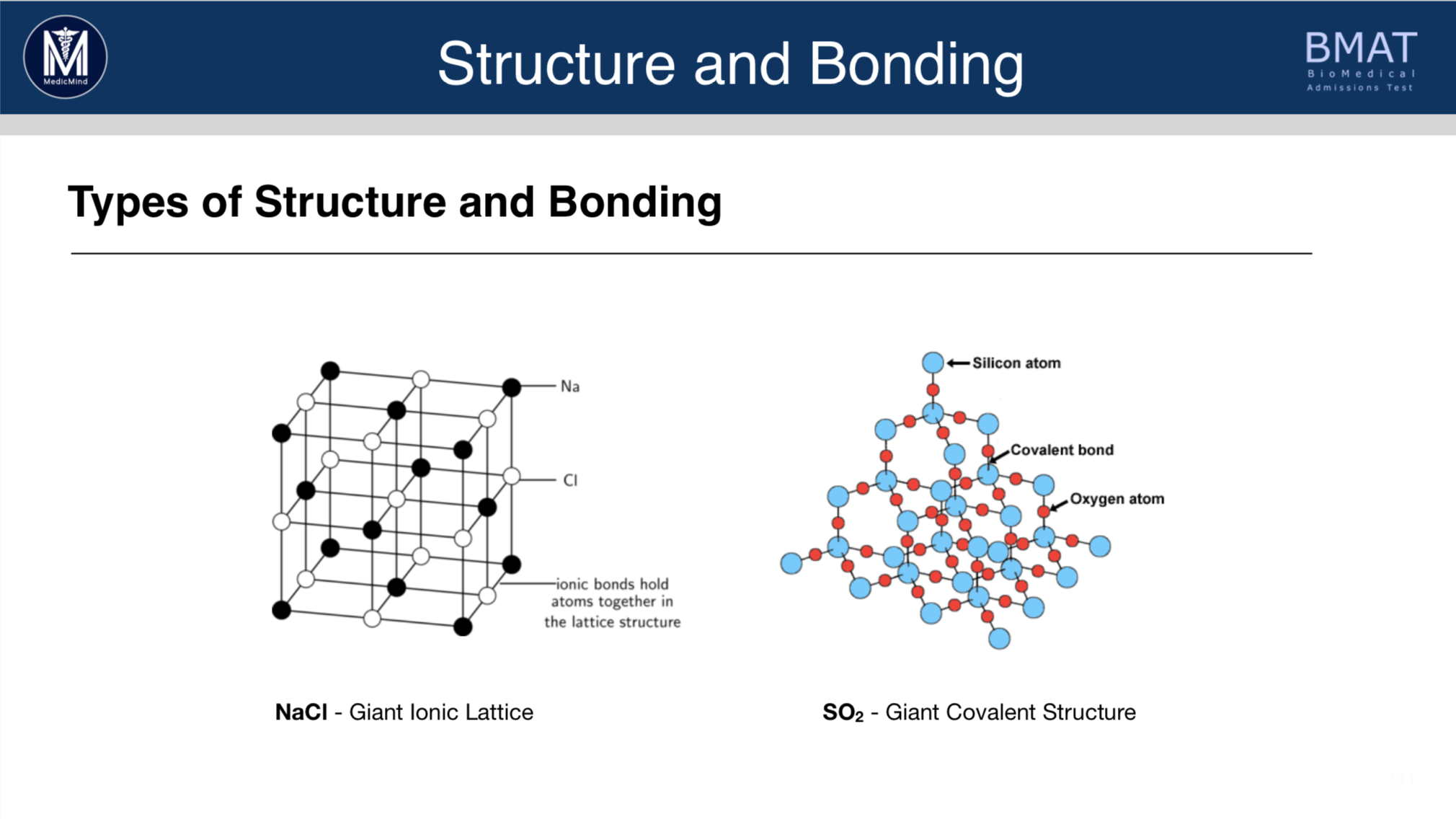
Balancing Equations
There have been 9 BMAT Questions on Balancing Equations. We will discuss realistic BMAT Past Paper Questions on balancing equations.
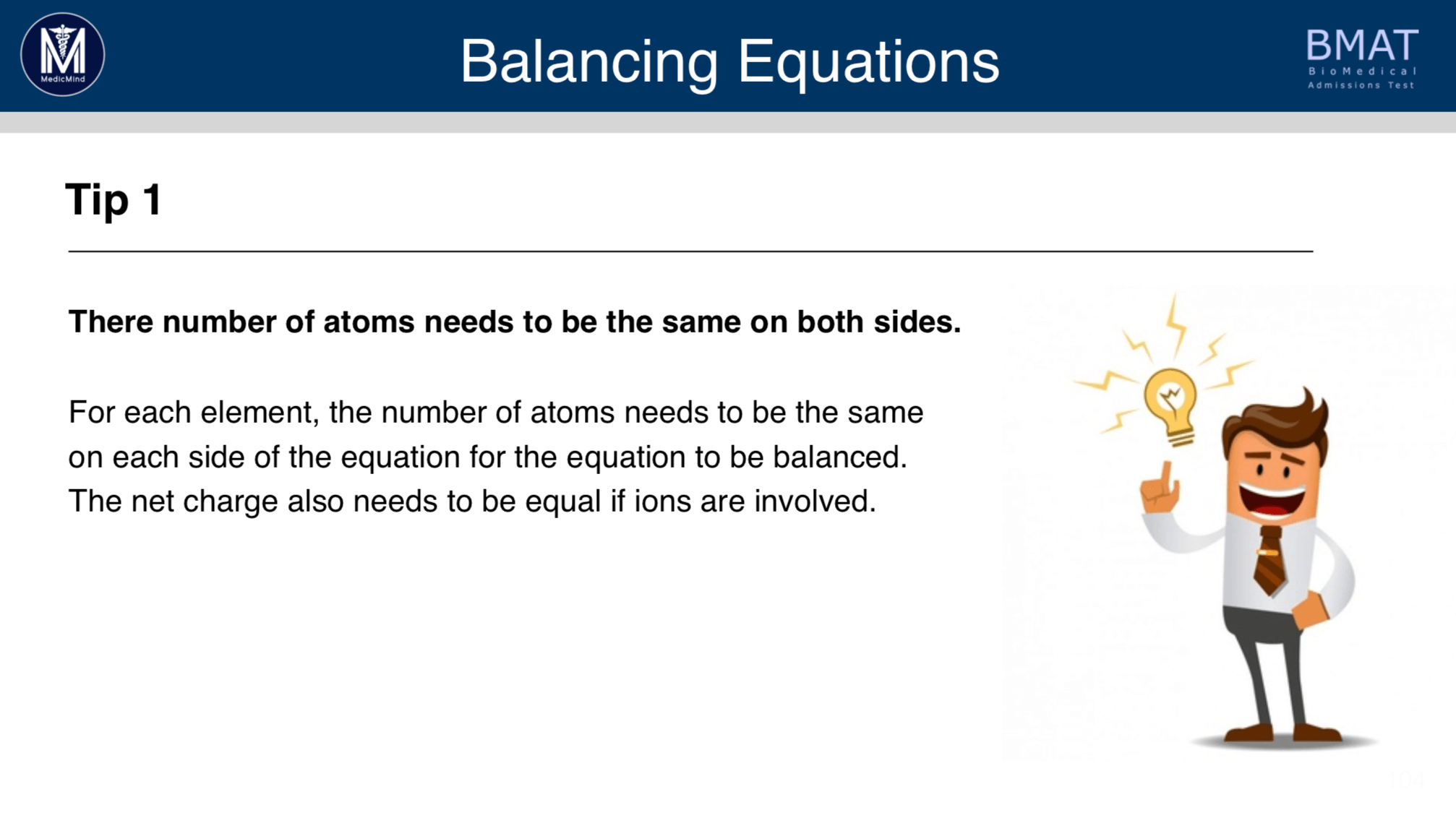
Separation Techniques
There have been 3 BMAT Questions on Separating Techniques. We will discuss realistic BMAT Past Paper Questions on simple distillation, filtration, fractional distillation, chromatography and more.
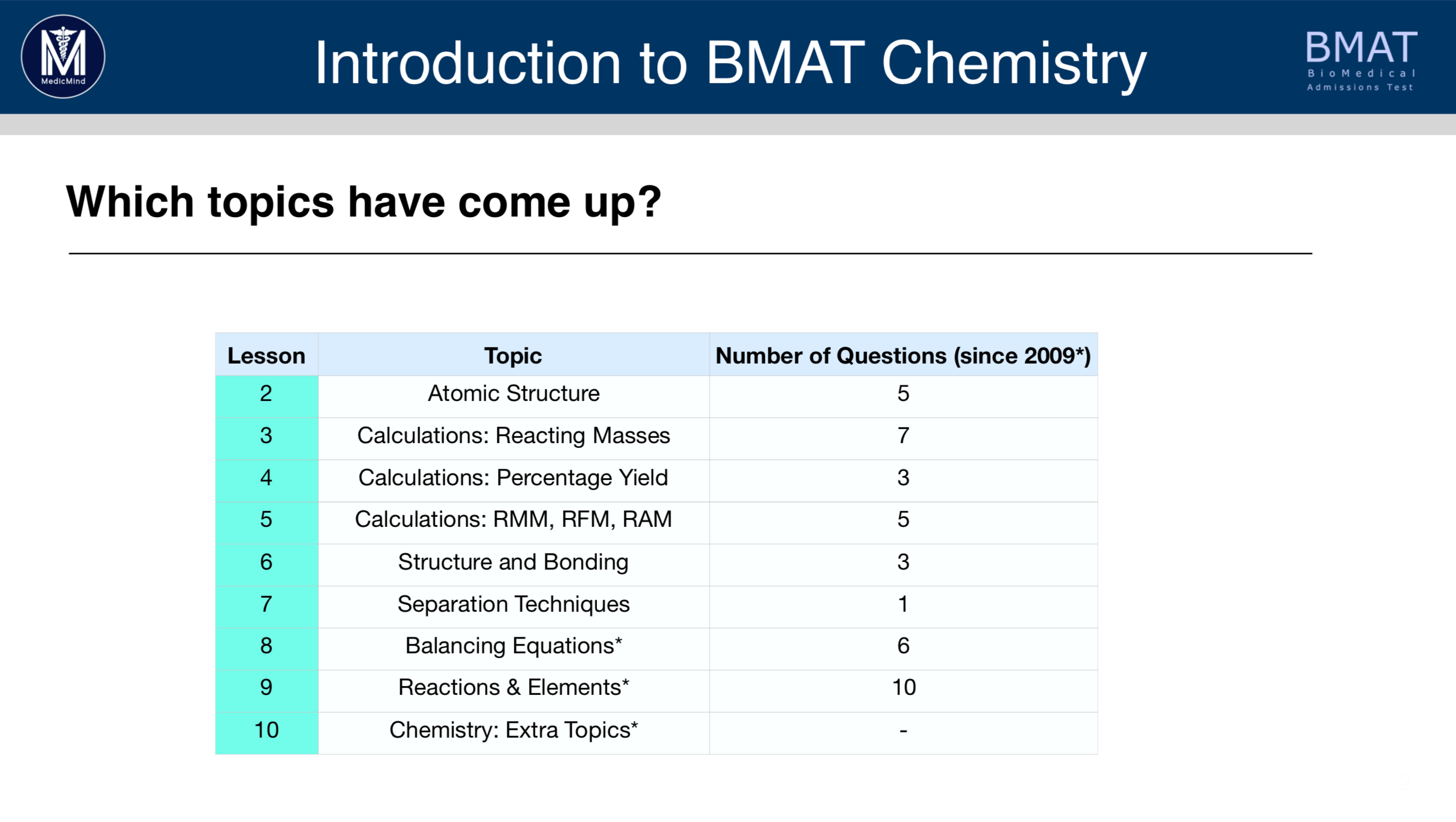
S2: Physics + Maths
- Lesson 1 Waves I: Properties
- Lesson 2 Waves II: Light
- Lesson 3 Waves III: Sound
- Lesson 4 Waves IV: EM Waves
- Lesson 5 Electricity I: Charge
- Lesson 6 Electricity II: Circuits
- Lesson 7 Electricity III: Power
- Lesson 8 Energy I: Work Done
- Lesson 9 Energy II: KE & GPE
- Lesson 10 Density
- Lesson 11 Radioactivity
- Lesson 12 Algebra: Rearranging
- Lesson 13 Algebra: Index laws
- Lesson 14 Algebra: Inequalities
- Lesson 15 Algebra: Area & Length
- Lesson 16 Trigonometry
- Lesson 17 Probabilities
- Lesson 18 Ratios
- Lesson 19 Graphs and Gradients
- Lesson 20 Means
Waves I: Properties
There have been 12 BMAT Questions on Waves. We will discuss realistic BMAT Past Paper Questions on the speed, frequency, wavelength and amplitude of waves.
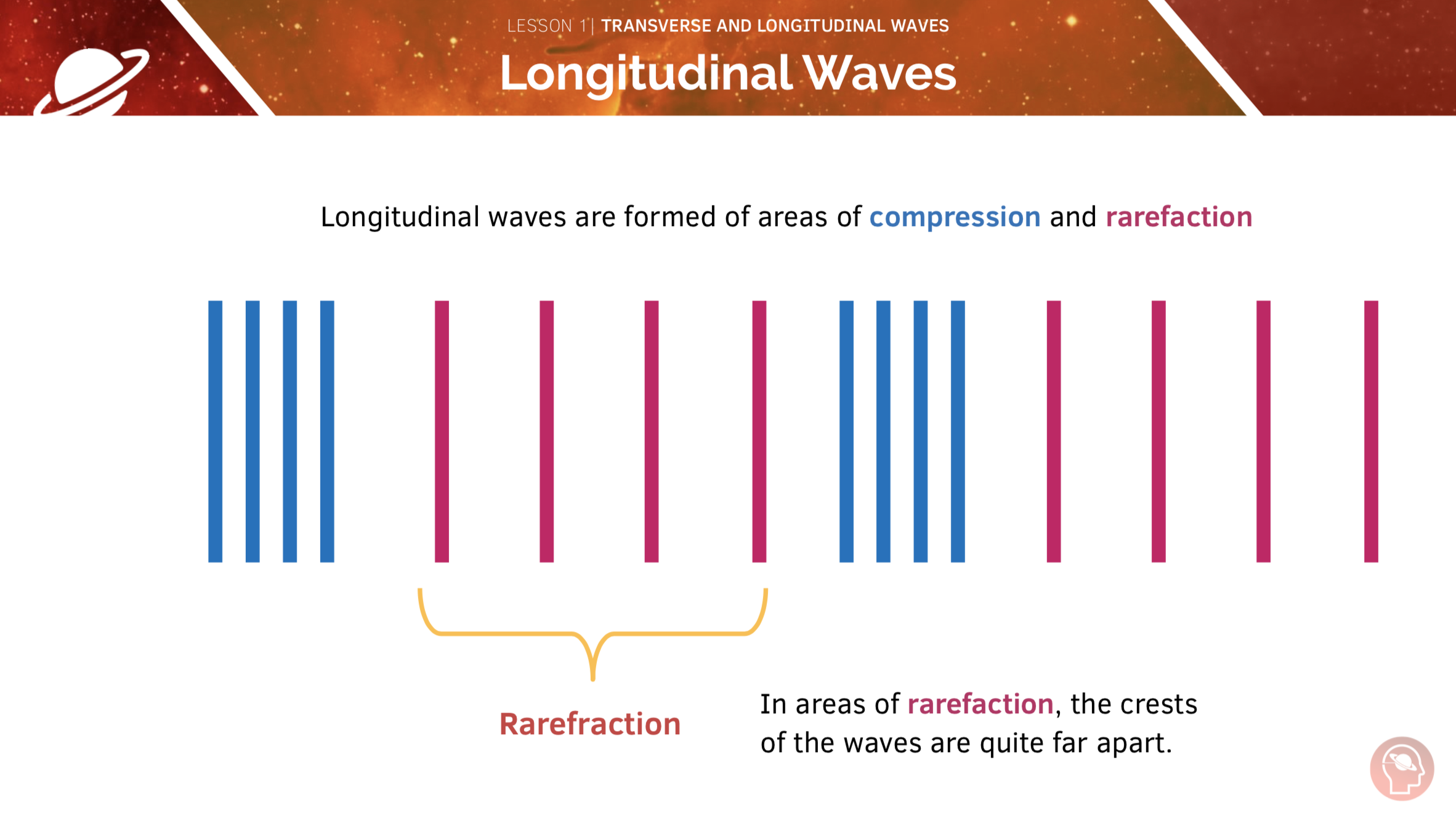
Waves II: Light
There have been 12 BMAT Questions on Waves. We will discuss realistic BMAT Past Paper Questions on the properties of light, including reflection, refraction and more.
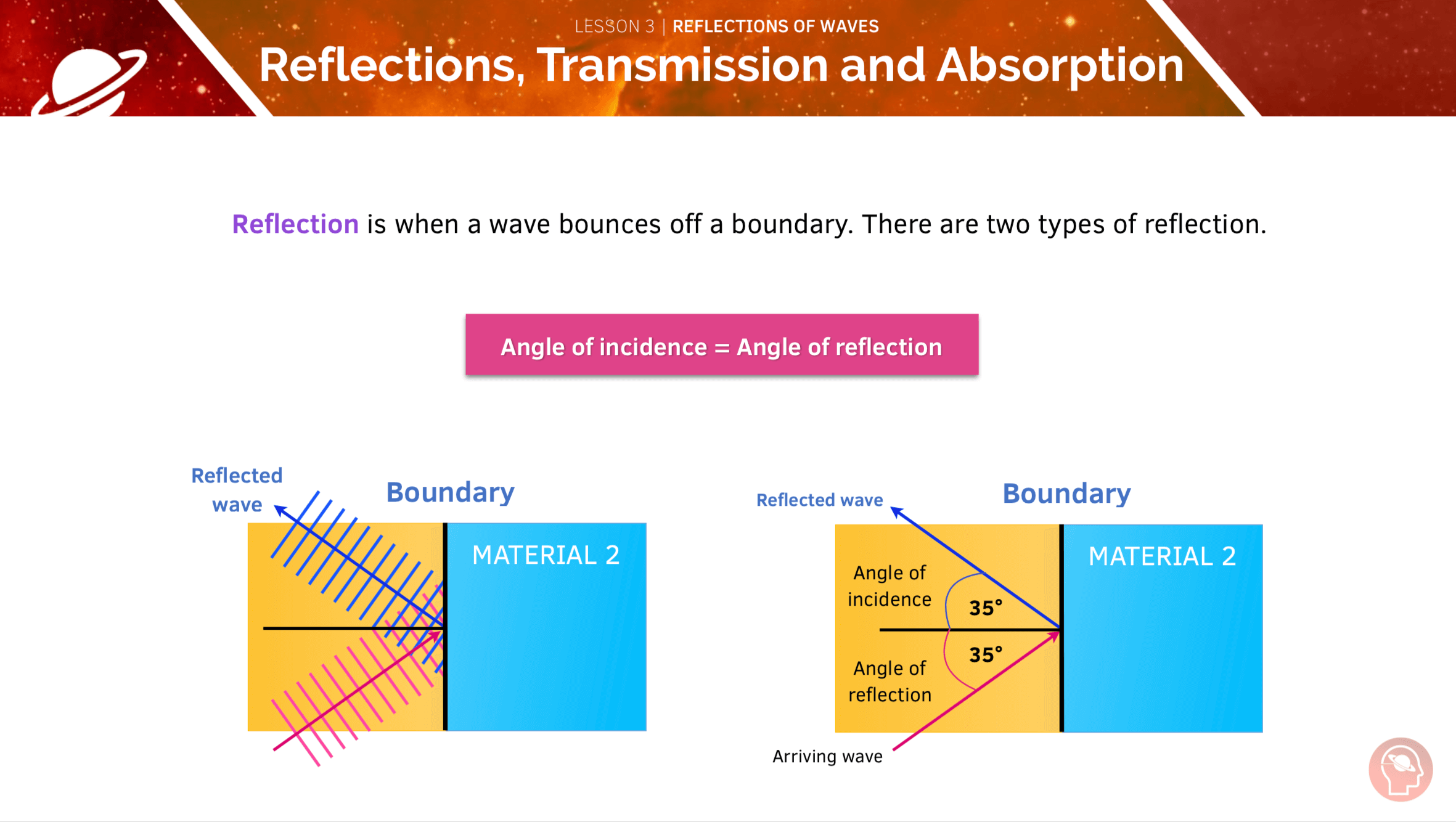
Waves III: Sound
There have been 12 BMAT Questions on Waves. We will discuss realistic BMAT Past Paper Questions on the properties of sound, including speed, reflection and echoes.
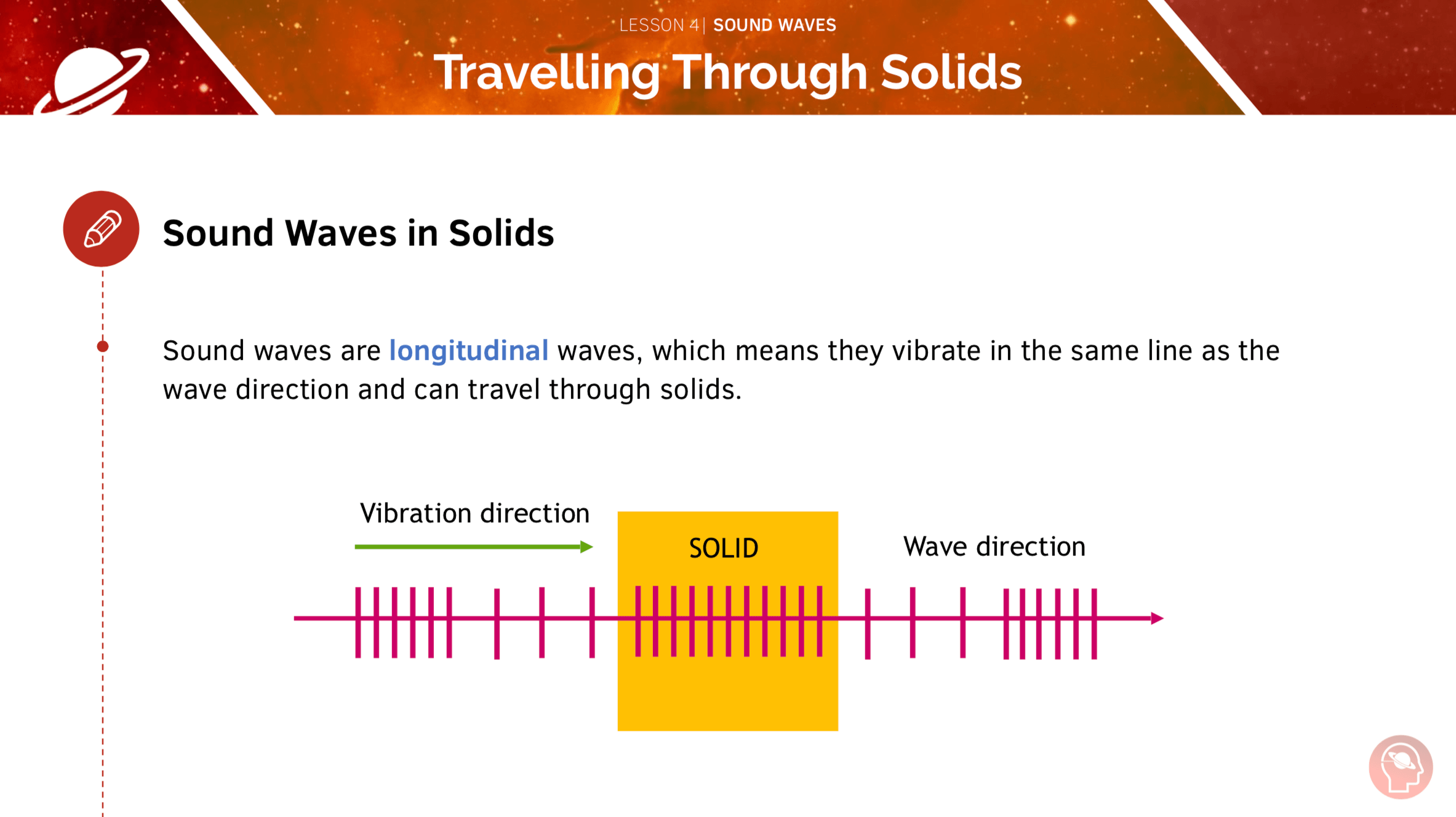
Waves IV: EM Waves
There have been 12 BMAT Questions on Waves. We will discuss realistic BMAT Past Paper Questions on the electromagnetic spectrum and its different components.
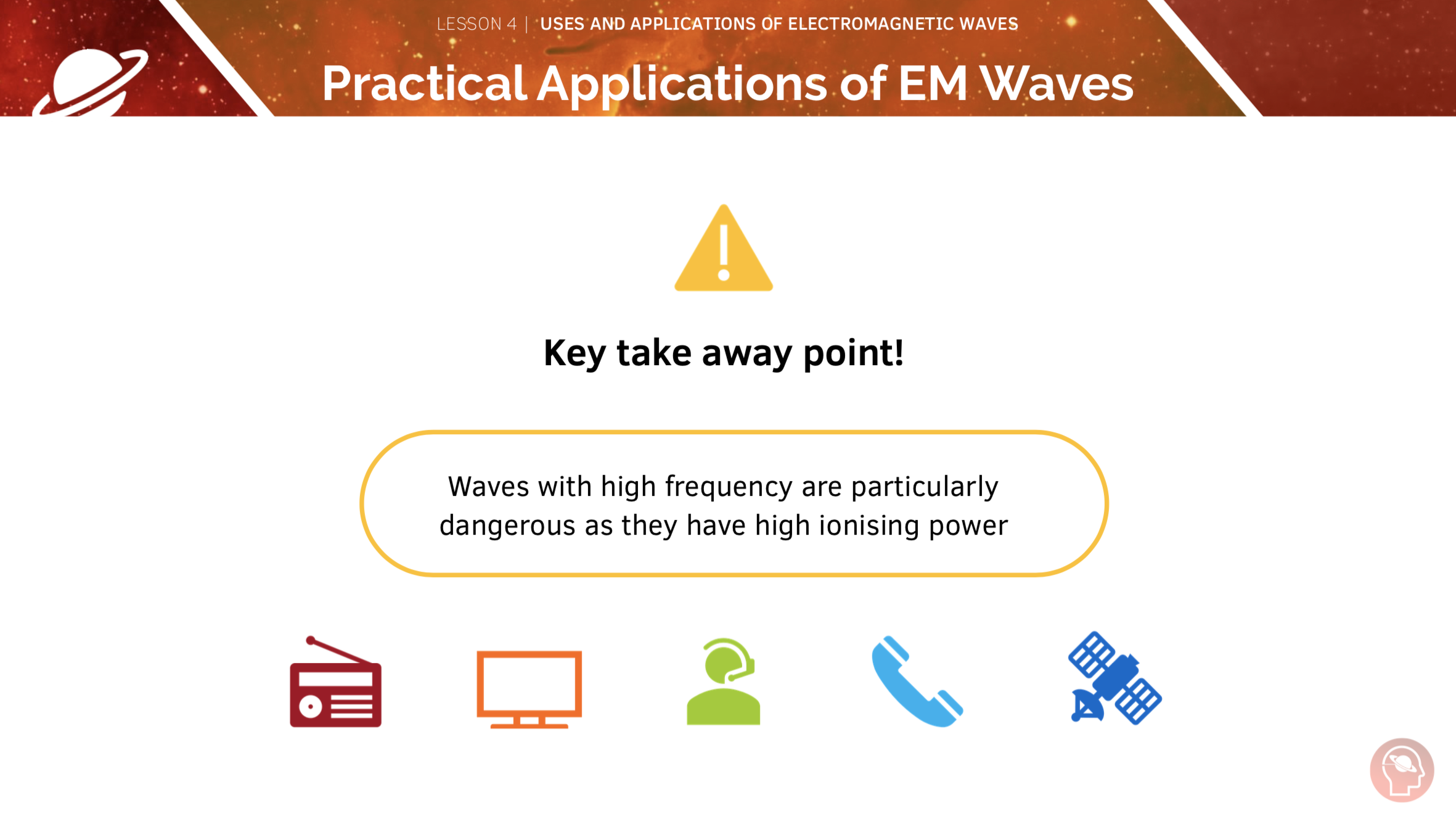
Electricity I: Charge
There have been 11 BMAT Questions on Electricity. We will discuss realistic BMAT Past Paper Questions on the properties, uses and hazards of static electricity.
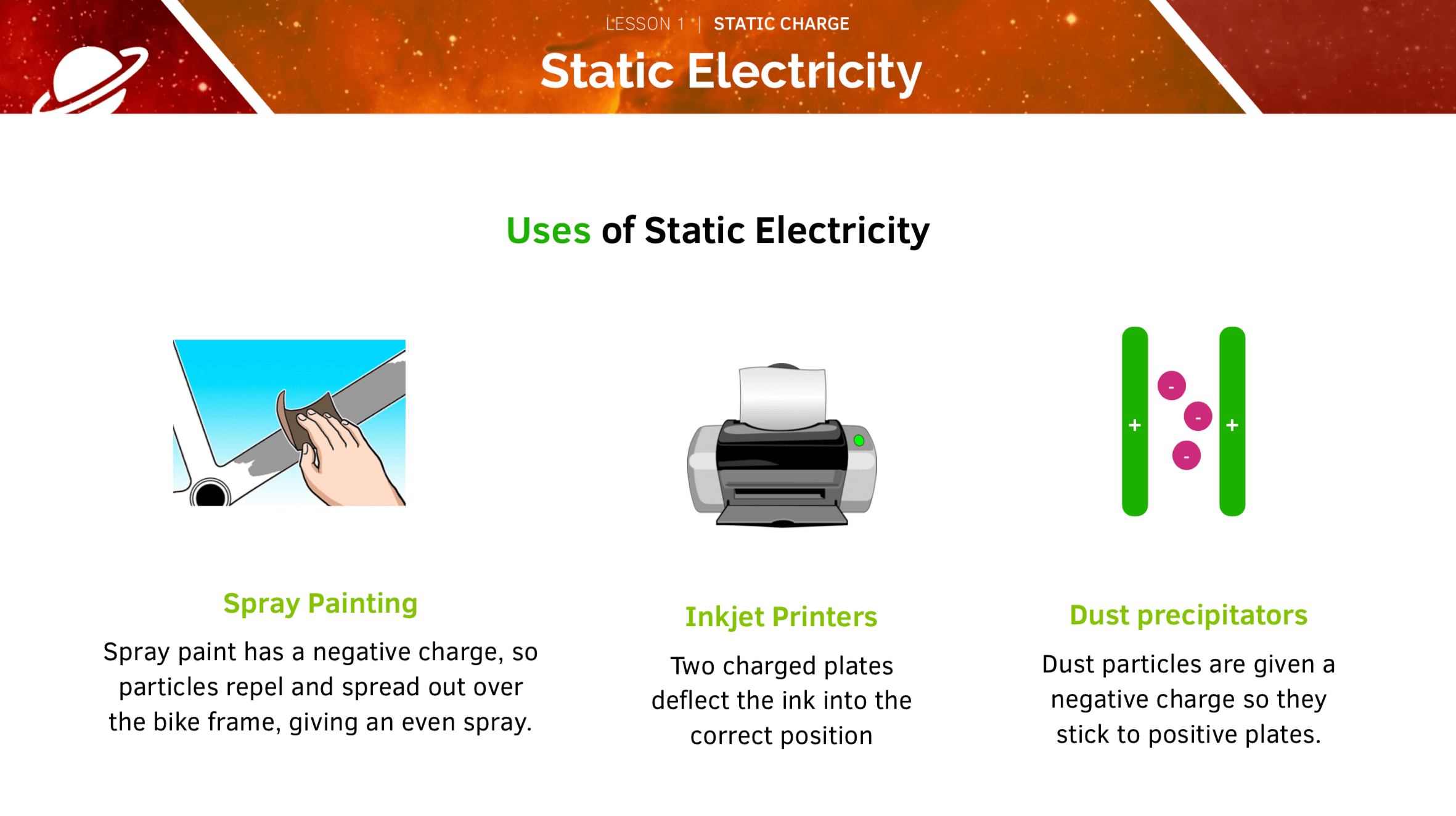
Electricity II: Circuits
There have been 11 BMAT Questions on Electricity. We will discuss realistic BMAT Past Paper Questions on circuit diagrams, voltage, current, charge and resistance.
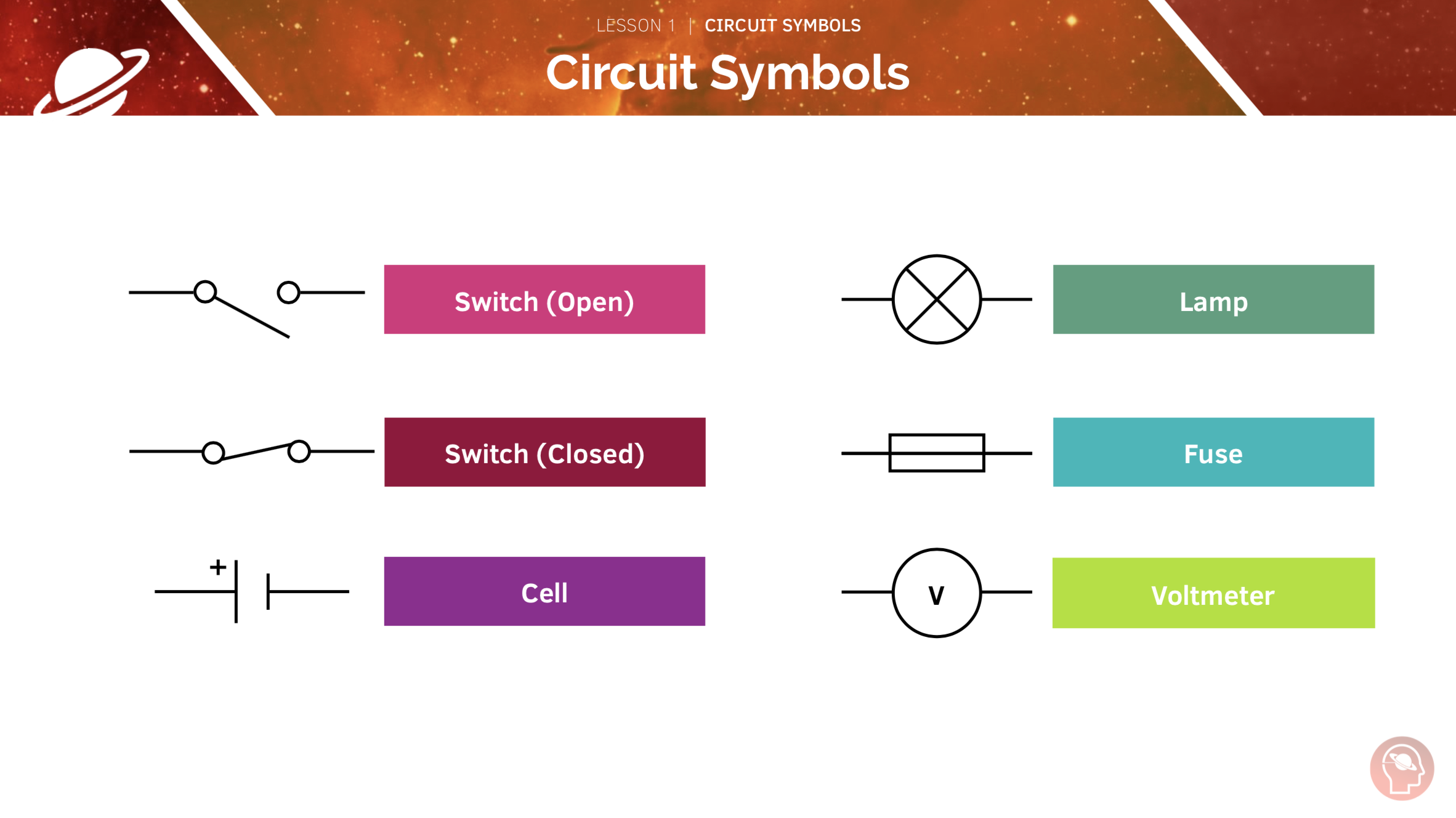
Electricity III: Power
There have been 11 BMAT Questions on Electricity. We will discuss realistic BMAT Past Paper Questions on power, work done, voltage and different electrical appliances.
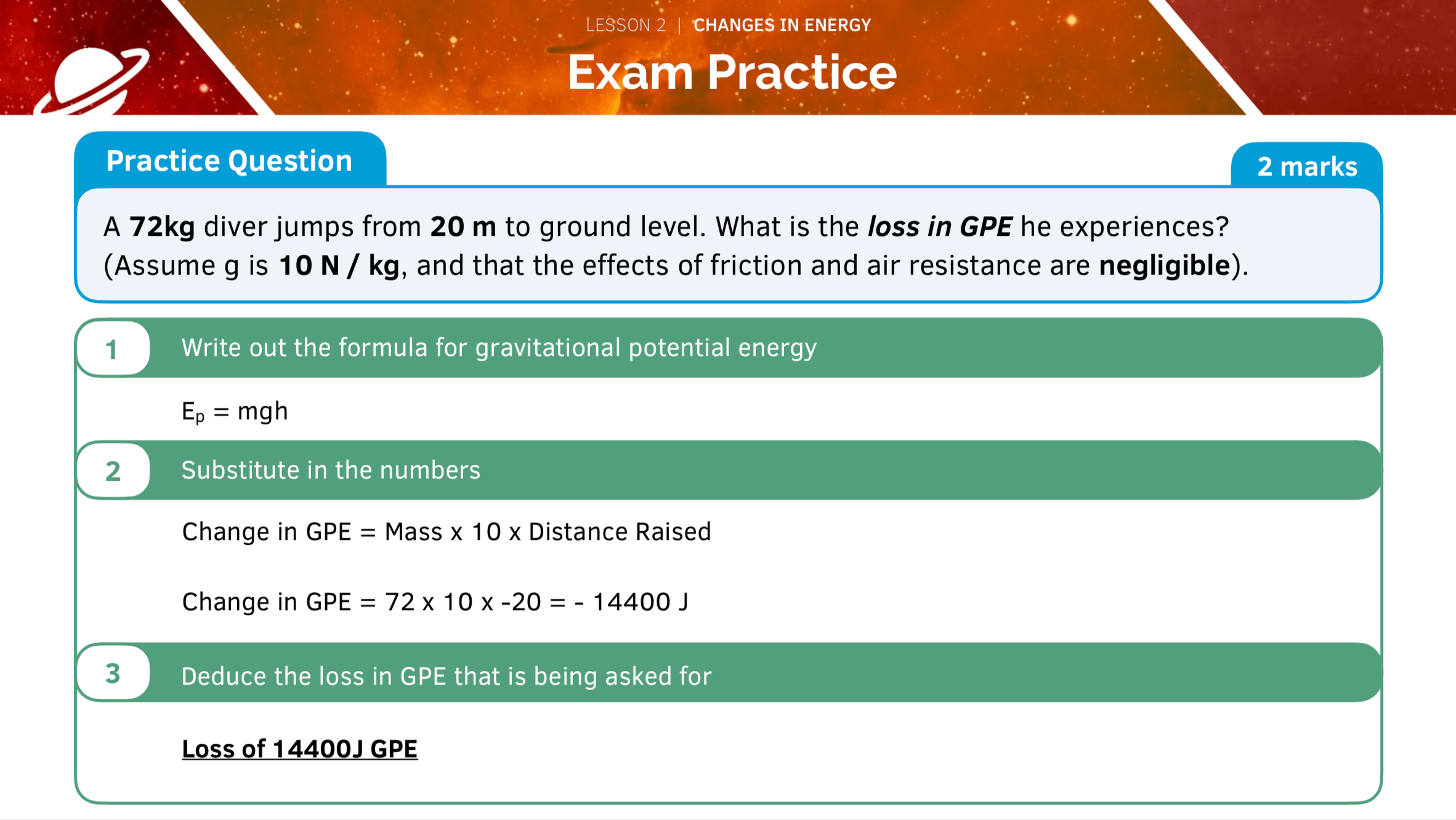
Energy I: Work Done
There have been 7 BMAT Questions on Energy. We will discuss realistic BMAT Past Paper Questions on energy transferred, work done, force and distance.
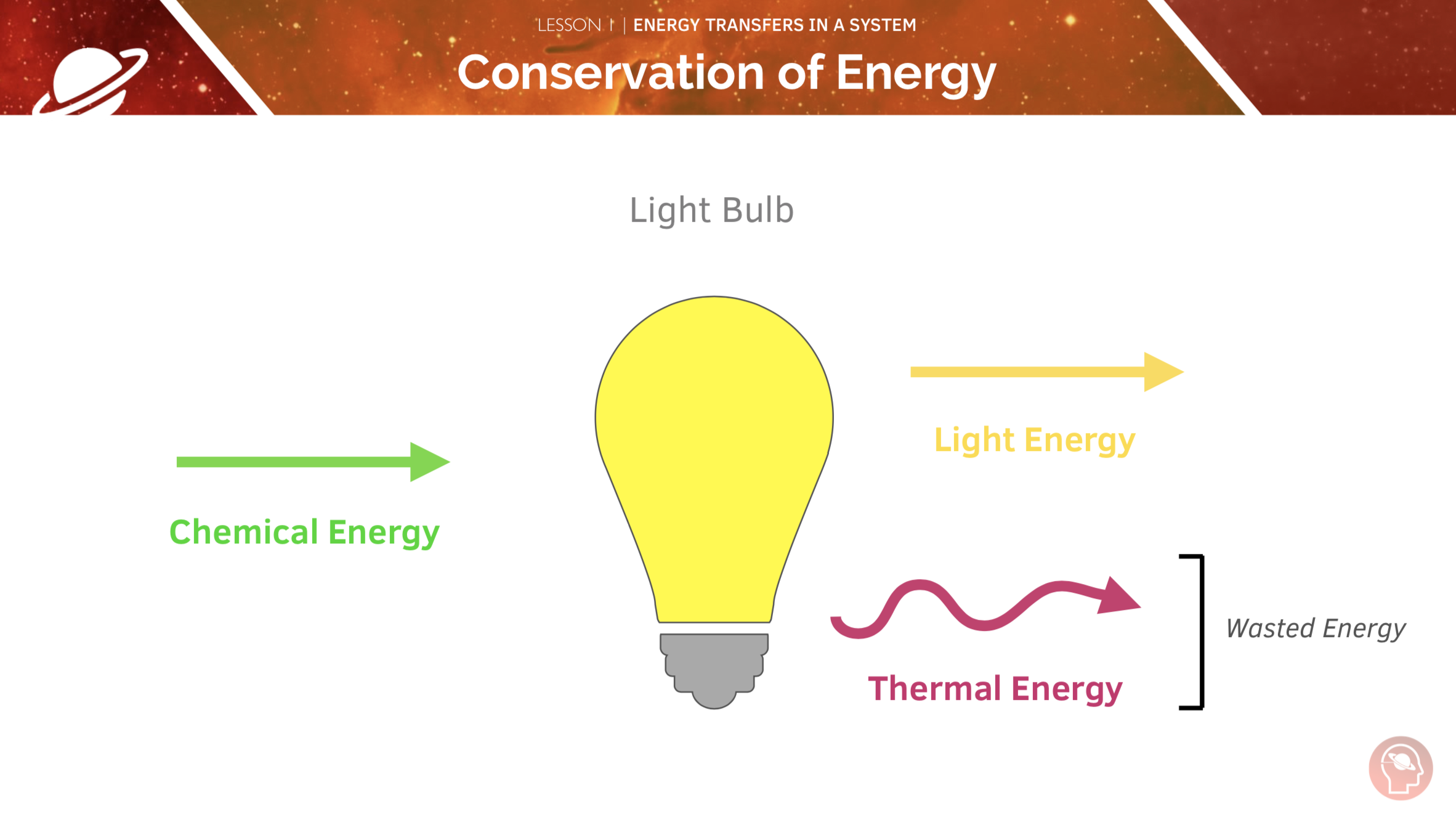
Energy II: KE & GPE
There have been 7 BMAT Questions on Energy. We will discuss realistic BMAT Past Paper Questions on kinetic energy, gravitational potential energy and energy changes in different scenarios.
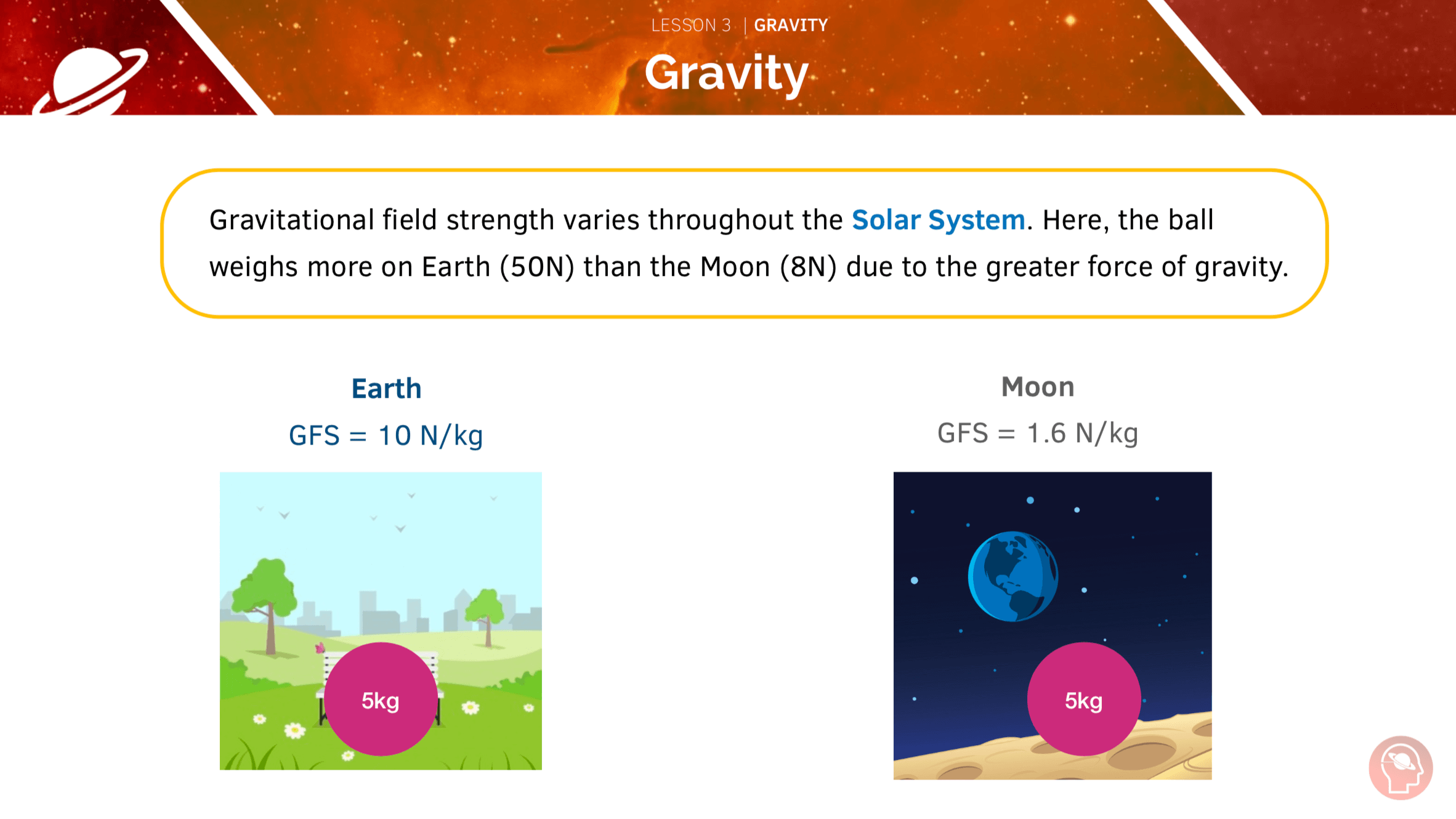
There have been 2 BMAT Questions on Density. We will discuss realistic BMAT Past Paper Questions on calculating density of solids, liquids and gases in different experiments.
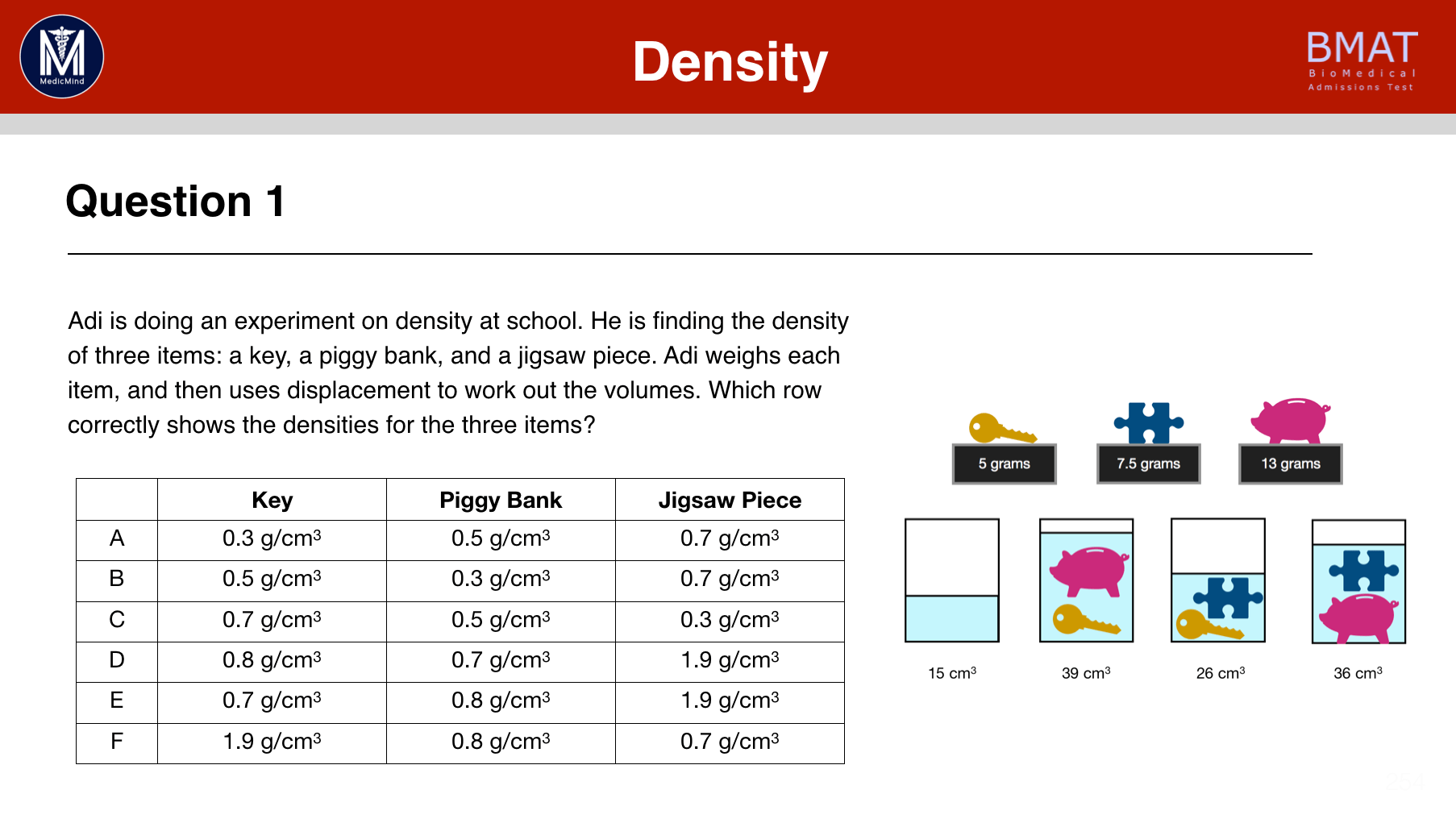
Radioactivity
There have been 9 BMAT Questions on Radioactivity. We will discuss realistic BMAT Past Paper Questions on types of radioactivity, half-life, uses and hazards of radioactivity and more.
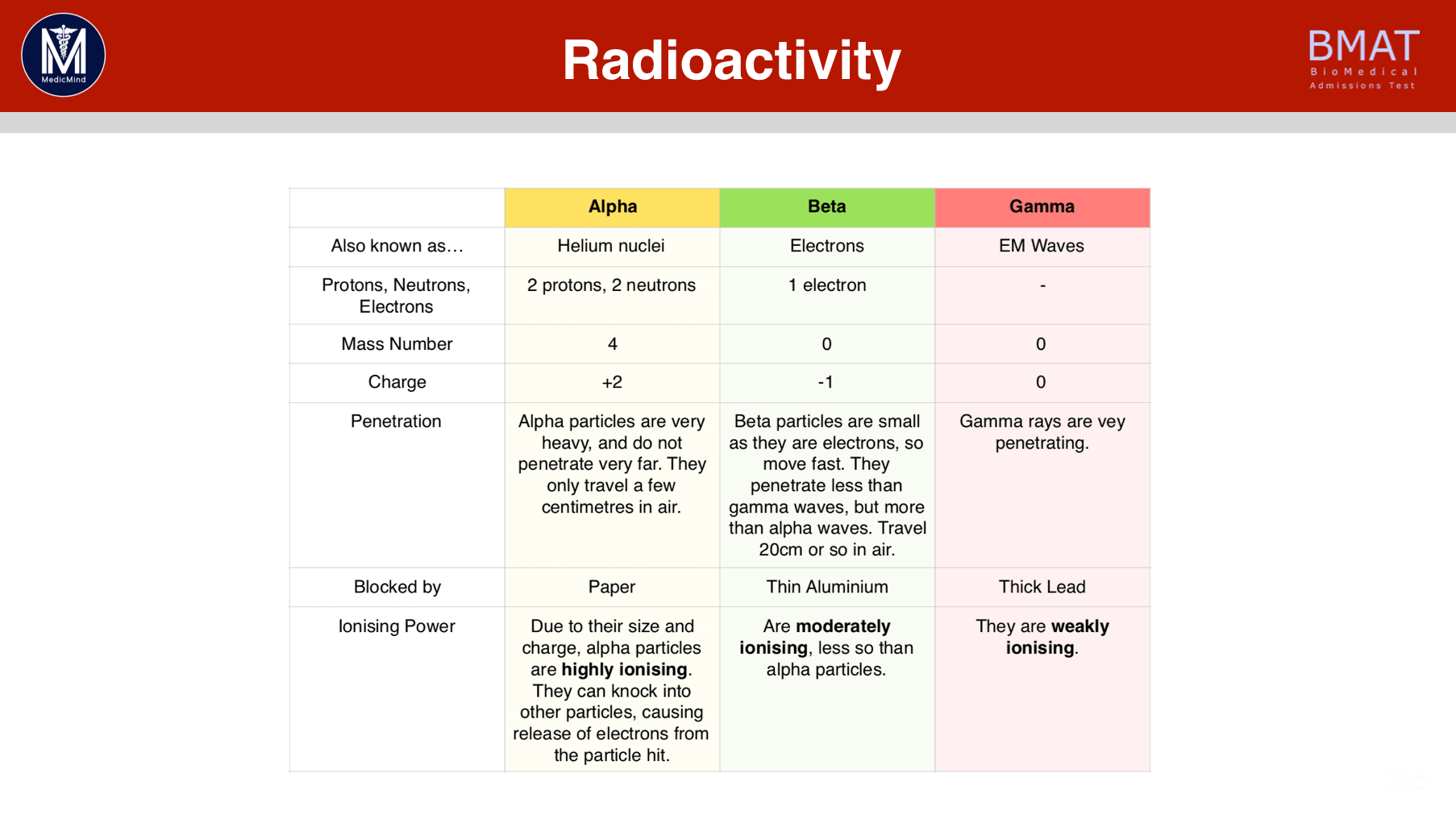

Algebra: Rearranging
There have been 19 BMAT Questions on Algebra. We will discuss realistic BMAT Past Paper Questions on rearranging and simplifying algebraic formulae
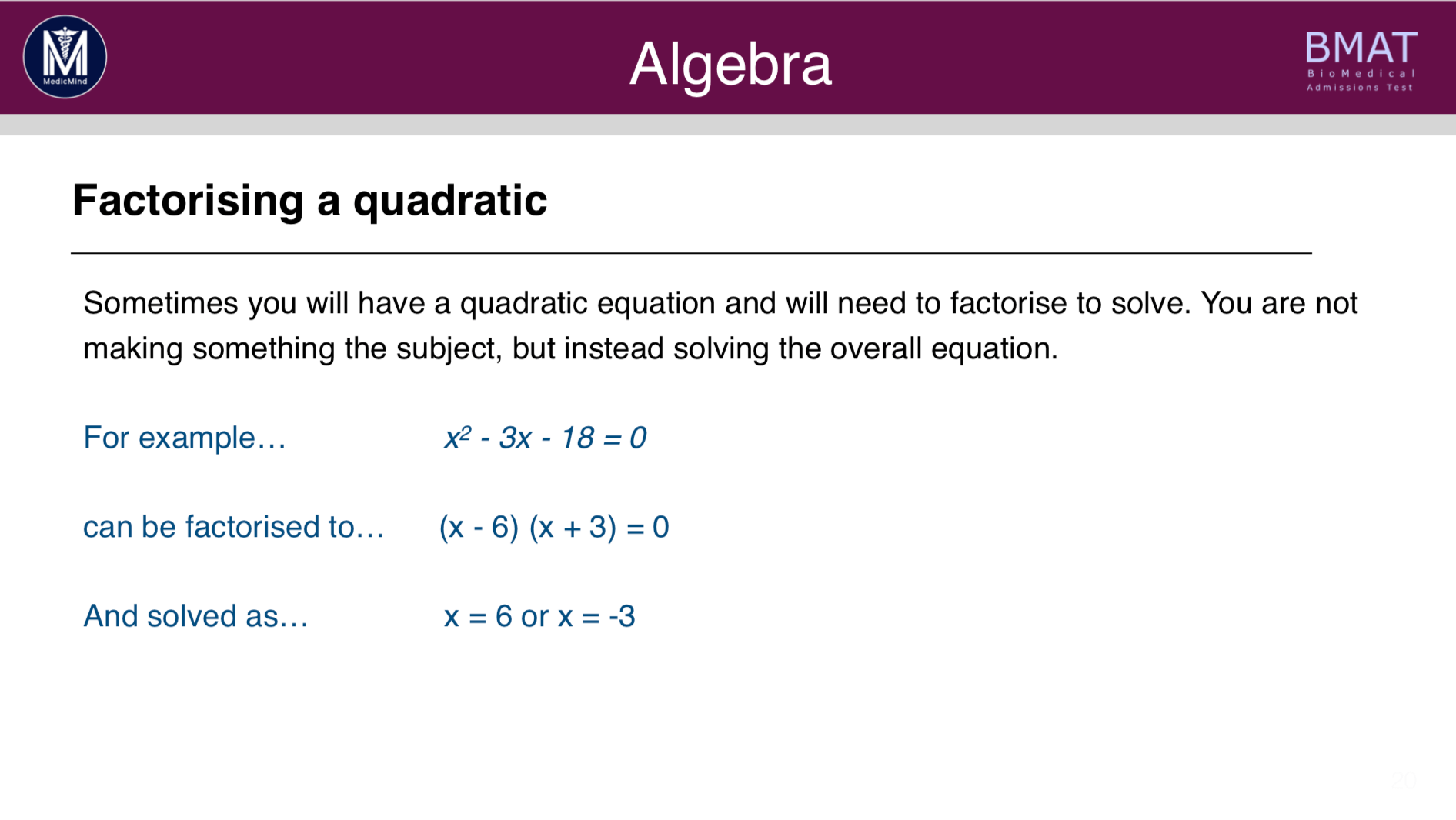
Algebra: Index laws
There have been 19 BMAT Questions on Algebra. We will discuss realistic BMAT Past Paper Questions on standard form, index rules and more.
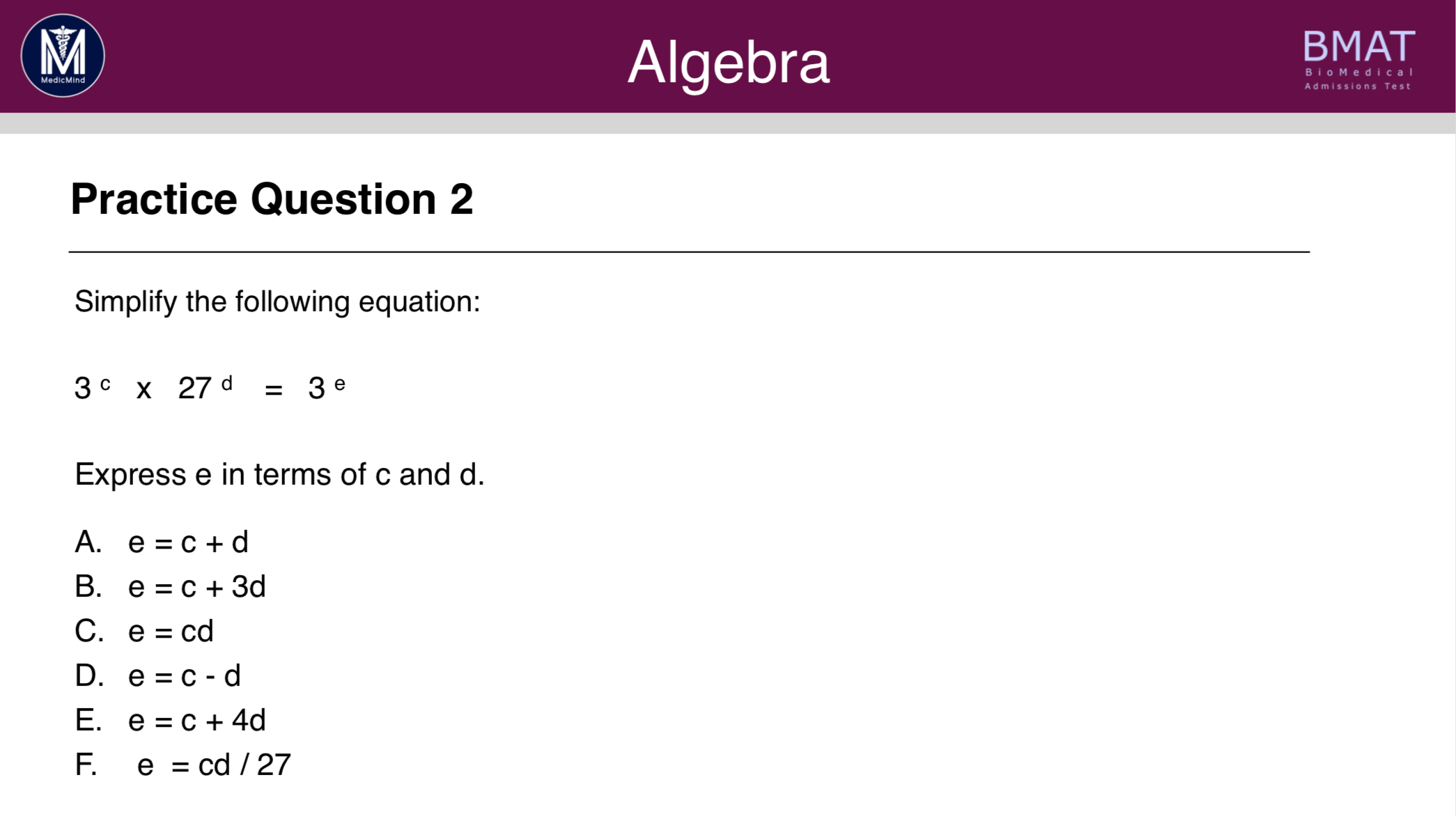
Algebra: Inequalities
There have been 19 BMAT Questions on Algebra. We will discuss realistic BMAT Past Paper Questions on inequalities signs and solving inequalities algebraically
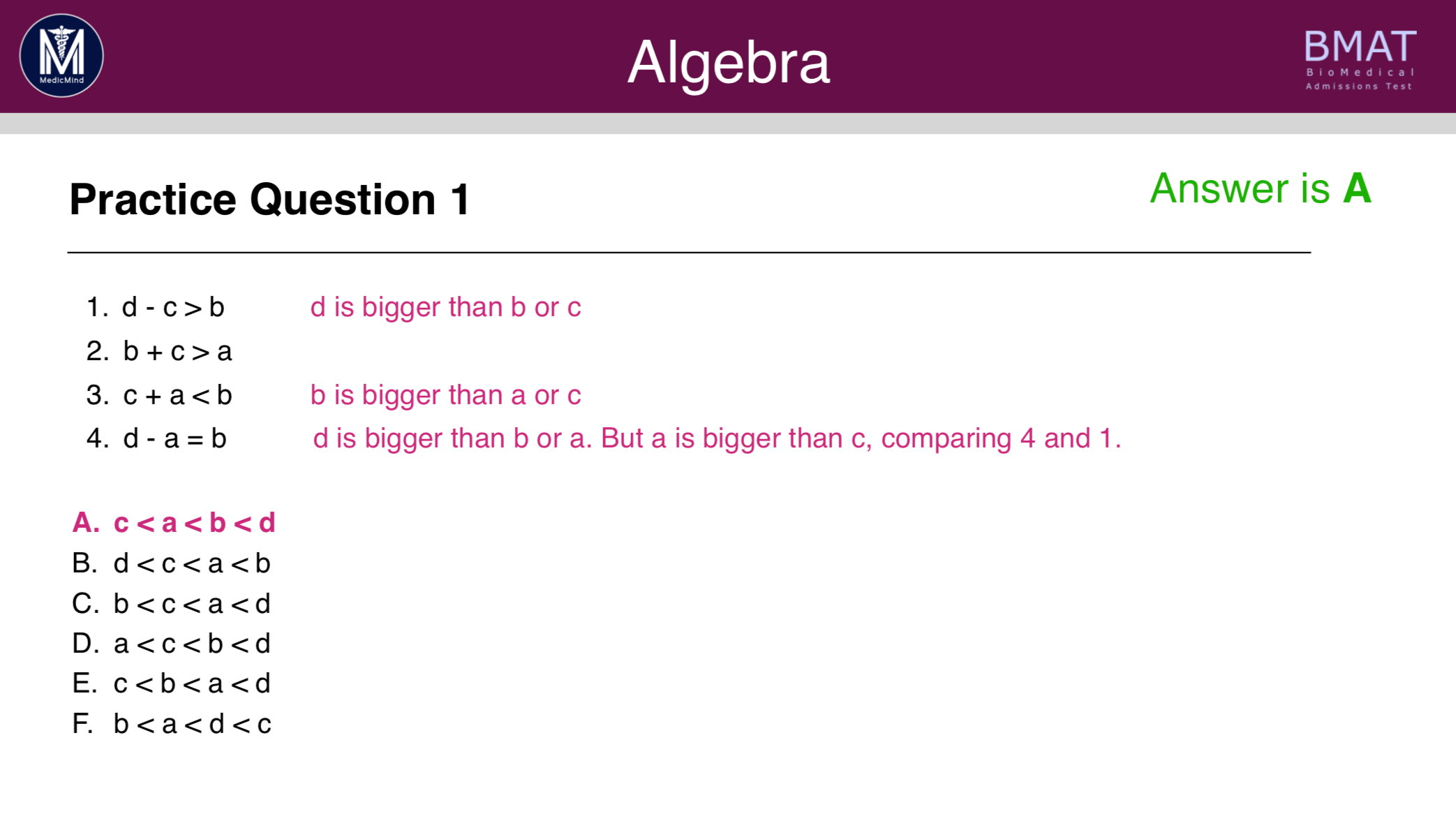
Algebra: Area & Length
There have been 19 BMAT Questions on Algebra. We will discuss realistic BMAT Past Paper Questions on areas, lengths, BMAT formulae and more
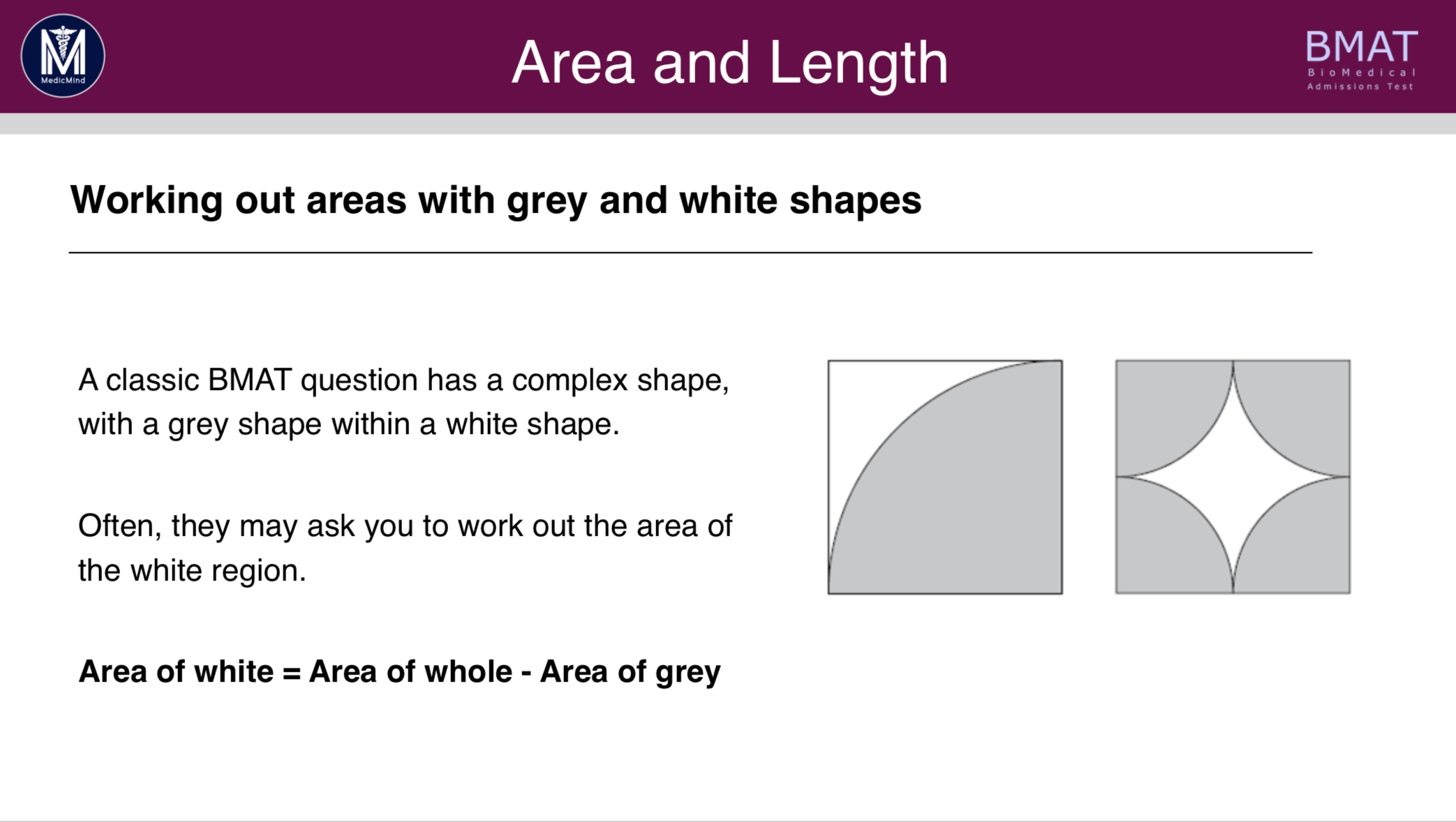
Trigonometry
There have been 4 BMAT Questions on Trigonometry. We will discuss realistic BMAT Past Paper Questions on Pythagoras, sin, cos, tan, 3D applications and more
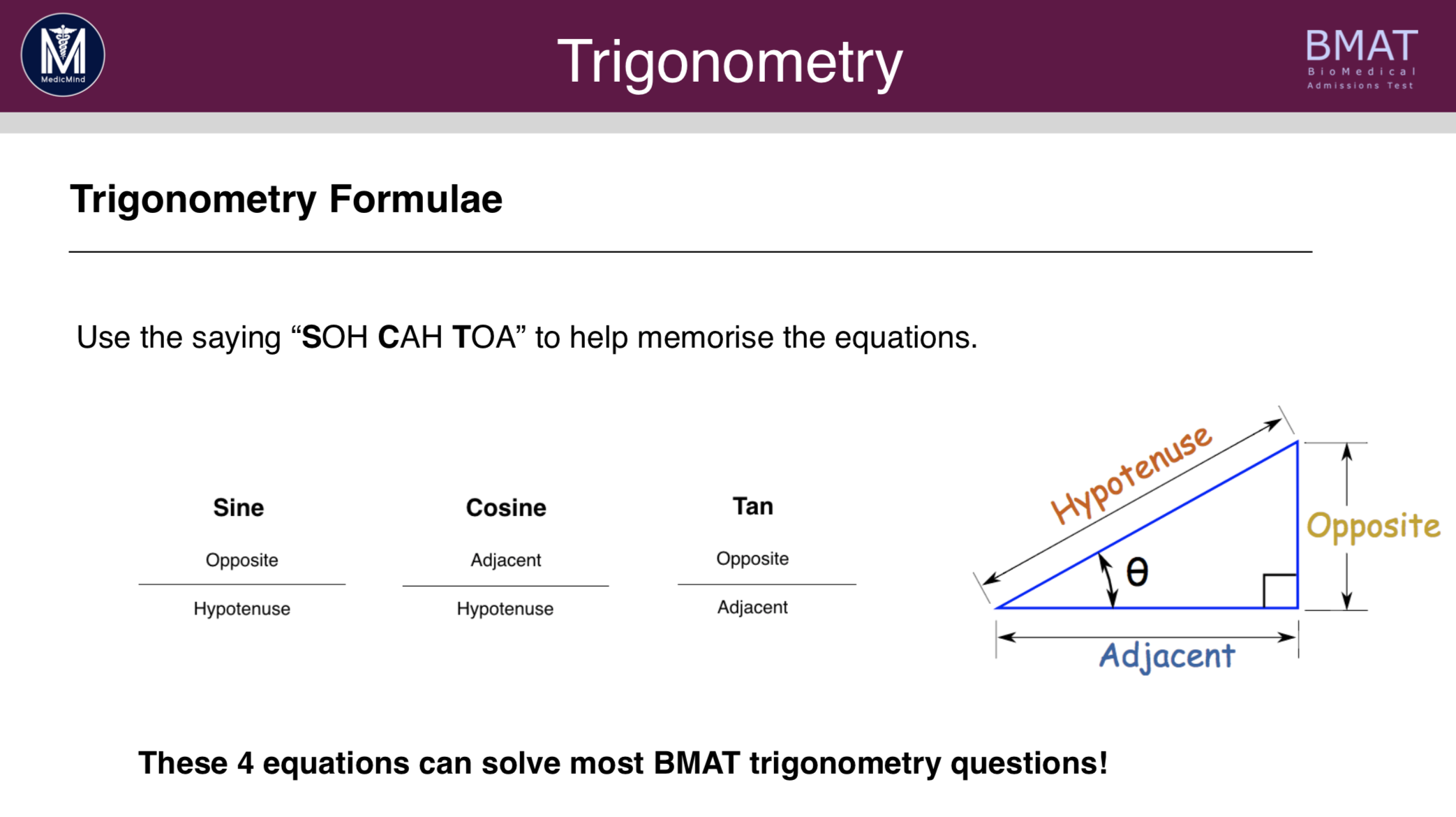
Probabilities
There have been 8 BMAT Questions on Probabilities. We will discuss realistic BMAT Past Paper Questions on estimating frequency of an event, double probabilities, mutually exclusive events and more
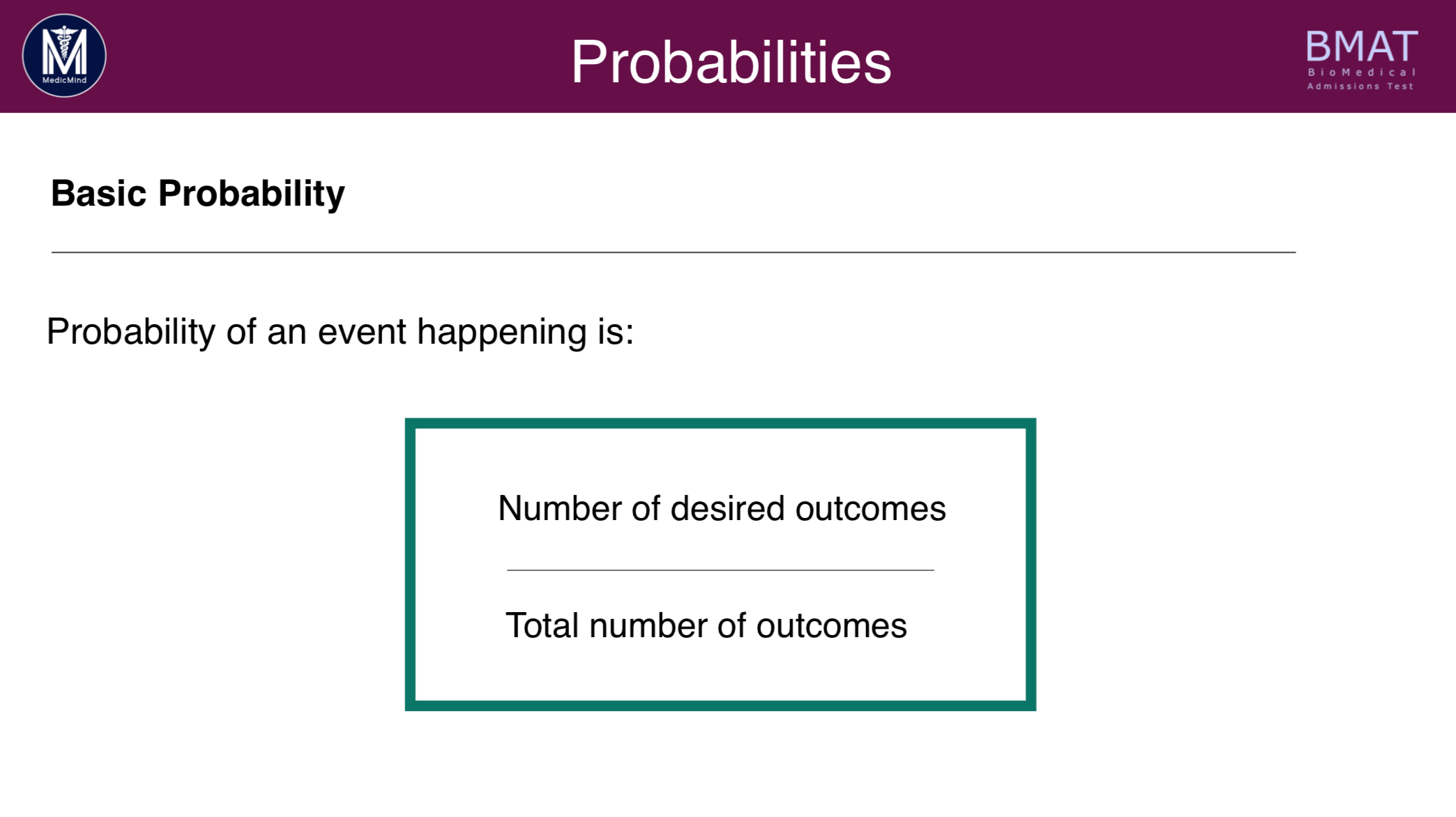
There have been 2 BMAT Questions on Ratios. We will discuss realistic BMAT Past Paper Questions on simplifying and using ratios in different scenarios
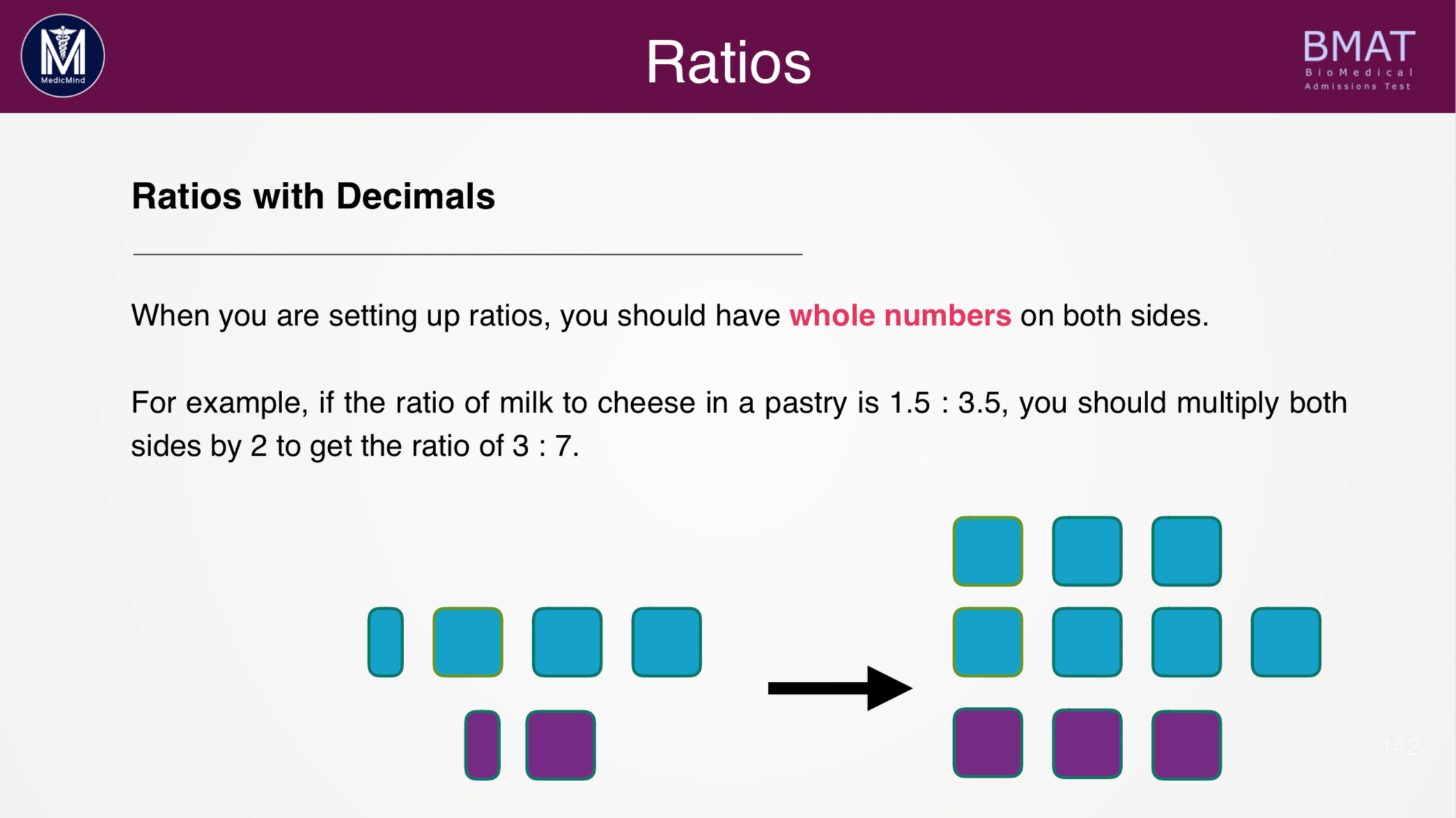
Graphs and Gradients
There have been 2 BMAT Questions on Graphs. We will discuss realistic BMAT Past Paper Questions on graphical data, y = mx + c, intersections of straight lines and more
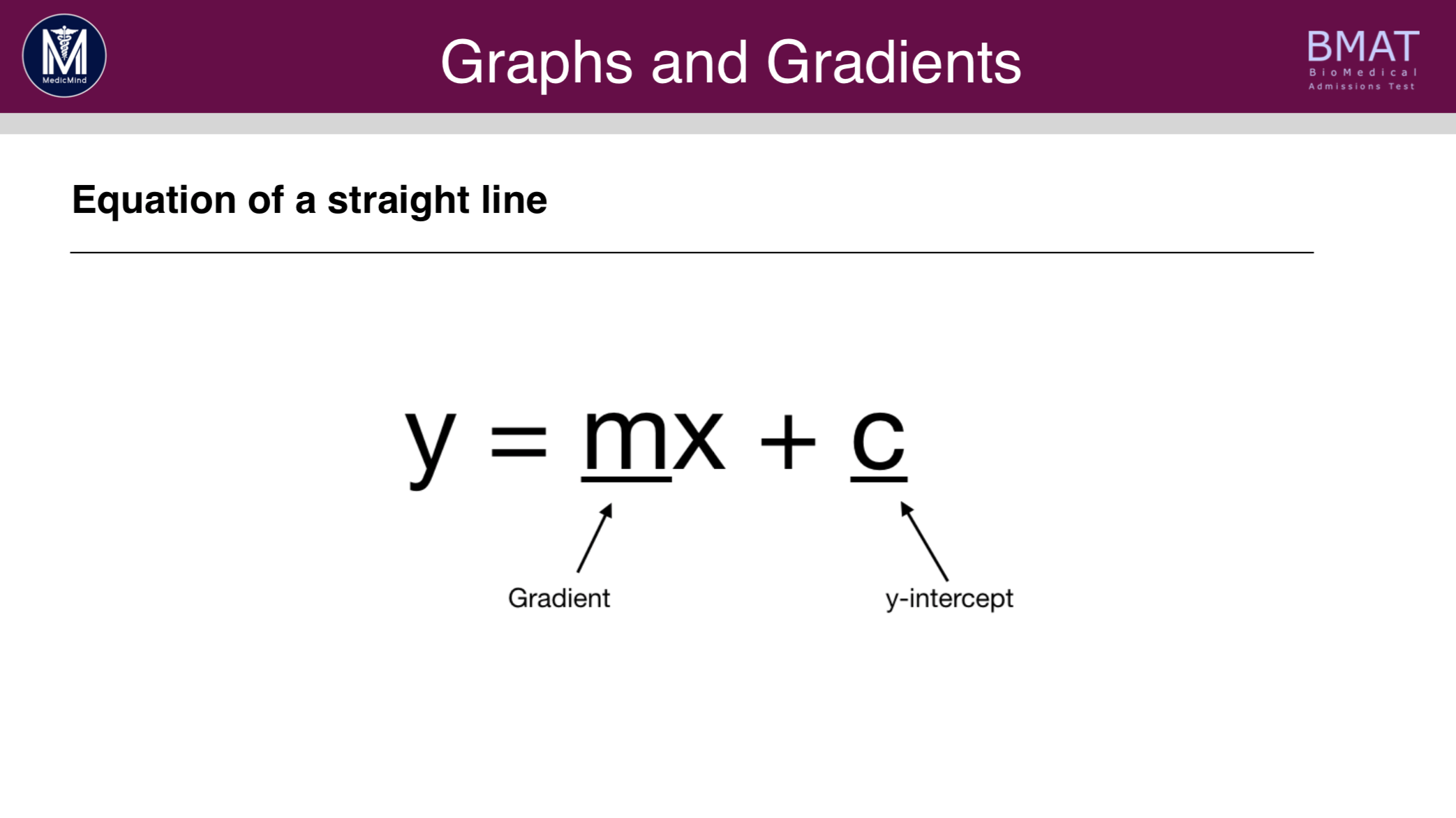
There have been 3 BMAT Questions on Means. We will discuss realistic BMAT Past Paper Questions on mean, median, mode, modal class, range, quartiles and more
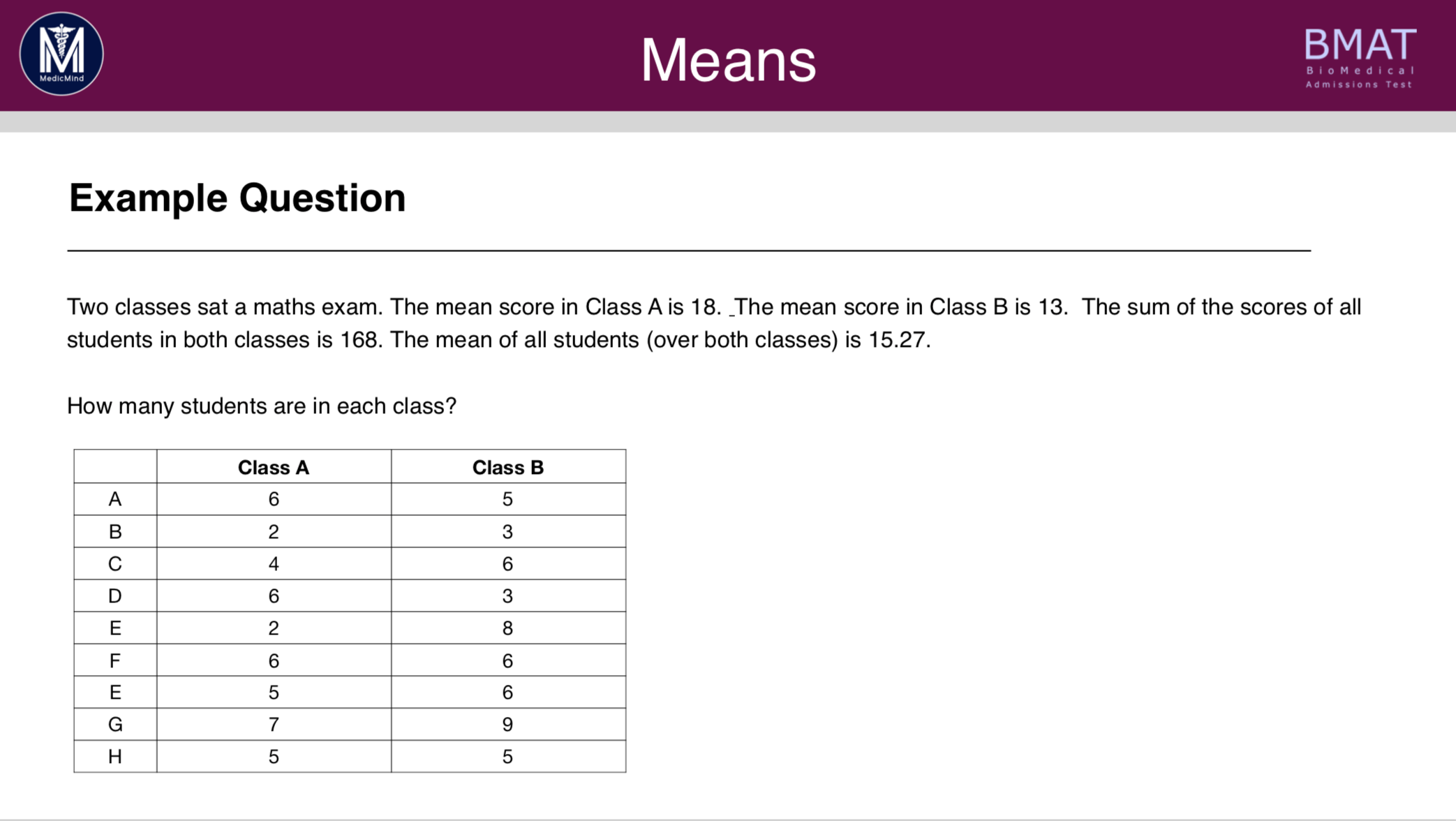
For many, writing a scientific essay is a big challenge. That’s made harder by being restricted to one side of A4 only. We’ll show you how to plan an essay, good/bad examples and give our top tips for succeeding.
- Lesson 2 Marking Section 3
- Lesson 3 Choosing Your Question
- Lesson 4 Planning Your Essay
- Lesson 5 Essay Content
- Lesson 6 Writing Your Essay
- Lesson 7 Proofing Your Essay
- Lesson 8 Essay Tips 1-5
- Lesson 9 Essay Tips 6-10
- Lesson 10 Essay Tips 11-15
- Lesson 11 Essay Plans 2003-2006
- Lesson 12 Essay Plans 2007-2010
- Lesson 13 Essay Plans 2011-2014
- Lesson 14 Essay Plans 2015-2019
- Lesson 15 Example Essays 1-4
- Lesson 16 Example Essays 5-9
- Lesson 17 Example Essays 10-15
To begin with, we give you a short overview of Section 3, discussing the various question styles and introduce the challenges that come with it.
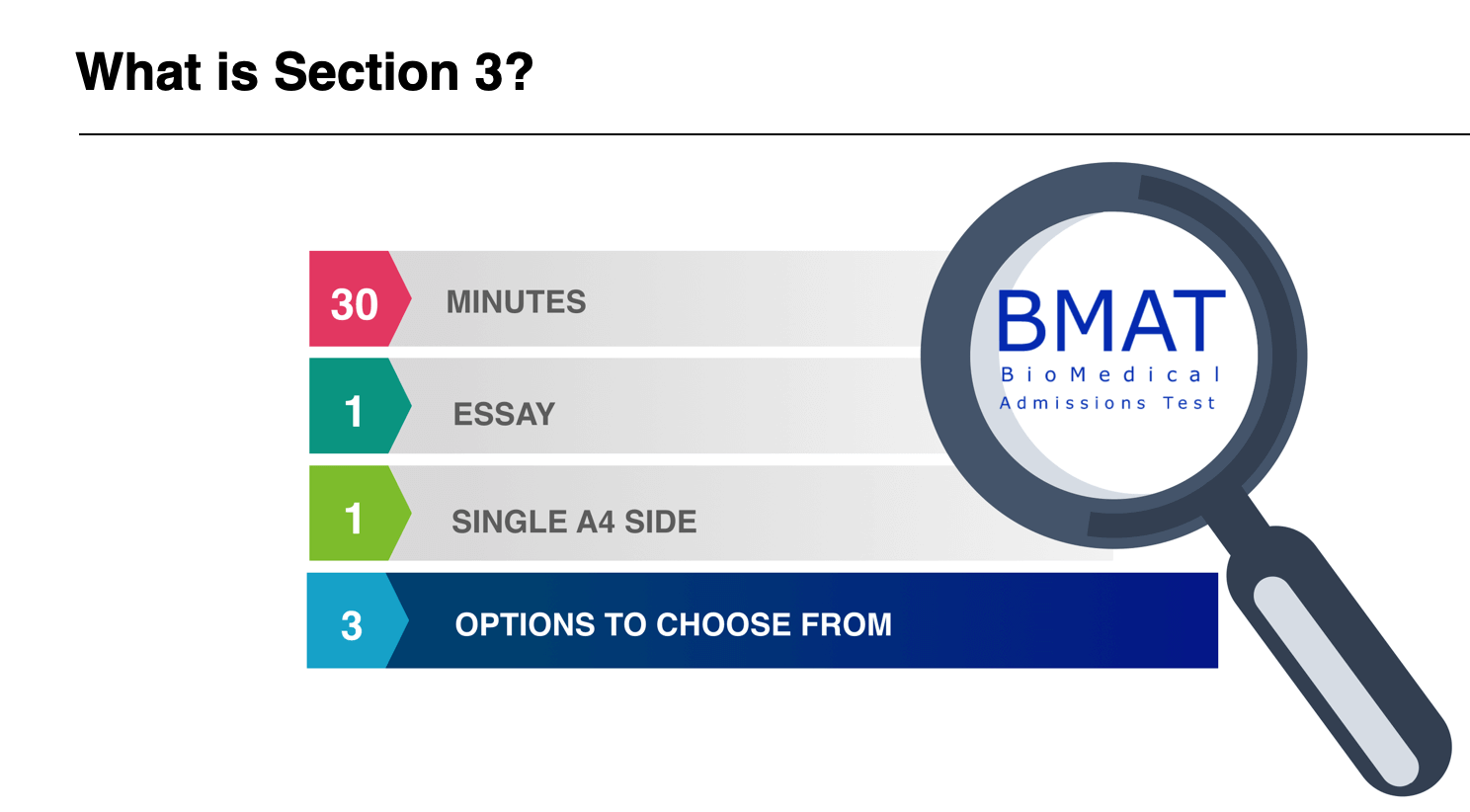
Marking Section 3
We want to get into the Examiner’s head and understand what they are looking for in an ideal candidate to give you the best shot at succeeding.
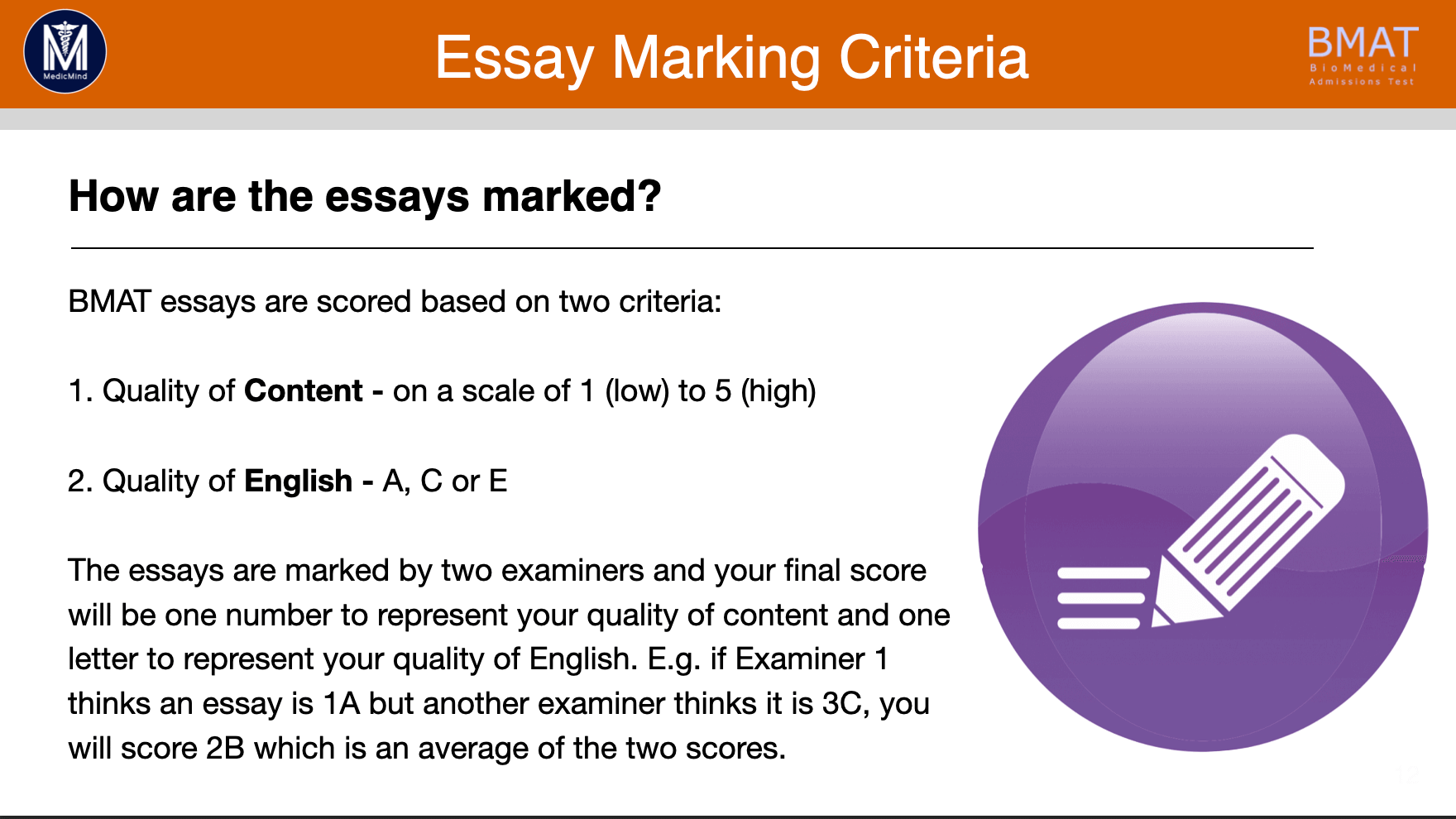
Choosing Your Question
This is a big dilemma for many – You might find you’re better at some BMAT Essay questions compared to others so we help you pick what works for you.
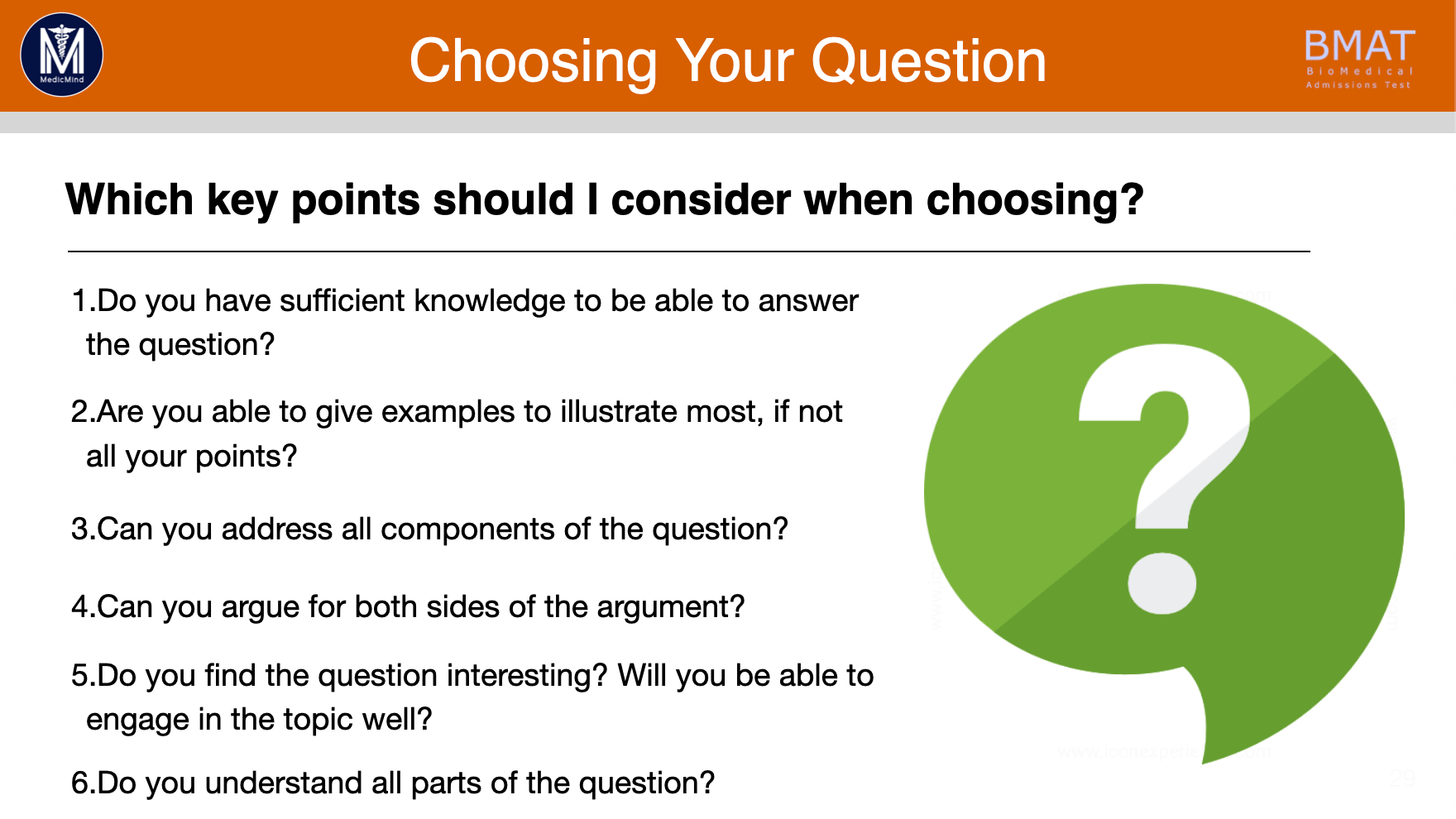
Planning Your Essay
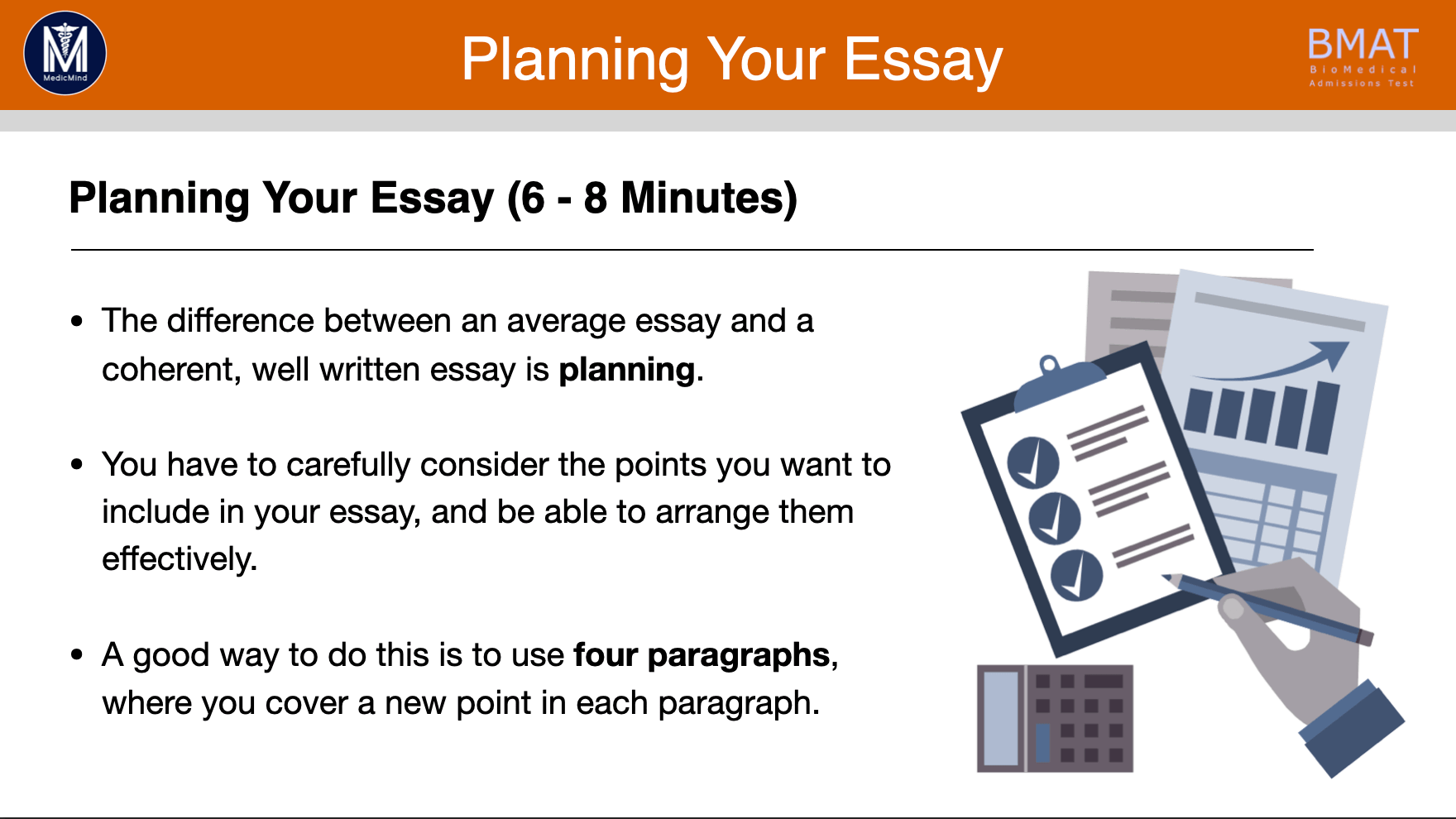
Essay Content
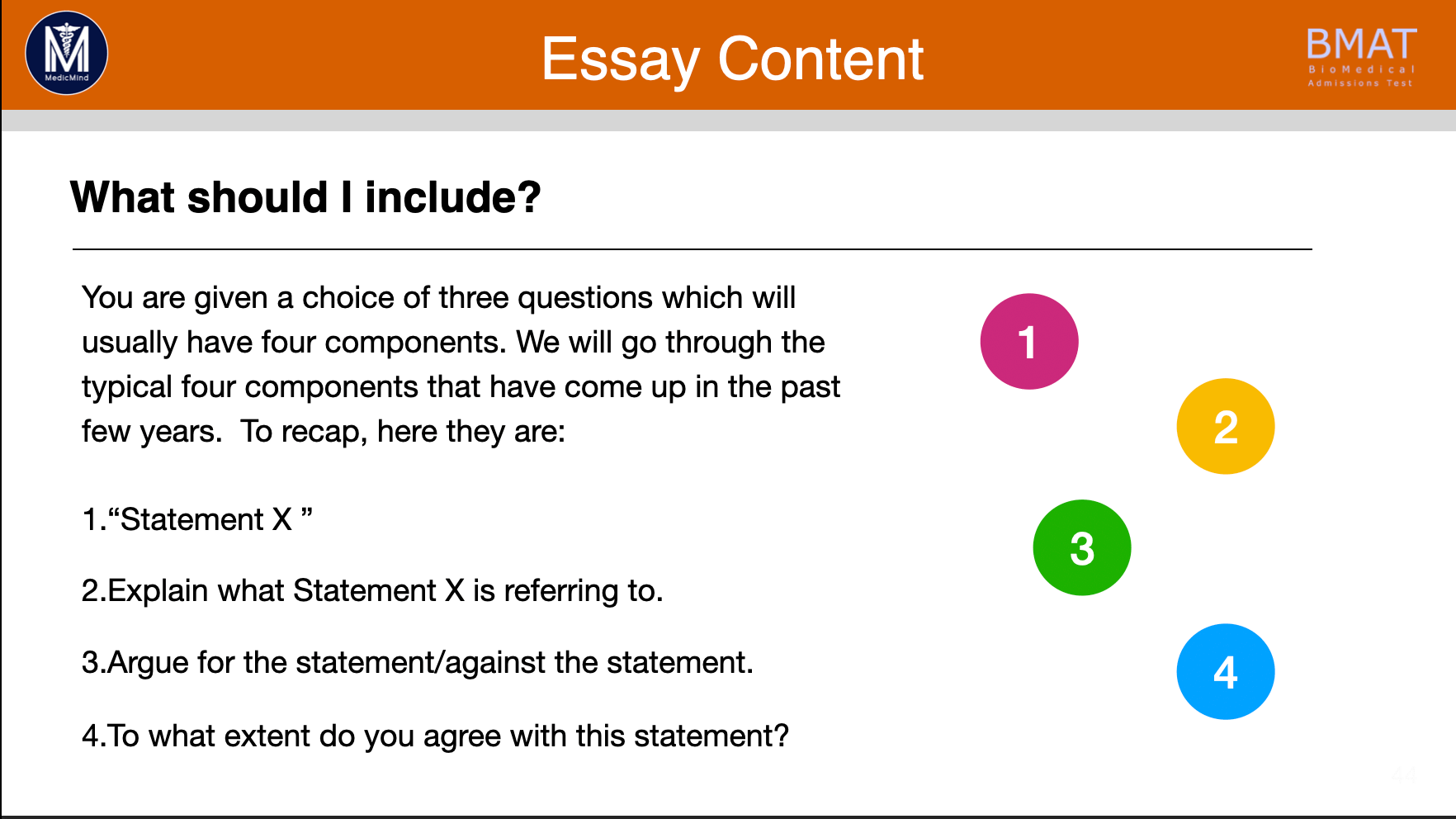
Writing Your Essay
This will take up the bulk of your time and it’s important to stick to your plan and not waffle or write unnecessary information.
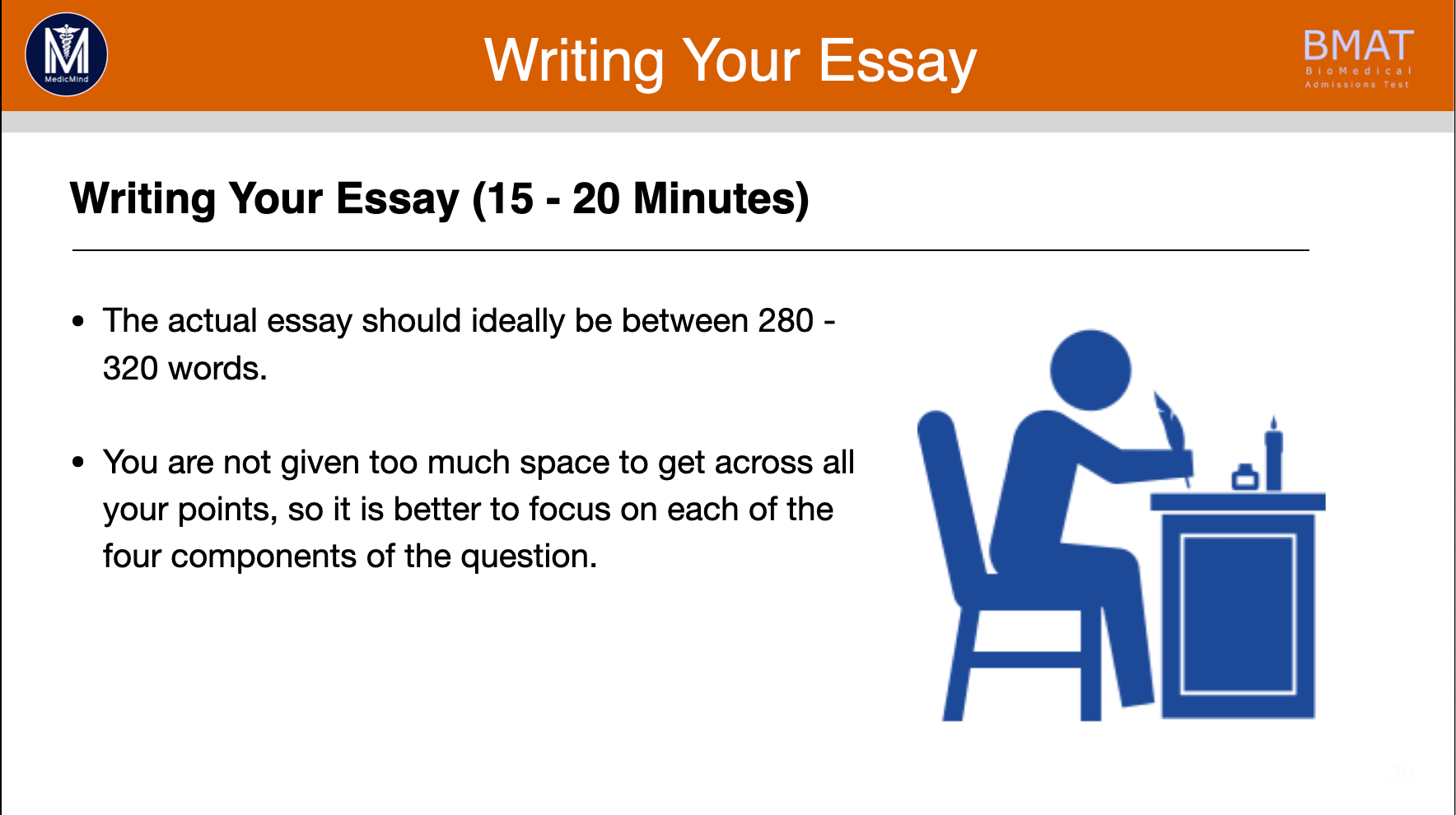
Proofing Your Essay
This is the fourth stage of the BMAT essay but the most important as you need to ensure you have secured that “A” for Grammar and Communication.
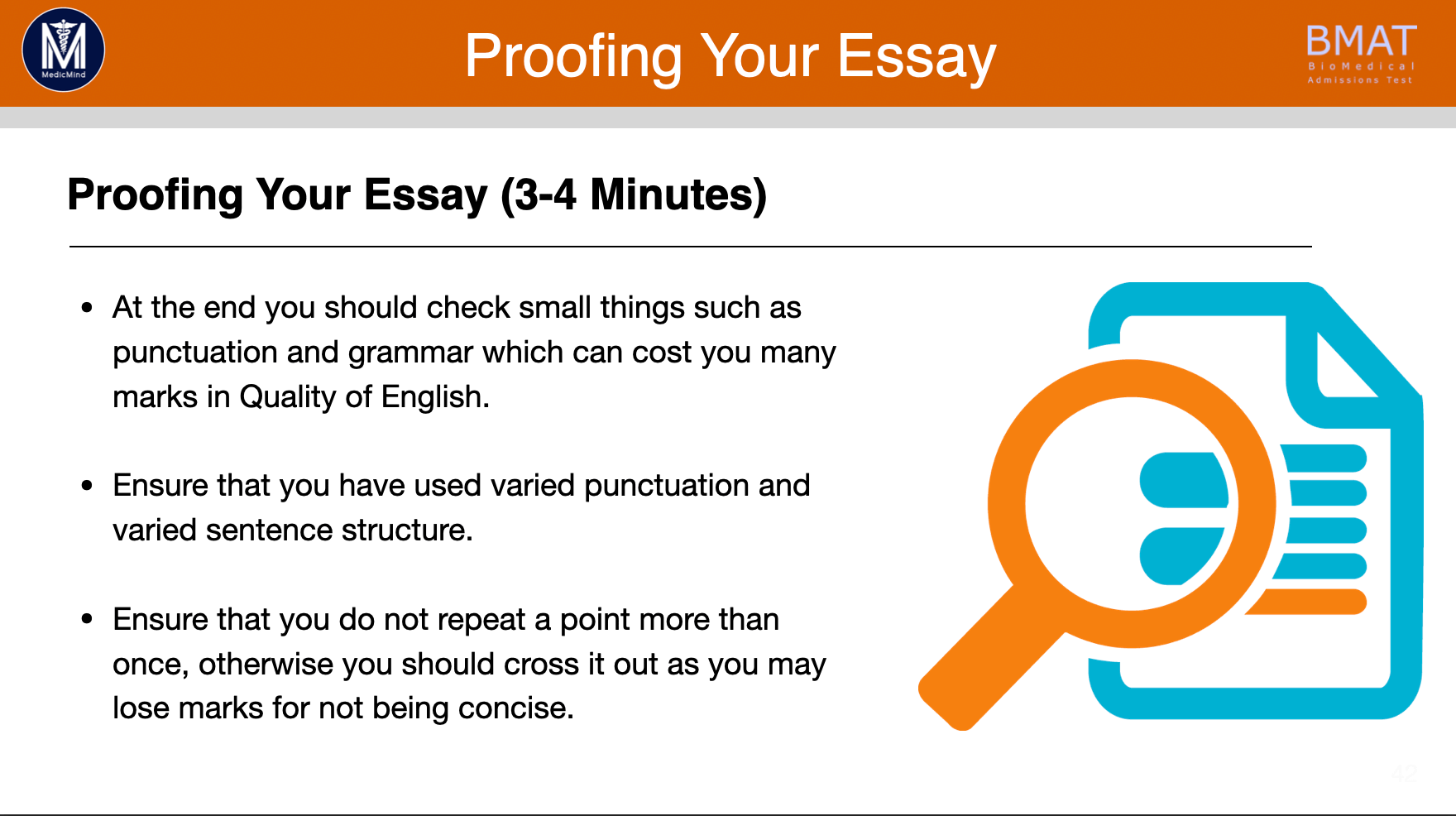
Essay Tips 1-5
Learn Tips from BMAT Essay Experts who scored above 4.5A in their BMAT Exam and become confident when it comes to your BMAT Test Day.
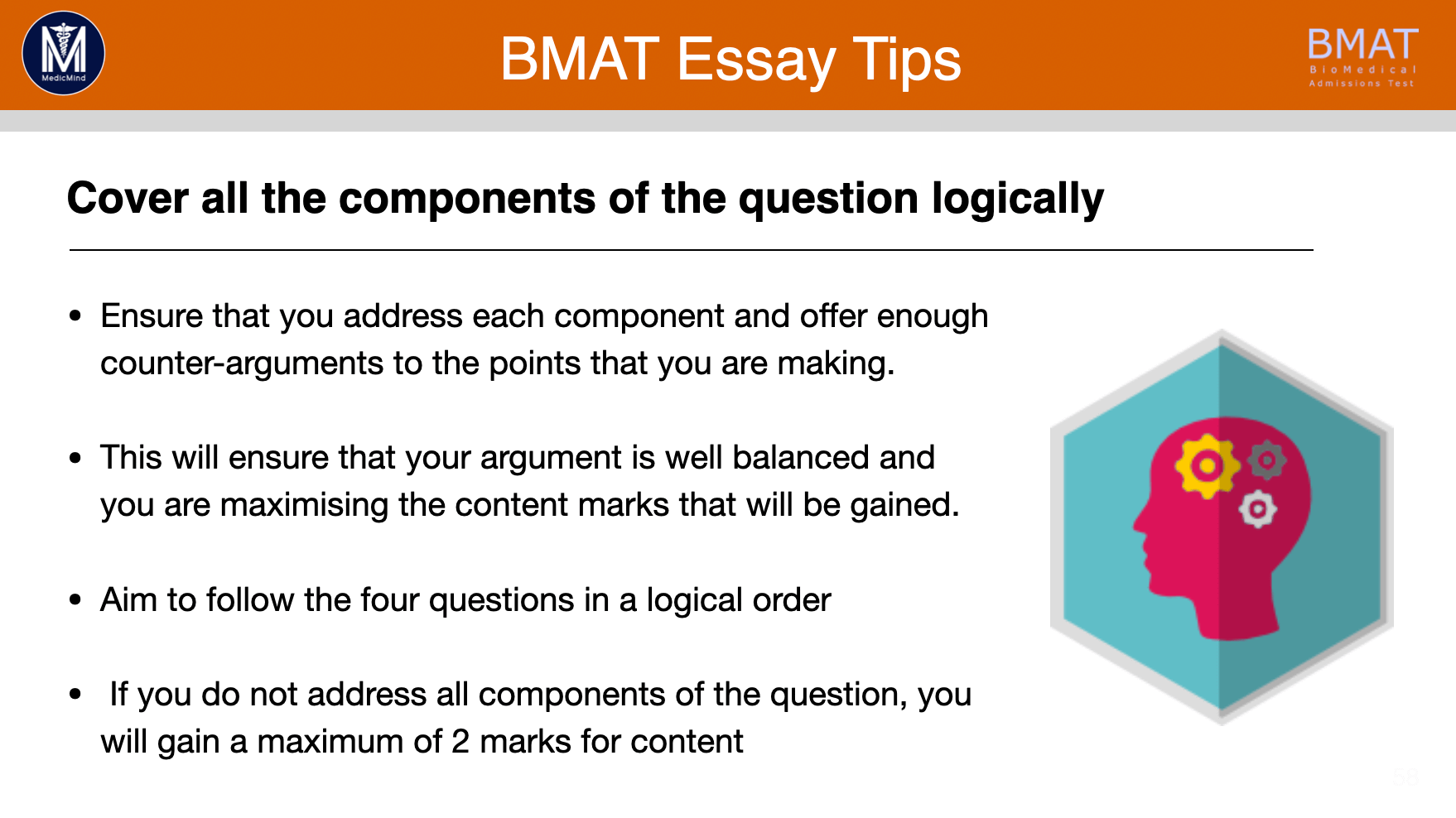
Essay Tips 6-10
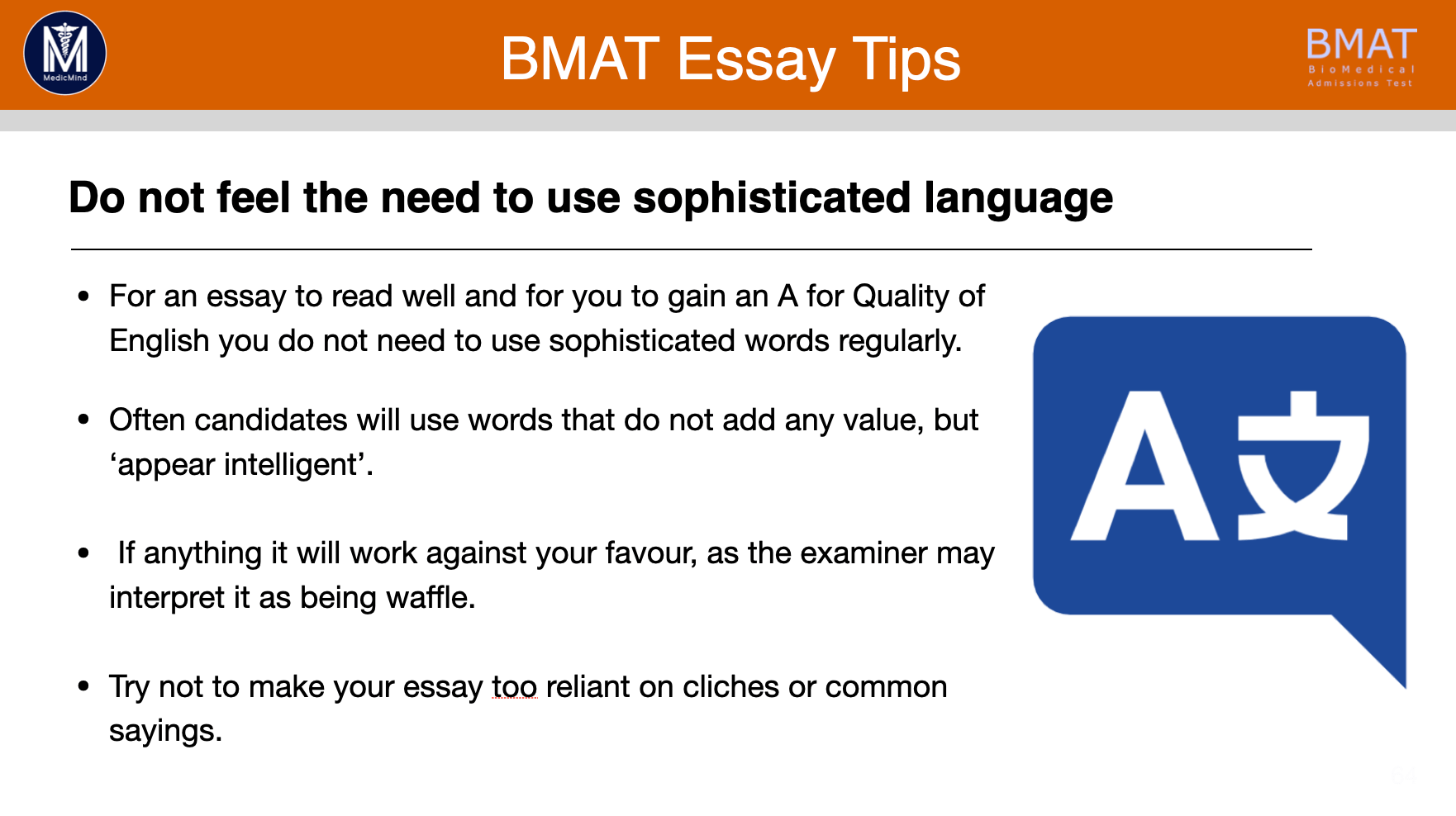
Essay Tips 11-15
Learn Tips from BMAT Essay Experts who scored above 4.5A in their BMAT Exam and become confident when it comes to your BMAT Test Day. Ace your BMAT today with Medic Mind
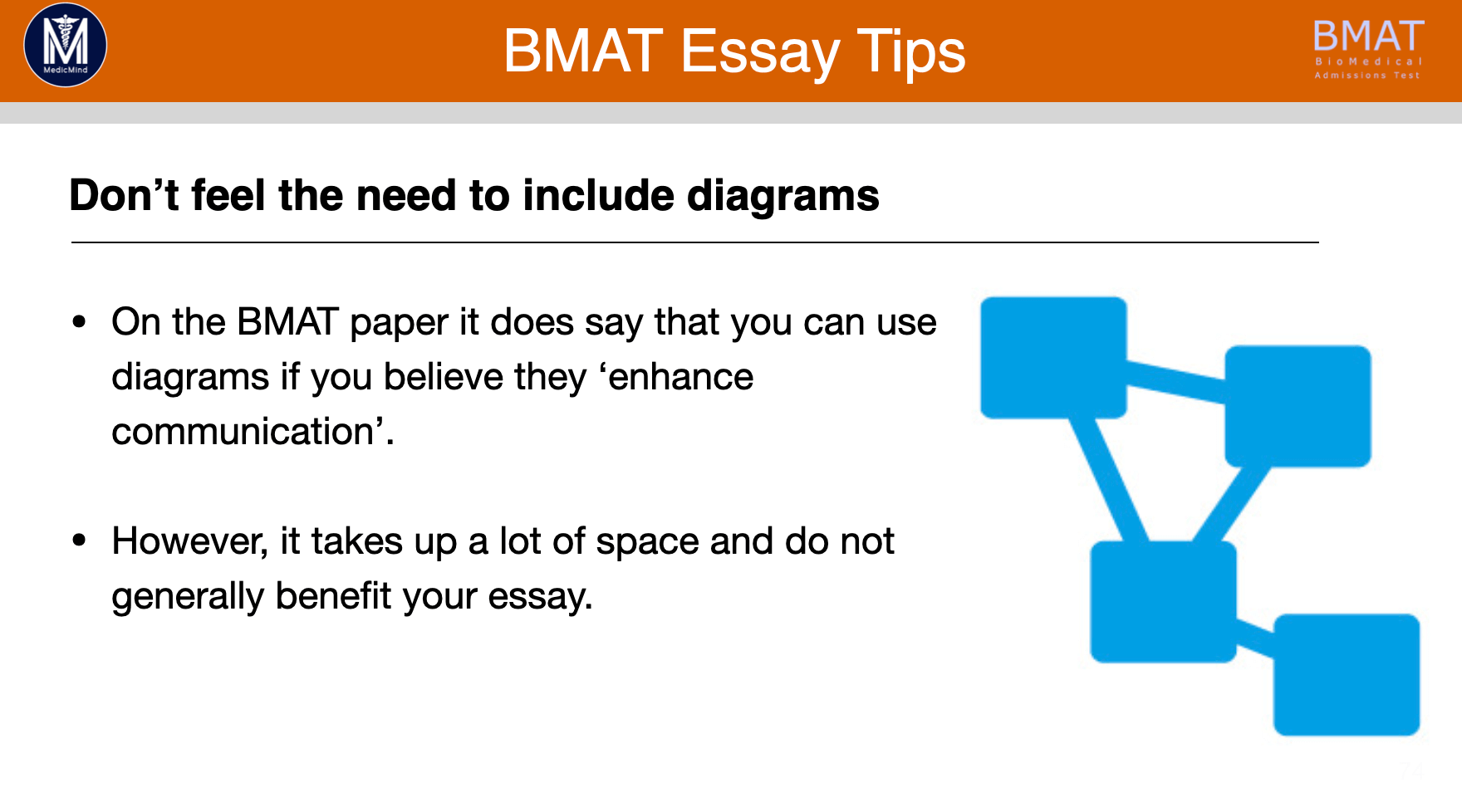
Essay Plans 2003-2006
We have written detailed essay plans for EVERY BMAT Essay that has ever come up from past BMAT Papers 2003-2019 so use these to either help you plan an essay or mark one you’ve done!
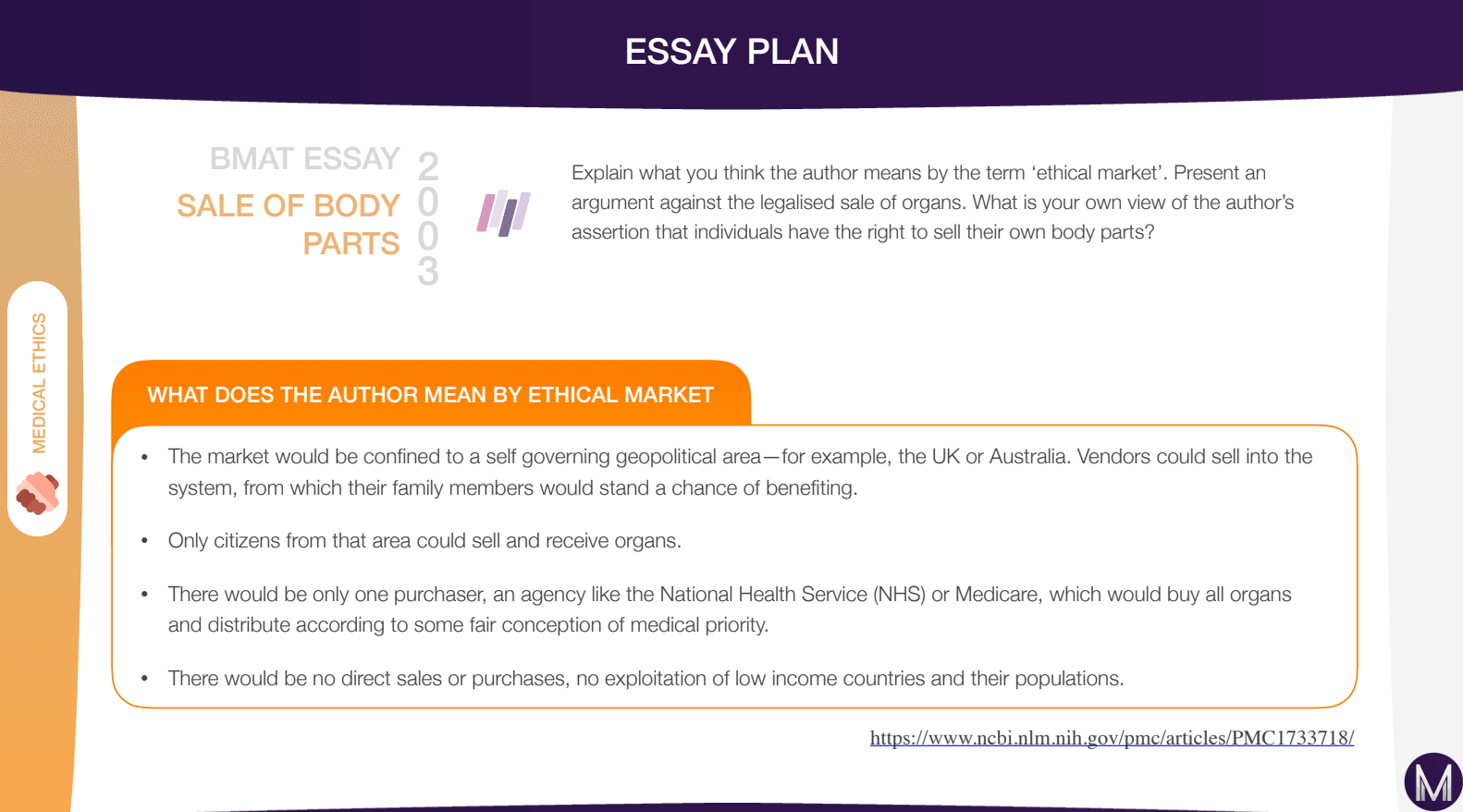
Essay Plans 2007-2010
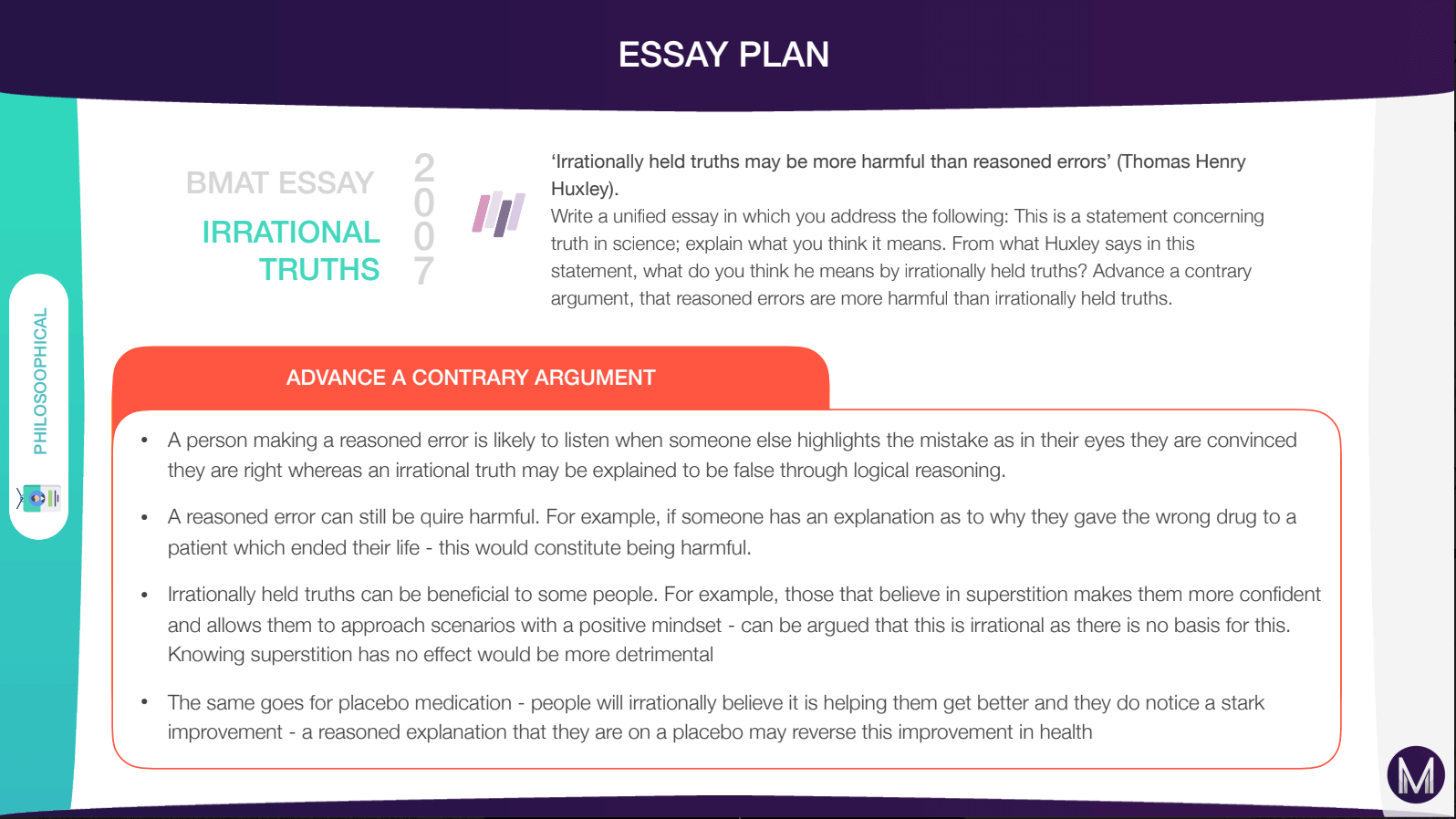
Essay Plans 2011-2014
We have written detailed essay plans for EVERY BMAT Essay that has ever come up from past BMAT Papers in 2003-2019 so use these to either help you plan an essay or mark one you’ve done!
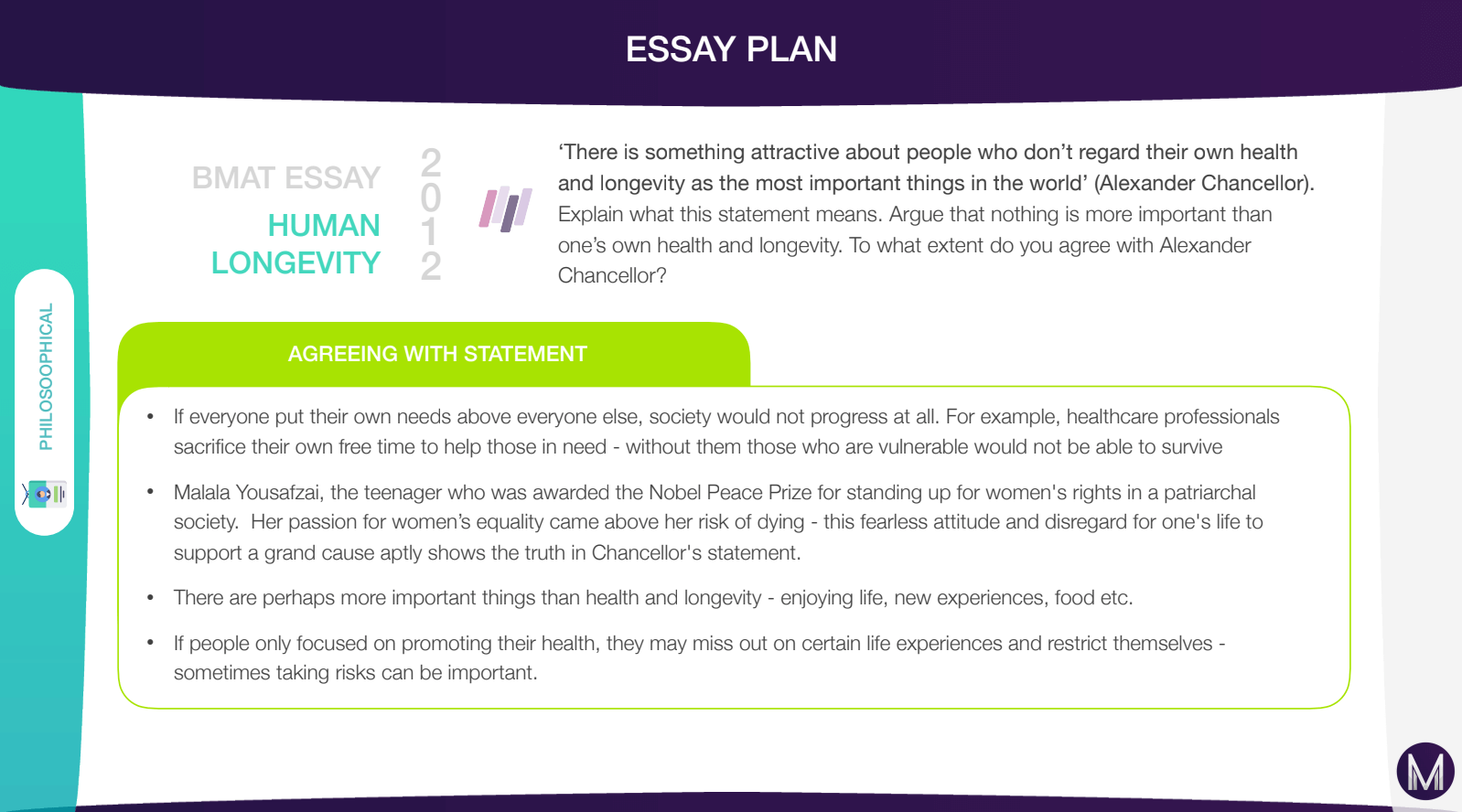
Essay Plans 2015-2019
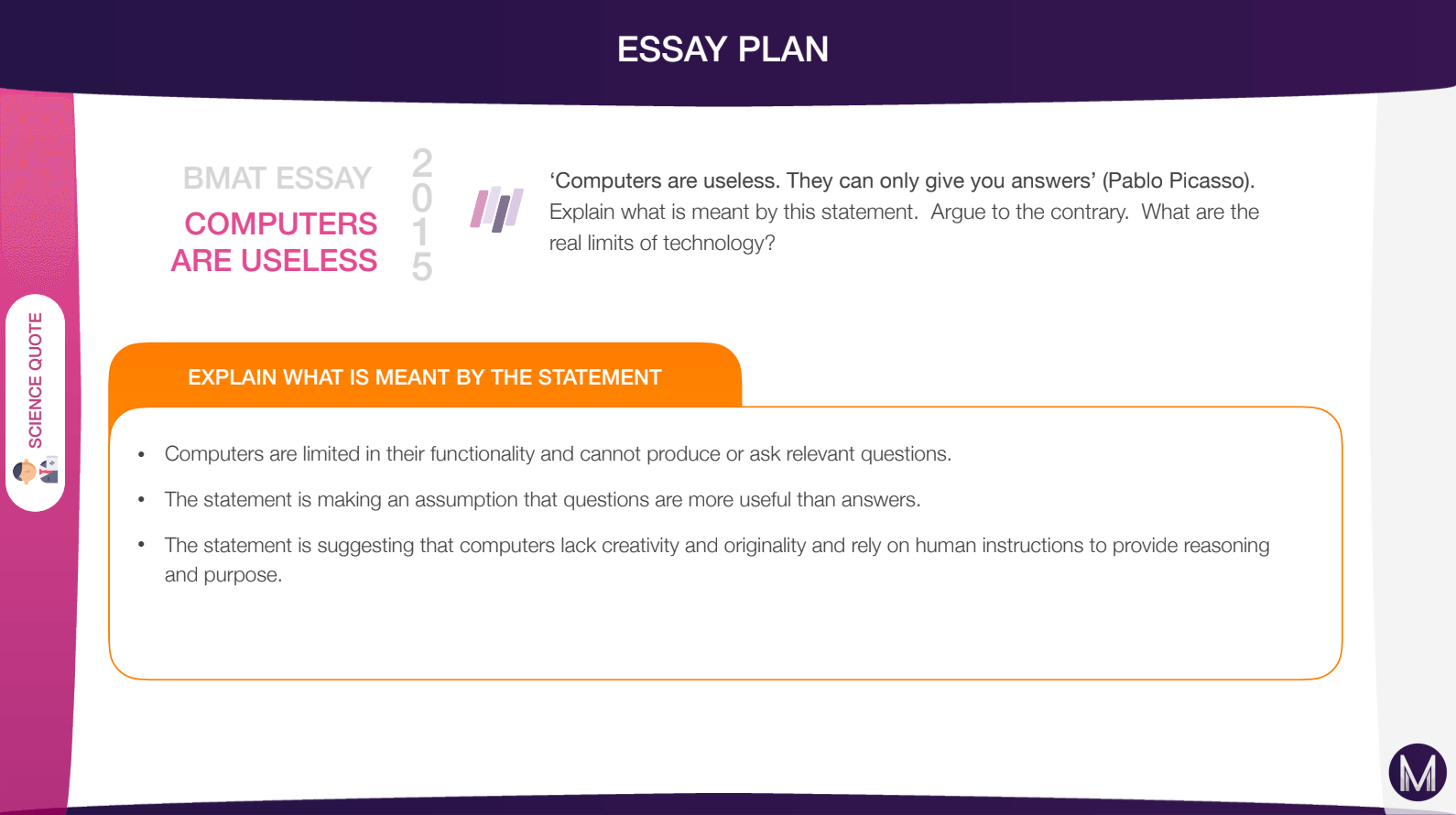
Example Essays 1-4
Here we go through some more essays both good and bad and show you areas students go wrong but also give you key techniques to take away. This will be based on previous BMAT Past Papers and BMAT Past Essays.
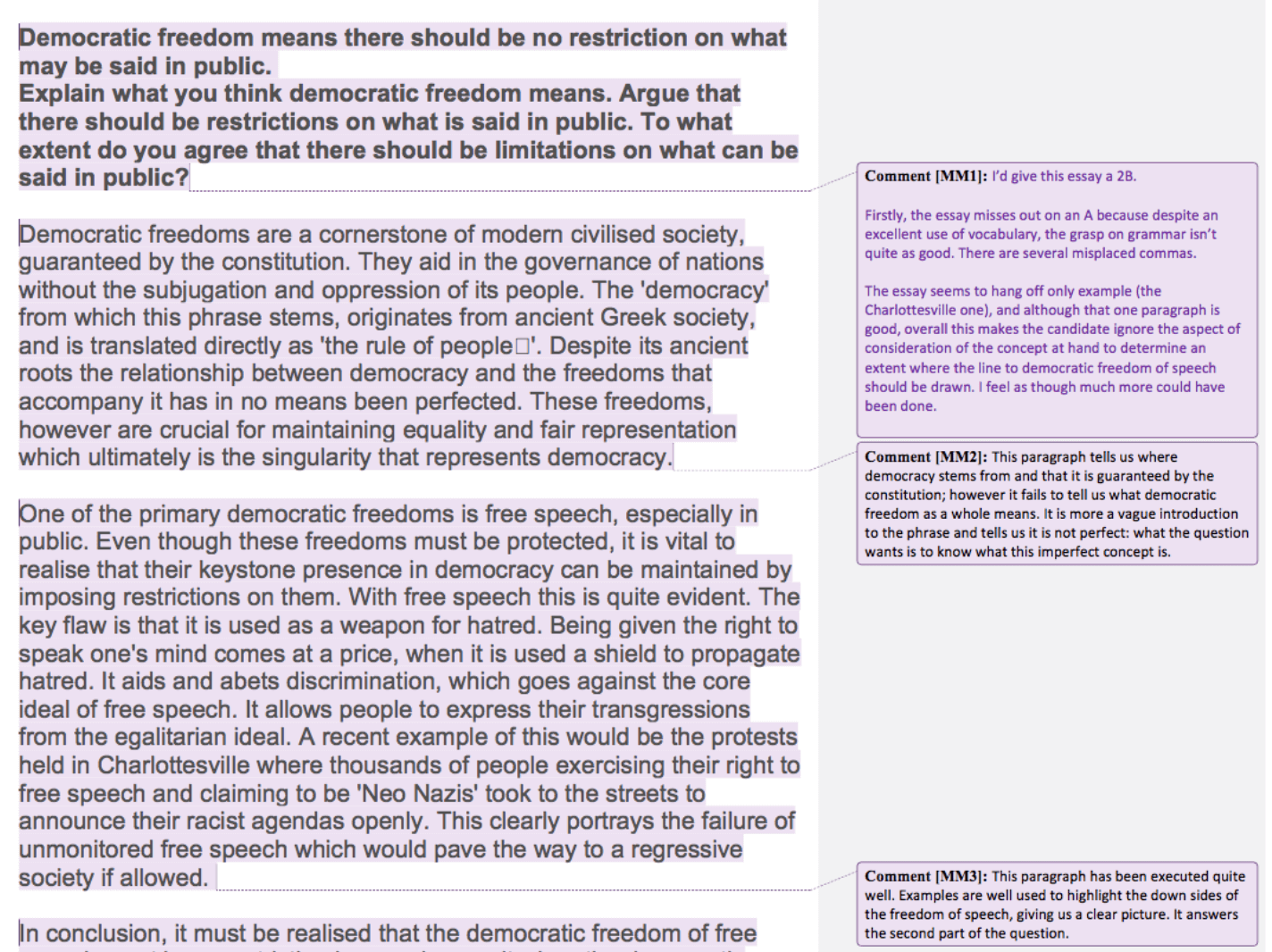
Example Essays 5-9
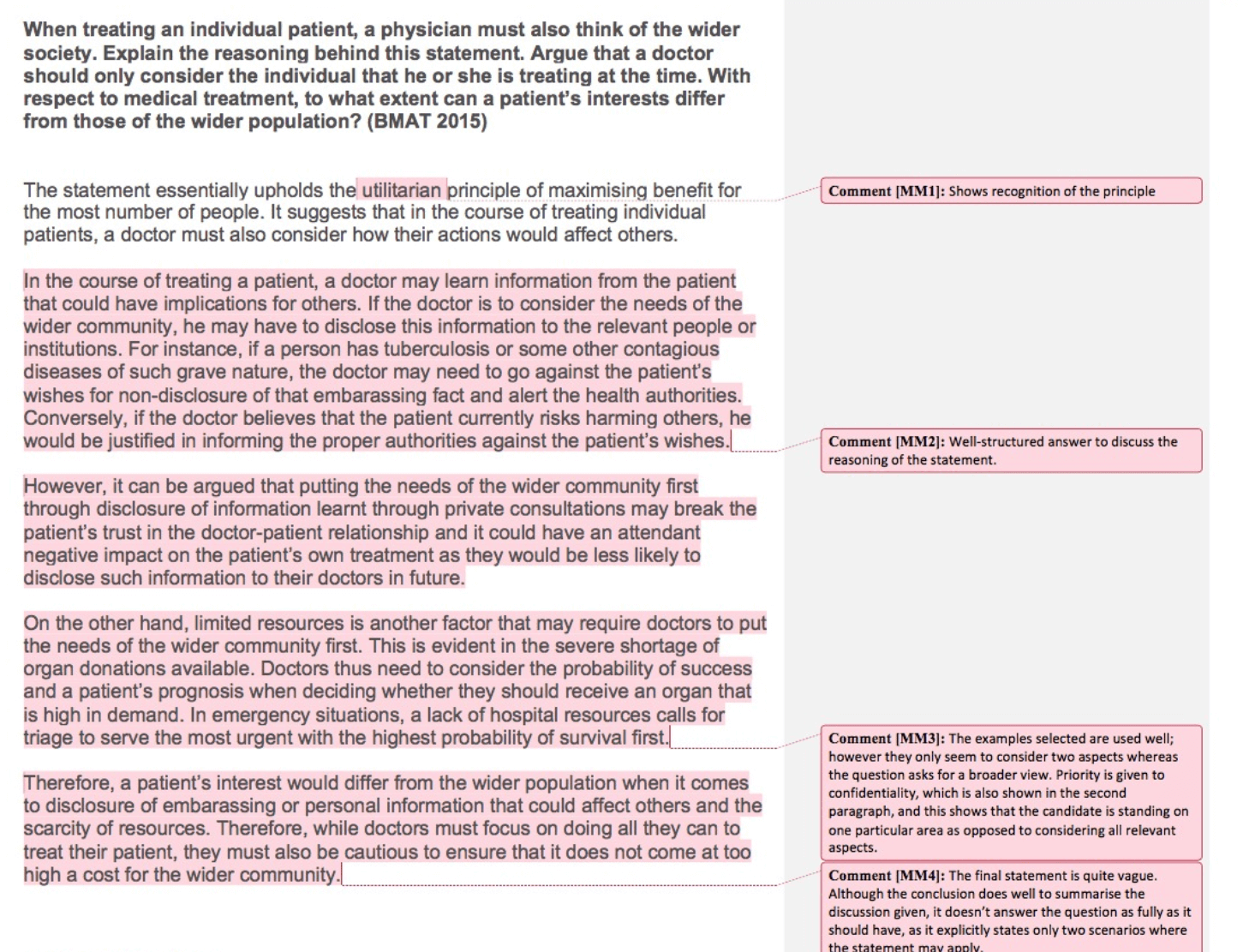
Example Essays 10-15
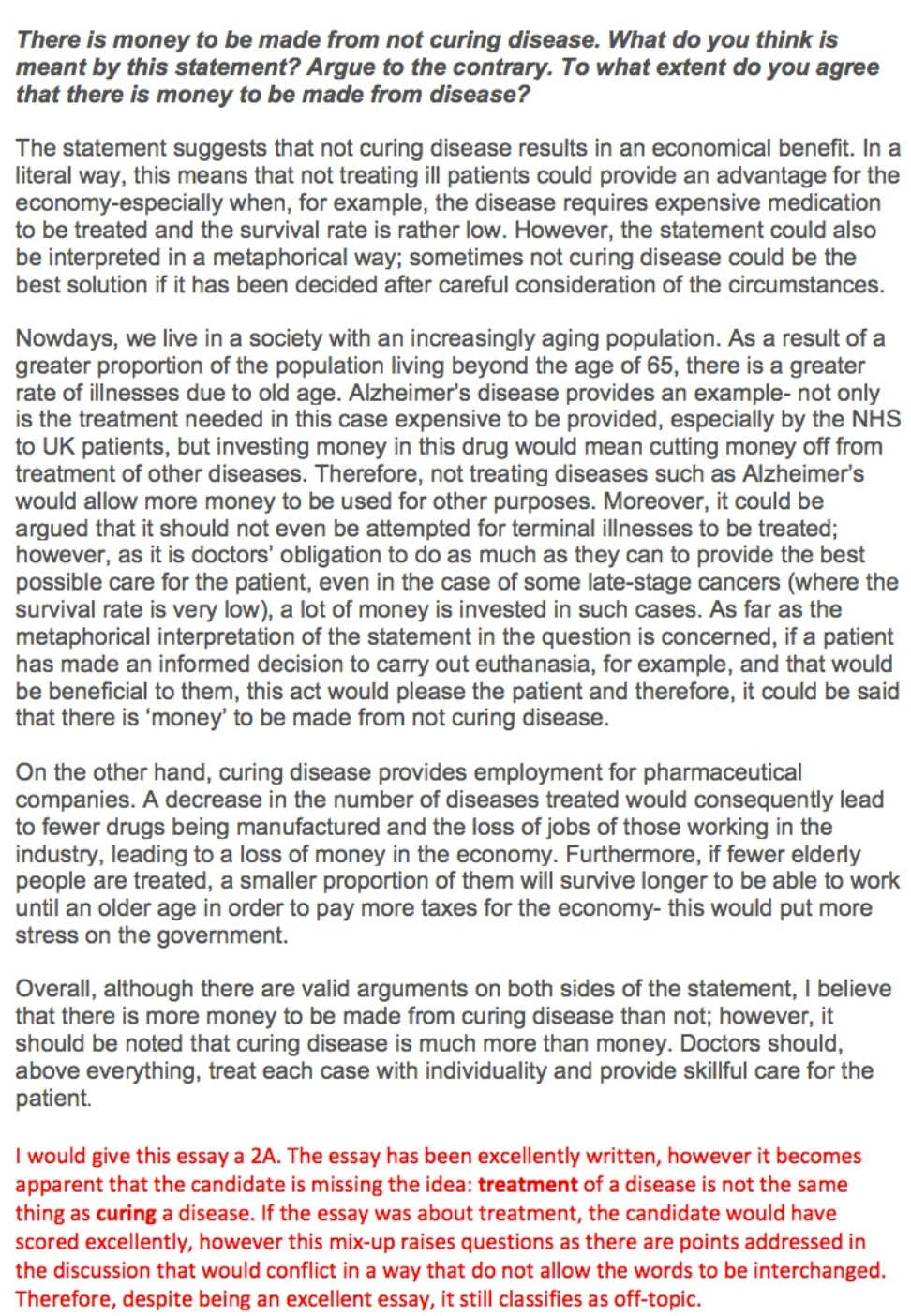
Ready to go? Start in 20 seconds.
Upgrade to 1-to-1 tutoring.
We highly recommend having some BMAT 1-to-1 lessons with our experts. Our BMAT lessons are all personal and specific to you. On average, our 1-to-1 students score above 13.5A in the BMAT.
Why you should upgrade to 1-to-1 Tutoring
Are you aiming for the best BMAT score possible? Well, if you are, we really recommend having some BMAT 1-to-1 lessons with our experts. Our BMAT lessons are all personal and specific to you; we break down your thinking process, and continuously improve and perfect your BMAT technique. On average, our 1-to-1 students score above 13.5A in the BMAT.
Why you should choose Medic Mind
We believe that a personal approach is best when it comes to teaching and learning. So when you sign-up for our 1-to-1 tutoring, we’ll create your study plan and you’ll receive ongoing support tailored to your needs. In addition, you’ll have access to a wealth of online resources to revise and test everything you learn.
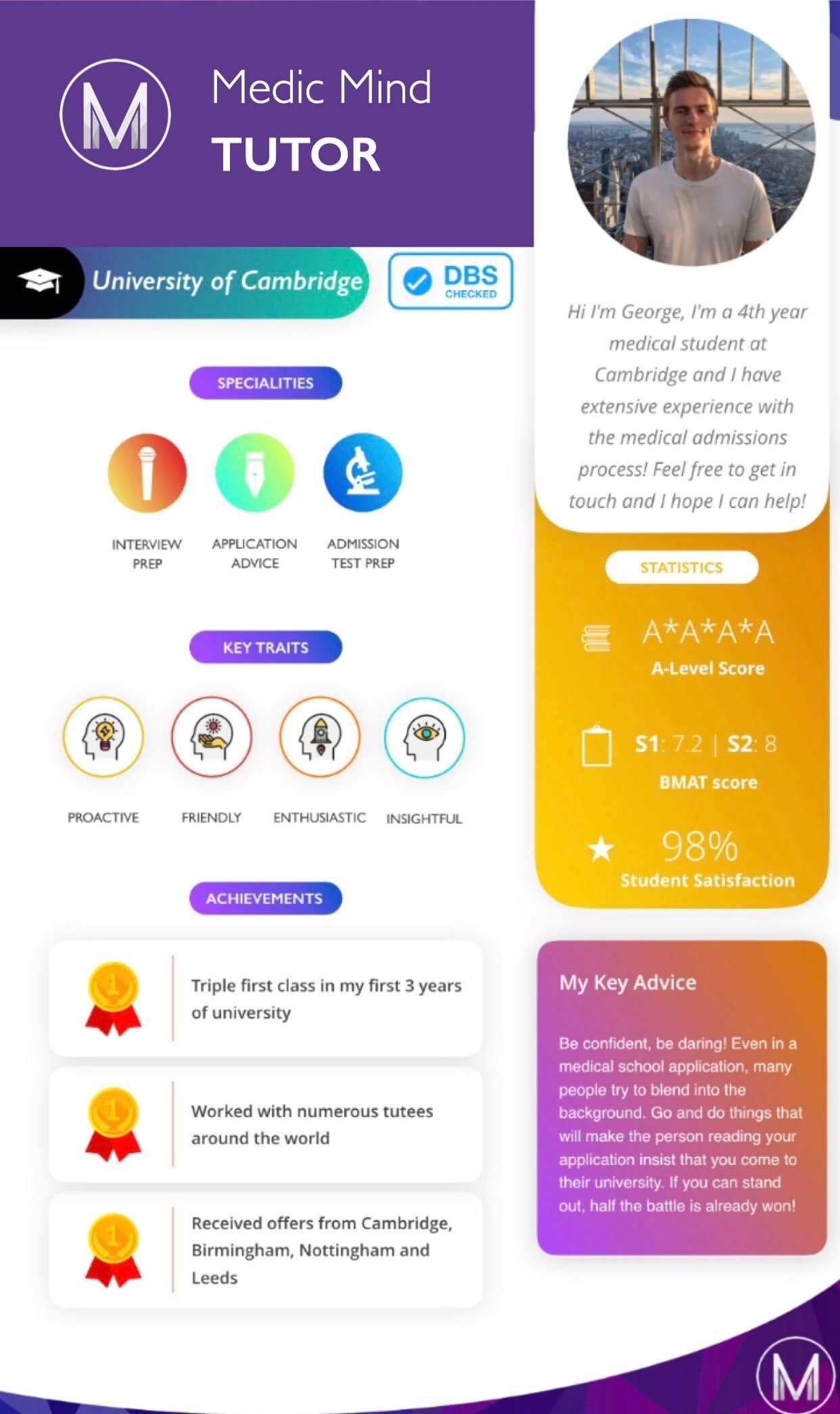
Start with an expert BMAT tutor
After your consultation, we consider everything you’re looking for - from location to prospective universities, and find a tutor that’s right for you. All of them are:

Build a personalised BMAT lesson plan
Your tutor will develop a personalised BMAT lesson plan for you based on the time until your test, the BMAT scores you are getting and your weak areas.

Maximise your BMAT potential
If you work hard and invest time into lessons, we'll give you the maximum possible chance to score above 13.5A
Keen on BMAT 1-1 Tutoring? From £30 per hour.
Book your medic mind consultation, start your medic mind journey, still got questions don’t worry, we’ve got you covered., →what is the bmat.
The BMAT stands for the Biomedical Admissions Test. It is an exam which is used for medical, dental and veterinary school in the UK and abroad. It is used by the following UK Medical Schools: Oxford, Cambridge, UCL, Imperial, Brighton & Sussex, Leeds and Lancaster.
→How many BMAT Past Papers are there?
In total, there are over 16 years of BMAT Past Papers as well as the specimen paper so that makes 17 BMAT Past Papers! That should give you lots of free BMAT preparation materials and free BMAT questions.
→How hard is the BMAT Exam?
No one can deny that the BMAT is a tricky exam however preparing well and using the right BMAT resources e.g. the Official BMAT Past Papers can put you in good stead to do well in the exam.
→What is a good BMAT score?
It's difficult to say as it varies year on year but we usually say you should aim for a score of above 5.7 in Section 1, 5.5 in Section 2 and 3A in Section 3. This tends to be above the threshold for most universities.
→What is in the BMAT Test?
The BMAT Test has 3 sections. Section 1 is made up of problem solving and critical thinking (data analysis no longer tested from 2020). Section 2 contains questions based on GCSE Biology, Chemistry, Maths and Physics. BMAT Section 3 is a scientific essay you have to write on an A4 page.
→When should I start preparing for BMAT?
You should aim to start preparing for BMAT at least 8 weeks beforehand. You should aim to do 2 to 3 hours a week for the first 3 weeks and then increase to 6 to 7 hours a week. This means if you are doing the BMAT in November, you should start in September and if you are doing the BMAT in September you should start in July.
→Is BMAT harder than UCAT?
The BMAT is very different to the UCAT but that doesn't mean it is harder. If you like essay writing, science or problem solving then BMAT is the exam for you. Otherwise, most people tend to find the UCAT easier.
→How long should you revise for BMAT?
You should revise for BMAT at least 2 to 3 times a week for up to 8 weeks to get the best possible preparation. It can be hard if you have school work too, but try and find some time to do some BMAT Past Papers, watch free BMAT videos on YouTube and kickstart your BMAT preparation.
→Do you take the BMAT in Year 12 or Year 13?
The BMAT usually takes place in Year 13 however if you're keen and want to get a trial run you can sit it in Year 12 and then sit it again in Year 13 to give you a flavour of the exam a year before.
→Where can I access free BMAT Questions?
For the BMAT, thankfully there are many free BMAT questions floating around! The free official BMAT past papers should be your main BMAT question resource. On this page we have free BMAT past paper explanations, which is helpful as the BMAT consortium sadly don't provide answer explanations. We've also compiled the free BMAT official questions by topic, so you can address each common S2 BMAT question type one by one.
→Where can I access free BMAT resources?
On our YouTube channel we've uploaded some free BMAT videos and a free mini BMAT course! On this web page, we have lots of free BMAT questions too.
Didn’t find the answer you’re looking for? Feel free to contact us directly
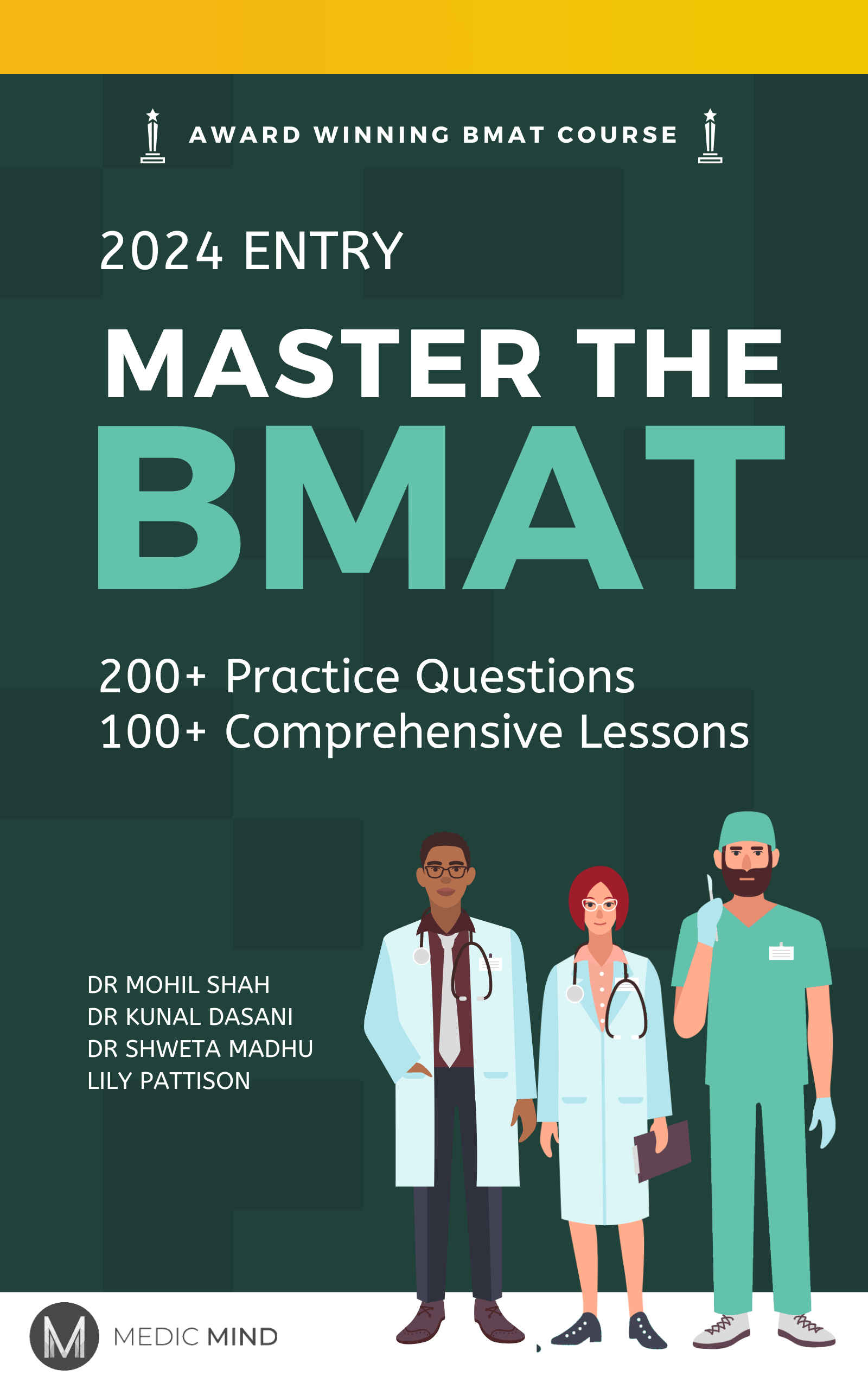
What are you looking for? ?
Let's get acquainted what is your name, nice to meet you, {{name}} what is your preferred e-mail address, nice to meet you, {{name}} what is your preferred phone number, what is your preferred phone number, just to check, what are you interested in, when should we call you, what time works best for you (uk time), how many hours of 1-1 tutoring are you looking for, my whatsapp number is..., for our safeguarding policy, please confirm....
Please provide the mobile number of a guardian/parent
Which online course are you interested in?
What is your query, you can apply for a bursary by clicking this link, sure, what is your query, thank you for your response. we will aim to get back to you within 12-24 hours., lock in a 2 hour 1-1 tutoring lesson now.
If you're ready and keen to get started click the button below to book your first 2 hour 1-1 tutoring lesson with us. Connect with a tutor from a university of your choice in minutes. (Use FAST5 to get 5% Off!)

BMAT Past Paper Compilations with Free Worked Solutions
Unsure how much to revise for BMAT? Looking for free explanations for Official BMAT Past Papers? Struggling to find BMAT Section 3 Essay Plans? Welcome to Study mind's BMAT Past Paper Bank with BMAT Past Paper Compilations for BMAT Sections 1 and 2 along with detailed explanations and worked solutions. We also have BMAT Section 3 Essay Plans - your golden BMAT resource.
BMAT S1 Past Papers
- | BMAT Past Paper 2020 Section 1 Question Paper Mark Scheme
- | BMAT Past Paper 2019 Section 1 Question Paper Mark Scheme
- | BMAT Past Paper 2018 Section 1 Question Paper Mark Scheme
- | BMAT Past Paper 2017 Section 1 Question Paper Mark Scheme
- | BMAT Past Paper 2016 Section 1 Question Paper Mark Scheme
- | BMAT Past Paper 2015 Section 1 Question Paper Mark Scheme
- | BMAT Past Paper 2014 Section 1 Question Paper Mark Scheme
- | BMAT Past Paper 2013 Section 1 Question Paper Mark Scheme
- | BMAT Past Paper 2012 Section 1 Question Paper Mark Scheme
- | BMAT Past Paper 2011 Section 1 Question Paper Mark Scheme
- | BMAT Past Paper 2010 Section 1 Question Paper Mark Scheme
- | BMAT Past Paper 2009 Section 1 Question Paper Mark Scheme
- | BMAT Past Paper 2008 Section 1 Question Paper Mark Scheme
- | BMAT Past Paper 2007 Section 1 Question Paper Mark Scheme
- | BMAT Past Paper 2006 Section 1 Question Paper Mark Scheme
- | BMAT Past Paper 2005 Section 1 Question Paper Mark Scheme
- | BMAT Past Paper 2004 Section 1 Question Paper Mark Scheme
- | BMAT Past Paper 2003 Section 1 Question Paper Mark Scheme
BMAT S2 Past Papers
- | BMAT Past Paper 2020 Section 2 Question Paper Mark Scheme
- | BMAT Past Paper 2019 Section 2 Question Paper Mark Scheme
- | BMAT Past Paper 2018 Section 2BMAT Past Paper 2018 Section 2 Question Paper Mark Scheme
- | BMAT Past Paper 2017 Section 2 Question Paper Mark Scheme
- | BMAT Past Paper 2016 Section 2 Question Paper Mark Scheme
- | BMAT Past Paper 2015 Section 2 Question Paper Mark Scheme
- | BMAT Past Paper 2014 Section 2 Question Paper Mark Scheme
- | BMAT Past Paper 2013 Section 2 Question Paper Mark Scheme
- | BMAT Past Paper 2012 Section 2 Question Paper Mark Scheme
- | BMAT Past Paper 2011 Section 2 Question Paper Mark Scheme
- | BMAT Past Paper 2010 Section 2 Question Paper Mark Scheme
- | BMAT Past Paper 2009 Section 2 Question Paper Mark Scheme
- | BMAT Past Paper 2008 Section 2 Question Paper Mark Scheme
- | BMAT Past Paper 2007 Section 2 Question Paper Mark Scheme
- | BMAT Past Paper 2006 Section 2 Question Paper Mark Scheme
- | BMAT Past Paper 2005 Section 2 Question Paper Mark Scheme
- | BMAT Past Paper 2004 Section 2 Question Paper Mark Scheme
- | BMAT Past Paper 2003 Section 2 Question Paper Mark Scheme
Biology BMAT Past Papers
- 12 | Inheritance and Genetics Question Paper Mark Scheme
- 11 | Homeostasis Question Paper Mark Scheme
- 4 | Digestion Question Paper Mark Scheme
- 6 | Respiration Question Paper Mark Scheme
- 5 | Cell Division Question Paper Mark Scheme
- 6 | Nervous System Question Paper Mark Scheme
- 3 | Natural Selection Question Paper Mark Scheme
- 5 | Genetic Engineering Question Paper Mark Scheme
- 2 | Cell Structure Question Paper Mark Scheme
- 1 | Heart and Circulation Question Paper Mark Scheme
- 3 | Kidneys Question Paper Mark Scheme
- 1 | Carbon Cycle Question Paper Mark Scheme
Physics BMAT Past Papers
- 11 | Waves Question Paper Mark Scheme
- 10 | Electricity Question Paper Mark Scheme
- 3 | Speed, Distance, Time Question Paper Mark Scheme
- 1 | S.I. Units Question Paper Mark Scheme
- 9 | Energy and Work Done Question Paper Mark Scheme
- 6 | Forces Question Paper Mark Scheme
- 2 | Dentistry Question Paper Mark Scheme
- 2 | Electromagnetism Question Paper Mark Scheme
- 9 | Radioactivity Question Paper Mark Scheme
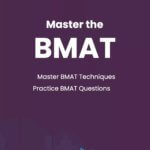
Chemistry BMAT Past Papers
- 4 | Atomic Structure Question Paper Mark Scheme
- 3 | Separation Question Paper Mark Scheme
- 14 | Calculations Question Paper Mark Scheme
- 1 | Electrolysis Question Paper Mark Scheme
- 5 | Structure and Bonding Question Paper Mark Scheme
- 1 | Equilibria Question Paper Mark Scheme
- 9 | Balancing Equations Question Paper Mark Scheme
- 3 | Reactions & Elements Question Paper Mark Scheme
- 4 | Rates Question Paper Mark Scheme
- 3 | Organic Question Paper Mark Scheme
Maths BMAT Past Papers
- 18 | Algebra Question Paper Mark Scheme
- 1 | Transformations Question Paper Mark Scheme
- 2 | Calculations Question Paper Mark Scheme
- 5 | Area & Length Question Paper Mark Scheme
- 4 | Trigonometry Question Paper Mark Scheme
- 6 | Probabilities Question Paper Mark Scheme
- 1 | Ratios Question Paper Mark Scheme
- 2 | Graphs and Gradients Question Paper Mark Scheme
- 1 | Means Question Paper Mark Scheme
Critical Thinking BMAT Past Papers
- | Assumptions Question Paper Mark Scheme
- | Conclusions Question Paper Mark Scheme
- | Flaws Question Paper Mark Scheme
- | Inferences Question Paper Mark Scheme
- | Strengthening Evidence Question Paper Mark Scheme
- | Weakening Evidence Question Paper Mark Scheme
- | Other Question Paper Mark Scheme
- | Conclusions (IMAT) Question Paper Mark Scheme
- | Conclusions 2 (IMAT) Question Paper Mark Scheme
- | Assumptions (IMAT) Question Paper Mark Scheme
- | Flaws (IMAT) Question Paper Mark Scheme
- | Effect of Evidence (IMAT) Question Paper Mark Scheme
- | Applying Principles (IMAT) Question Paper Mark Scheme
- | Matching Arguments (IMAT) Question Paper Mark Scheme
BMAT Section 3 Essay Plans
- | BMAT 2016 Q1 Question Paper Mark Scheme
- | BMAT 2016 Q2 Question Paper Mark Scheme
- | BMAT 2016 Q3 Question Paper Mark Scheme
- | BMAT 2017 Q1 Question Paper Mark Scheme
- | BMAT 2017 Q2 Question Paper Mark Scheme
- | BMAT 2017 Q3 Question Paper Mark Scheme
- | BMAT 2018 Q1 Question Paper Mark Scheme
- | BMAT 2018 Q2 Question Paper Mark Scheme
- | BMAT 2018 Q3 Question Paper Mark Scheme
BMAT S3 Past Papers
- | BMAT Past Paper 2019 Section 3 Question Paper Mark Scheme
- | BMAT Past Paper 2018 Section 3 Question Paper Mark Scheme
- | BMAT Past Paper 2017 Section 3 Question Paper Mark Scheme
- | BMAT Past Paper 2016 Section 3 Question Paper Mark Scheme
- | BMAT Past Paper 2015 Section 3 Question Paper Mark Scheme
- | BMAT Past Paper 2014 Section 3 Question Paper Mark Scheme
- | BMAT Past Paper 2013 Section 3 Question Paper Mark Scheme
- | BMAT Past Paper 2012 Section 3 Question Paper Mark Scheme
- | BMAT Past Paper 2011 Section 3 Question Paper Mark Scheme
- | BMAT Past Paper 2010 Section 3 Question Paper Mark Scheme
- | BMAT Past Paper 2009 Section 3 Question Paper Mark Scheme
- | BMAT Past Paper 2008 Section 3 Question Paper Mark Scheme
- | BMAT Past Paper 2007 Section 3 Question Paper Mark Scheme
- | BMAT Past Paper 2006 Section 3 Question Paper Mark Scheme
- | BMAT Past Paper 2005 Section 3 Question Paper Mark Scheme
- | BMAT Past Paper 2004 Section 3 Question Paper Mark Scheme
- | BMAT Past Paper 2003 Section 3 Question Paper Mark Scheme
FREE BMAT Textbook
- Free Guide on Acing the BMAT
- 50+ Practice Questions
- Learn effective techniques
→ What is BMAT?
BMAT stands for BioMedical Admissions Test. It is an aptitude test used for admission to undergraduate biomedical courses at certain universities in the United Kingdom.
→ What are BMAT past paper compilations?
BMAT past paper compilations are collections of previous years' BMAT papers that have been made available to students for practice and preparation. These papers provide an opportunity for candidates to familiarize themselves with the format and types of questions that they might encounter in the actual BMAT test.
→ Why are BMAT past paper compilations useful?
BMAT past paper compilations are useful because they provide candidates with an opportunity to practice and hone their skills before taking the actual test. By familiarizing themselves with the types of questions and format of the test, candidates can improve their performance and increase their chances of success.
→ What are free worked solutions?
Free worked solutions are explanations of the correct answers to questions that are provided with BMAT past paper compilations. These solutions help students understand the reasoning behind the correct answer and can aid in their understanding of the subject matter.
→ Are there any free BMAT past paper compilations with worked solutions available?
Yes, there are several websites that offer free BMAT past paper compilations with worked solutions. These resources are helpful for students who want to prepare for the BMAT test without incurring any additional costs.
→ How can I access free BMAT past paper compilations with worked solutions?
You can access free BMAT past paper compilations with worked solutions by searching online. There are several websites that offer these resources for free, including BMAT Ninja, The Medic Portal, and UniAdmissions.
→ How should I use BMAT past paper compilations with worked solutions?
To make the most of BMAT past paper compilations with worked solutions, you should start by taking a full-length practice test under test conditions. Once you have completed the test, you can use the worked solutions to check your answers and identify any areas where you may need to improve. You can then use this information to guide your study and preparation for the actual BMAT test.
→ Can using BMAT past paper compilations with worked solutions guarantee success in the BMAT test?
While using BMAT past paper compilations with worked solutions can be helpful, it is important to remember that there is no guarantee of success in the BMAT test. Success in the test depends on a variety of factors, including your overall preparation, knowledge of the subject matter, and test-taking skills. However, using these resources can certainly increase your chances of success and help you feel more confident and prepared on test day.
Let's get acquainted ? What is your name?
Nice to meet you, {{name}} what is your preferred e-mail address, nice to meet you, {{name}} what is your preferred phone number, what is your preferred phone number, just to check, what are you interested in, when should we call you.
It would be great to have a 15m chat to discuss a personalised plan and answer any questions
What time works best for you? (UK Time)
Pick a time-slot that works best for you ?
How many hours of 1-1 tutoring are you looking for?
My whatsapp number is..., for our safeguarding policy, please confirm....
Please provide the mobile number of a guardian/parent
Which online course are you interested in?
What is your query, you can apply for a bursary by clicking this link, sure, what is your query, thank you for your response. we will aim to get back to you within 12-24 hours., lock in a 2 hour 1-1 tutoring lesson now.
If you're ready and keen to get started click the button below to book your first 2 hour 1-1 tutoring lesson with us. Connect with a tutor from a university of your choice in minutes. (Use FAST5 to get 5% Off!)
Our Services
College Admissions Counseling
UK University Admissions Counseling
EU University Admissions Counseling
College Athletic Recruitment
Crimson Rise: College Prep for Middle Schoolers
Indigo Research: Online Research Opportunities for High Schoolers
Delta Institute: Work Experience Programs For High Schoolers
Graduate School Admissions Counseling
Private Boarding & Day School Admissions
Online Tutoring
Essay Review
Financial Aid & Merit Scholarships
Our Leaders and Counselors
Our Student Success
Crimson Student Alumni
Our Reviews
Our Scholarships
Careers at Crimson
University Profiles
US College Admissions Calculator
GPA Calculator
Practice Standardized Tests
SAT Practice Test
ACT Practice Tests
Personal Essay Topic Generator
eBooks and Infographics
Crimson YouTube Channel
Summer Apply - Best Summer Programs
Top of the Class Podcast
ACCEPTED! Book by Jamie Beaton
Crimson Global Academy
+1 (646) 419-3178
Go back to all articles
Mastering the BMAT: Your Essential Guide to Oxford and Cambridge Medical Admissions
/f/64062/1200x800/72cc4ed21e/mother-daughter-1.png)
Importance of BMAT
Test structure and format.
How to Prepare for the BMAT
Are you looking to study biomedical sciences or medicine at Oxford or Cambridge? If so, sitting for the Biomedical Admissions Test (BMAT) is compulsory! The BMAT is a key component of the application process, providing a level playing field for applicants to distinguish themselves. In this blog post, the BMAT will be detailed, along with insights and tips to aid adequate preparation. Read on!
Who Needs to Take the BMAT?
The Biomedical Admissions Test (BMAT) is a critical requirement for those aspiring to enter certain medical, veterinary, and related health courses at a range of universities in the UK , including prestigious institutions like the University of Oxford and the University of Cambridge . This standardised test is designed to assess fundamental skills and aptitudes crucial to succeeding in these demanding fields, such as problem-solving, critical thinking, and scientific knowledge application. Its objective nature ensures that all applicants, regardless of their educational background, are evaluated fairly, making it a key step for anyone targeting a career in these medical and health disciplines.
In the context of Oxford and Cambridge’s highly competitive medical school admissions, the significance of the BMAT cannot be overstated. As a standardised test, it plays a pivotal role in assessing the aptitude and skills essential for success in medical school.
The admissions team at Oxford and Cambridge utilises the BMAT to differentiate among the large pool of strong applicants they receive each year. Specifically, the BMAT focuses on evaluating candidates' abilities in problem-solving, critical thinking, and communication — all vital competencies for thriving in medical school.
A strong performance in the BMAT can substantially enhance an applicant’s likelihood of being called for an interview and ultimately receiving an offer . In this way, a candidate’s BMAT score becomes a crucial component of the selection process, serving as a key criterion for shortlisting candidates for the interview stage.

The BMAT is structured into three sections , each focusing on different skill sets and question types. The time allocated for each section varies, with 30 minutes for sections 2 and 3 and 60 minutes for section 1.
In terms of scoring, the BMAT uses a 9-point scale , with each section being scored separately. For Sections 1 and 2, candidates earn one mark for each correct answer and 0 for incorrect answers.
These scores are then placed on the 9-point BMAT scale. Section 3, however, is scored differently. It's initially scored out of 5, and these raw marks are later adjusted to fit the 1.0 to 9.0 scale, aligning with the scores of the other sections. The average BMAT score typically falls between 4.0 and 6.0, with 6.0 and above considered strong.
BMAT Test Structure and Format Summary Table
Breakdown of the bmat test sections: understanding the core components.
In the first section, candidates are assessed on their understanding of fundamental biological concepts and principles through multiple-choice questions. This section is similar to the UCAT Verbal Reasoning section, necessitating a careful and logical approach. To excel, candidates must practice diligently, focusing on developing a deep understanding of various concepts and applying them in diverse and increasingly complex scenarios.
The second section evaluates candidates’ ability to apply scientific knowledge and skills to problem-solving . Often familiar to many, this section is generally considered the easiest to prepare for among the three. It specifically assesses problem-solving, critical thinking, and communication skills. Success hinges on sufficient practice to gain familiarity with the questions and tackling each problem logically.
The final section focuses on communication and wider reading, requiring candidates to discuss different viewpoints on given subject areas . This section tests the ability to present arguments, consider various perspectives, and reach reasoned conclusions. Effective preparation can involve reviewing past essay topics, engaging in discussions with others, and practicing writing argumentative essays. Throughout the practice, it's important to develop the skill of dissecting the question, planning responses in advance, and forming concise yet well-supported arguments.
How to Prepare for the BMAT?
Preparing for the BMAT requires a strategic approach to ensure comprehensive coverage of all topics and skills assessed in the test. Here are some refined tips and strategies to help you prepare effectively:
1. Start Early: Building a Strong Foundation
- Importance of Time Management: Beginning your preparation early provides ample time to thoroughly understand each topic.
- Gradual Learning: This approach allows for a more effective absorption of information, avoiding the stress of cramming.
2. Create a Study Plan: Structuring Your Preparation
- Daily/Weekly Goals: Establish specific goals for each day or week to monitor progress and maintain focus.
- Tailored Focus: Allocate more time to weaker areas, ensuring a balanced and comprehensive understanding.
- Week 1-3: Focus on mastering each section with regular reviews.
- Week 4: Intensive revision of weaker areas.
- Week 5-7: Practice under timed conditions to improve speed and accuracy.
3. Get Disciplined and Practice: The Key to Mastery
- Consistent Practice: Regular practice is essential for familiarity with the exam's format and types of questions.
- Diverse Resources: Utilize a range of study materials, including past papers and online resources.
4. Seek Feedback and Assistance: Leveraging External Help
- Peer Review: Collaborate with peers for new perspectives and problem-solving methods.
- Professional Guidance: Seek advice from tutors or teachers, especially for complex topics or essay writing.
5. Work Sustainably: Balancing Rigor with Rest
- Avoid Burnout: Integrate adequate rest into your study plan to maintain mental well-being.
- Active Breaks: Engage in relaxing yet active breaks, such as sports or hobbies.
6. Take Practice Tests: Simulating the Exam Experience
- Realistic Simulation: Timed tests help adapt to the exam's pressure and time constraints.
- Identifying Patterns: Regular tests aid in recognizing common mistakes and challenging areas.
Check out Cambridge Assessment Admissions Testing’s free BMAT preparation materials
7. Stay Calm and Focused: Mental Preparedness on Test Day
- Mindfulness Techniques: Use techniques like deep breathing to stay calm during the exam.
- Time Management: Develop and adhere to a time allocation strategy for different test sections.
8. Book a Free Consultation: Seeking Expert Guidance from Crimson Education Advisors
- Expert Advice: Scheduling a free consultation with a Crimson Education advisor , especially one with experience at Oxford and/or Cambridge, can provide invaluable insights and practical steps for BMAT preparation.
- Tailored Strategies: These advisors can offer personalized advice to enhance your study methods and overall approach, significantly increasing your chances of success in the BMAT and your journey to gaining admission to Oxford or Cambridge.
- Comprehensive Support: They can help in identifying your strengths and weaknesses, providing targeted strategies that cater to your individual needs and aspirations.
Common Pitfalls to Avoid
1. insufficient practice: emphasizing regular preparation.
- Consistent Effort: Consistent and thorough practice is crucial for success in the BMAT.
- Varied Exercises: Engage in diverse practice exercises to cover all test aspects.
2. Poor Time Management: Mastering the Clock
- Strategic Approach: Avoid spending excessive time on challenging questions and allocate your time wisely.
- Pacing Techniques: Practice pacing like in a marathon, ensuring steady progress throughout the test.
3. Overlooking the Essay Section: Honing Writing Skills
- Equal Importance: Balance your preparation to include significant essay writing practice.
- Structured Responses: Focus on structuring essays effectively with clear arguments and concise conclusions.
4. Neglecting Weak Areas: Addressing All Topics
- Comprehensive Review: Identify and work on weaker areas, not just on strengths or familiar topics.
- Seek Help: If certain areas remain challenging, seek additional help or resources.
5. Stress and Anxiety: Maintaining Composure
- Mindfulness Practices: Use techniques like meditation or deep breathing to manage stress.
- Simulated Conditions: Regular practice under exam-like conditions can help reduce anxiety.
6. Underestimating the Test: Respect the BMAT's Complexity
- Realistic Expectations: Recognize the BMAT's challenge and approach it with dedication.
- In-depth Study: Aim for a deep understanding of each topic, beyond superficial knowledge.
These tips address the common pitfalls encountered by BMAT candidates, offering strategies to improve preparation and performance in the test.

Essential Strategies for BMAT Test Day Success
1. prepare and arrive early.
Ensure you comply with all instructions and bring the required identification materials on test day. Avoid unnecessary stress before the test by arriving 15-20 minutes early for check-in. This allows you some quiet time to calm your nerves. The last thing you want is to enter the exam venue feeling anxious and flustered from having rushed.
2. Read Questions Carefully
It's crucial to read each question carefully and with precision. Answering questions incorrectly due to a misreading can be easily avoided with this careful approach.
3. Time Management
You may encounter questions that momentarily stump you. Don't dwell on these longer than your allocated time per question. Move to secure marks from other questions first, then return to the challenging ones. In multiple-choice sections, like sections 1 and 2, it's wise to eliminate options, make an informed preliminary guess, and revisit the question later.
4. Stay Level-Headed
Find ways to quieten and calm your mind. This could be through meditation, prayer, or any routine that helps you stay composed. Experiment with different techniques during your timed practices and replicate them on the day. Remind yourself that you have prepared diligently for the test and that it's simply a matter of executing it like another practice test.
Final Thoughts
As you receive your BMAT scores and reflect on the journey thus far, the next phase of your journey to Oxford unfolds. Here's a structured approach to navigating the post-test steps effectively:
- Understand where your score positions you in the competitive landscape. A high score can be a significant advantage, but don't be discouraged if it's not as high as you hoped. Every part of your application matters.
- If your BMAT score aligns with the requirements of your chosen course at Oxbridge, prepare for the possibility of being shortlisted for interviews. These interviews are a critical component of the selection process and demand as much preparation as the BMAT itself.
- Regularly check the official Oxford and Cambridge website for updates on the application process, interview schedules, and any additional requirements specific to your course.
- Take the time to reflect on your BMAT experience. What went well? What could have been better? Use these insights to improve and prepare for the next stages.
- Consider booking a free consultation with an expert Crimson Education counselor. These counselors, especially those with experience in Oxbridge admissions, can provide tailored advice to maximize your chances of success. They can help refine your interview skills, polish your personal statement, and provide insights into the Oxbridge admissions process.
- Remember, the journey to Oxbridge is a marathon, not a sprint. Maintain a positive outlook and stay prepared for each step of the process.
The journey to a top UK University is challenging but immensely rewarding. With the right preparation, mindset, and guidance, you can enhance your prospects and make your dream a reality. Remember, the effort you put in now can open doors to a world of opportunities. Stay focused, stay motivated, and take the first step towards your future at Oxbridge.

What Makes Crimson Different
Key Resources & Further Reading
- Join our free webinars on US university applications
- Free eBooks and guides to help with the college application process
- How to Apply to UK Universities
- Oxford vs Cambridge: Which One is Right For You?
- How to get into Oxford?
- How to get into Cambridge?
More Articles
What are ucas points a comprehensive guide to understanding ucas points and how they work.
/f/64062/800x450/3193ce3e9c/oxford-blogs.jpg)
450 Ideas and Everything You Need to Know About the EPQ
/f/64062/1200x630/68147087ae/when-should-i-start-working-on-my-college-applications-2.jpg)
Unveiling the Past: Reflections on the Riches of Studying History in the UK
/f/64062/1600x900/0ecd62f24b/cambridge-uni.jpeg)
Crimson students are 7x more likely to gain acceptance to their dream college!
Remember, you don't have to navigate this journey alone. crimson provides a comprehensive suite of services, from academic mentoring and test prep to essay assistance, extracurricular guidance, and career mentoring, ensuring a holistic approach to your college preparation journey..
Log In to BMAT Ninja
Welcome back :).

BMAT Free Past Papers, Worked Solutions and Answers
Free bmat questions & mark schemes for all bmat past papers.
Welcome to the most popular BMAT past paper resource for Oxbridge applicants! Below you will find BMAT question and answer documents for all BMAT past papers . We recommend using this BMAT question bank to structure your BMAT revision. Alongside practicing BMAT questions, you can maximise your chance of gaining an Oxbridge Offer with our specialist BMAT 1-1 programmes . Call us on 020 3305 9593 to find out more.
BMAT Section 1 Past Papers
1 | 2020 | BMAT Past Paper Section 1
2 | 2019 | BMAT Past Paper Section 1
3 | 2018 | BMAT Past Paper Section 1
4 | 2017 | BMAT Past Paper Section 1
5 | 2016 | BMAT Past Paper Section 1
6 | 2015 | BMAT Past Paper Section 1
7 | 2014 | BMAT Past Paper Section 1
8 | 2013 | BMAT Past Paper Section 1
9 | 2012 | BMAT Past Paper Section 1
10 | 2011 | BMAT Past Paper Section 1
11 | 2010 | BMAT Past Paper Section 1
12 | 2009 | BMAT Past Paper Section 1
13 | 2008 | BMAT Past Paper Section 1
14 | 2007 | BMAT Past Paper Section 1
15 | 2006 | BMAT Past Paper Section 1
16 | 2005 | BMAT Past Paper Section 1
17 | 2004 | BMAT Past Paper Section 1
18 | 2003 | BMAT Past Paper Section 1
BMAT Section 2 Past Papers
1 | 2020 | BMAT Past Paper Section 2
2 | 2019 | BMAT Past Paper Section 2
3 | 2018 | BMAT Past Paper Section 2
4 | 2017 | BMAT Past Paper Section 2
5 | 2016 | BMAT Past Paper Section 2
6 | 2015 | BMAT Past Paper Section 2
7 | 2014 | BMAT Past Paper Section 2
8 | 2013 | BMAT Past Paper Section 2
9 | 2012 | BMAT Past Paper Section 2
10 | 2011 | BMAT Past Paper Section 2
11 | 2010 | BMAT Past Paper Section 2
12 | 2009 | BMAT Past Paper Section 2
13 | 2008 | BMAT Past Paper Section 2
14 | 2007 | BMAT Past Paper Section 2
15 | 2006 | BMAT Past Paper Section 2
16 | 2005 | BMAT Past Paper Section 2
17 | 2004 | BMAT Past Paper Section 2
18 | 2003 | BMAT Past Paper Section 2
BMAT Section 3 Past Papers
1 | 2019 | BMAT Past Paper Section 3
2 | 2018 | BMAT Past Paper Section 3
3 | 2017 | BMAT Past Paper Section 3
4 | 2016 | BMAT Past Paper Section 3
5 | 2015 | BMAT Past Paper Section 3
6 | 2014 | BMAT Past Paper Section 3
7 | 2013 | BMAT Past Paper Section 3
8 | 2012 | BMAT Past Paper Section 3
9 | 2011 | BMAT Past Paper Section 3
10 | 2010 | BMAT Past Paper Section 3
11 | 2009 | BMAT Past Paper Section 3
12 | 2008 | BMAT Past Paper Section 3
13 | 2007 | BMAT Past Paper Section 3
14 | 2006 | BMAT Past Paper Section 3
15 | 2005 | BMAT Past Paper Section 3
16 | 2004 | BMAT Past Paper Section 3
17 | 2003 | BMAT Past Paper Section 3
Biology BMAT Past Papers
12 | Inheritance and Genetics
11 | Homeostasis
4 | Digestion
6 | Respiration
5 | Cell Division
6 | Nervous System
3 | Natural Selection
5 | Genetic Engineering
2 | Cell Structure
1 | Heart and Circulation
3 | Kidneys
1 | Carbon Cycle
Physics BMAT Past Papers
10 | Electricity
3 | Speed, Distance, Time
1 | S.I. Units
9 | Energy and Work Done
2 | Density
2 | Electromagnetism
9 | Radioactivity
Chemistry BMAT Past Papers
4 | Atomic Structure
3 | Separation
14 | Calculations
1 | Electrolysis
5 | Structure and Bonding
1 | Equilibria
9 | Balancing Equations
3 | Reactions & Elements
3 | Organic
Maths BMAT Past Papers
18 | Algebra
1 | Transformations
2 | Calculations
5 | Area & Length
4 | Trigonometry
6 | Probabilities
2 | Graphs and Gradients
Critical Thinking BMAT Past Papers
1 | Assumptions
2 | Conclusions
4 | Inferences
5 | Strengthening Evidence
6 | Weakening Evidence
8 | Conclusions (IMAT)
9 | Conclusions 2 (IMAT)
10 | Assumptions (IMAT)
11 | Flaws (IMAT)
12 | Effect of Evidence (IMAT)
13 | Applying Principles (IMAT)
14 | Matching Arguments (IMAT)
BMAT Section 3 Essay Plans
1 | BMAT 2016 Q1
2 | BMAT 2016 Q2
3 | BMAT 2016 Q3
4 | BMAT 2017 Q1
5 | BMAT 2017 Q2
6 | BMAT 2017 Q3
7 | BMAT 2018 Q1
8 | BMAT 2018 Q2
9 | BMAT 2018 Q3
Number of BMAT Questions since 2009
Download BMAT Free Notes
- Free Guide on Acing BMAT
- Detailed Techniques for BMAT
- Made for 2023 Specification
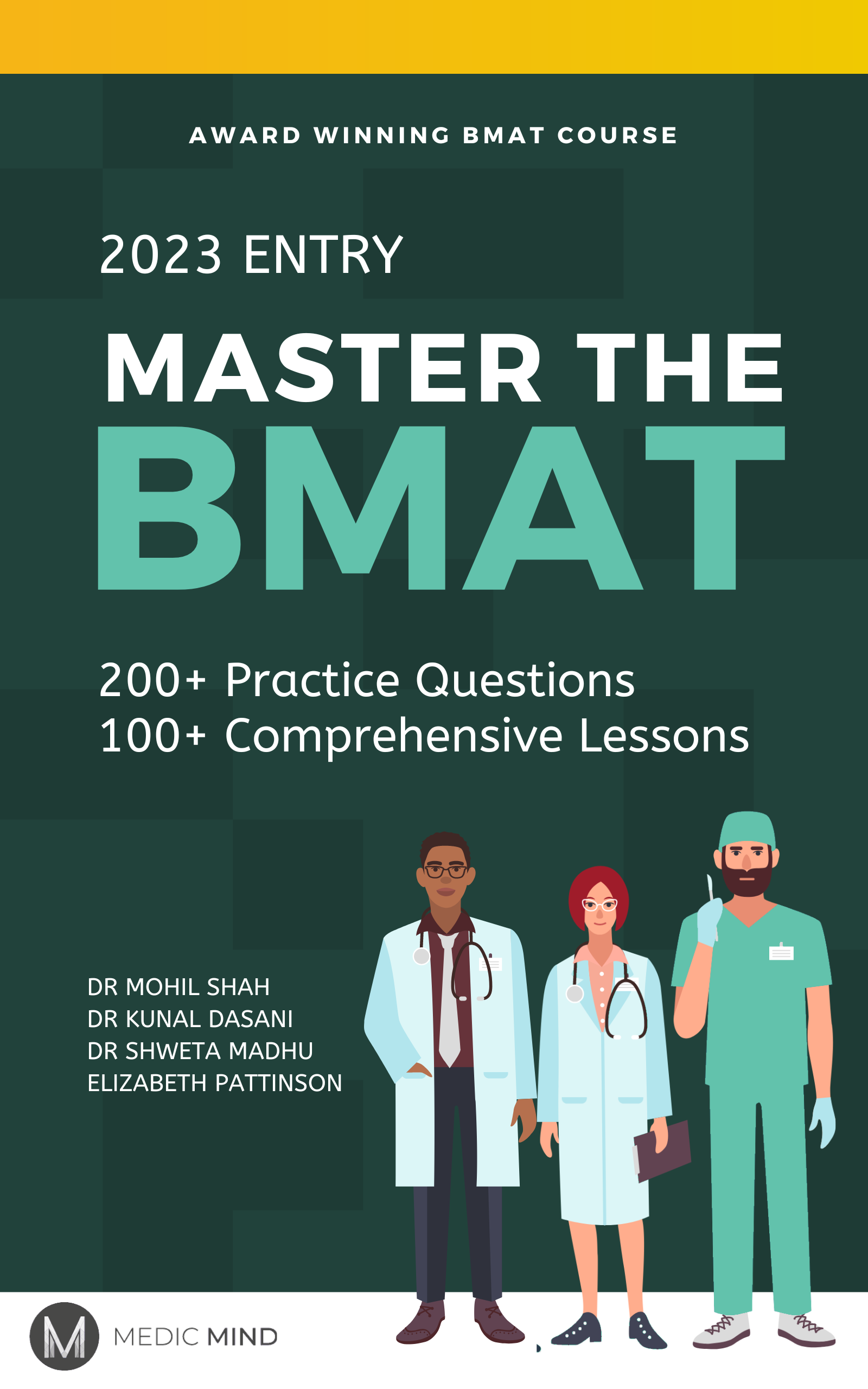
Premium BMAT Tutoring
Comprehensive Application Support
Upon a triumphant application submission, every student is matched with an Oxbridge BMAT tutor who possesses expertise in their chosen field of study.
In your initial sessions, your designated Oxbridge BMAT tutor will collaborate with you to forge a tailored approach aimed at succeeding in your BMAT exam.
To secure your admission to Oxbridge, leverage our online BMAT exam resources and actively participate in regular enrichment workshops throughout your program. Additionally, benefit from attending our comprehensive full-day Group Workshops, where you will gain prime counsel to ensure successful application completion!
- Architecture
- Biomedical Sciences
- Biochemistry
- Computer Science
- Engineering
- Human Sciences
- Land Economy
- Modern Languages
- Natural Sciences
- Veterinary Medicine
- PAT Preparation Course
Book Your Consultation


BMAT Essay Titles
To help you with your bmat preparation we have prepared a free list of every bmat essay title since 2010., from 2017 there have been 3 essays to choose from on section 3 of the bmat. prior to this there were 4 essays to choose from. remember you only need to do one in the exam, but it shouldn’t be longer than one side of a4.
1. ‘He who has never learned to obey cannot be a good commander’. (Aristotle)
Explain what you understand by this statement. Argue to the contrary. To what extent do you agree that someone cannot be a good leader without learning how to follow?
2. The only moral obligation a scientist has is to reveal the truth.
What is the reasoning behind this statement? Present an argument to the contrary. To what extent do you agree that the only moral duty a scientist has is to reveal the truth?
3. The health care profession is wrong to treat ageing as if it were a disease.
What do you understand by this statement? Argue that it is not wrong to treat the effects of ageing as if they were a disease. To what extent do you agree with the statement?
1. ‘You can resist an invading army; you cannot resist an idea whose time has come.’ (Victor Hugo)
Explain the reasoning behind this statement. Argue that, on the contrary, any idea can be suppressed with sufficient force. What do you think gives power to an idea?
2. Science is not a follower of fashion nor of other social or cultural trends.
Explain what you think the statement means. Argue to the contrary. To what extent do you agree with the statement?
3. The option of taking strike action should not be available to doctors as they have a special duty of care to their patients.
Explain what is meant by this statement. Argue that it should be possible for doctors to go on strike as other workers do. To what extent should doctors’ duty of care to patients affect the conditions of their employment?
4. If we truly care about the welfare of animals, we must recognise them as fellow members of our communities with their own political rights and status.
Explain the thinking behind this statement. Argue that it is not necessary to confer political rights or status upon animals in order to ensure their welfare. To what extent is it possible to incorporate the interests of animals into political institutions?
1. “Computers are useless. They can only give you answers.” (Pablo Picasso)
Explain what is meant by this statement. Argue to the contrary. What are the real limits of technology?
2. “That which can be asserted without evidence, can be dismissed without evidence.” (Christopher Hitchens)
Explain what you think Christopher Hitchens means. Argue to the contrary that some assertions do not require evidence. To what extent do you agree with the statement?
3. When treating an individual patient, a physician must also think of the wider society.
Explain the reasoning behind this statement. Argue that a doctor should only consider the individual that he or she is treating at the time. With respect to medical treatment, to what extent can a patient’s interests differ from those of the wider population?
4. Just because a behaviour occurs amongst animals in the wild does not mean it should be allowed within domesticated populations of the same species.
Explain what you think is meant by this statement. Argue to the contrary. To what extent should humans interfere with the natural behaviours of animals
1. There is no such thing as dangerous speech; it is up to people to choose how they react.
Explain the reasoning behind this statement. Argue to the contrary that there can be instances of dangerous speech. To what extent should a society put limitations on speech or text that it considers threatening?
2. Science has been a process of continuous advancement towards objective truth.
Explain what is meant by this statement. Argue to the contrary. To what extent do you agree that science is a continuous process of advancement towards objective truth?
3. There is money to be made from not curing disease.
What do you think is meant by this statement? Argue to the contrary. To what extent do you agree that there is money to be made from disease?
4. Modern veterinary medicine is more for the benefit of humans than the animals under its care.
Explain what you understand by this statement. Argue to the contrary that veterinary medicine is concerned more with the benefit of non-human animals. How might human and non-human interests diverge within the practice of veterinary medicine?
1. “When you want to know how things really work, study them when they are coming apart.” (William Gibson)
Explain what this statement means. Argue to the contrary. To what extent do you agree with the assertion?
2. Good surgeons should be encouraged to take on tough cases, not just safe, routine ones. Publishing an individual surgeon’s mortality rates may have the opposite effect.
Explain what this statement means. Argue to the contrary. To what extent do you think league tables should change a surgeon’s behaviour?
3. “Ignorance more frequently begets confidence than does knowledge: it is those who know little, and not those who know much, who so positively assert that this or that problem will never be solved by science.” (Charles Darwin)
Explain what you think is meant by this statement. Argue to the contrary. To what extent do you think it is true?
4. In a world where we struggle to feed an ever-expanding human population, owning pets cannot be justified.
Explain what is meant by this statement. Argue that pet ownership is indefensible. How should moral or ethical concerns influence a decision to own a pet?
1. “Doubt is not a pleasant condition, but certainty is absurd.” (Voltaire)
Explain what this statement means. Argue to the contrary that to be certain about something is not necessarily absurd. To what extent do you agree with Voltaire?
2. “There is something attractive about people who don’t regard their own health and longevity as the most important things in the world.” (Alexander Chancellor)
Explain what this statement means. Argue that nothing is more important than one’s own health and longevity. To what extent do you agree with Alexander Chancellor?
3. The scientist is not someone who gives the right answers but one who asks the right questions.
Explain what this statement means. Argue to the contrary that the right answers are more important than the right questions. To what extent do you agree that the right questions must be asked before science can progress?
4. “… Dolphins are very intelligent and so similar to humans that they are worthy of a special ethical status: that of ‘non-human persons’.”
Explain what this statement means. Argue to the contrary that dolphins should not be given special ethical status. To what extent do you agree that intelligence and similarity to humans bestows special ethical status?
1. Democratic freedom means there should be no restriction on what may be said in public.
Explain what you think democratic freedom means. Argue that there should be restrictions on what is said in public. To what extent do you agree that there should be limitations on what can be said in public?
2. The art of medicine consists of amusing the patient while nature cures the disease. ( Voltaire)
Explain what this statement means. Argue to the contrary that medicine does in fact do more than amuse the patient. To what extent do you think Voltaire is correct?
3. A scientific man ought to have no wishes, no affections – a mere heart of stone. ( Charles Darwin)
Explain what this statement means. Argue that scientific enquiry benefits from personal wishes and affections. To what extent do you think a scientist should have ‘a mere heart of stone’?
4. Veterinary pet care in the UK should be free at the point of delivery, as human care is.
Explain the argument behind this statement. Argue to the contrary, that if people choose to keep pets they should pay for all aspects of their care. To what extent do you agree that there should be free pet care?
1. Anyone who has a serious ambition to be a president or prime minister is the wrong kind of person for the job.
What is the reasoning behind this statement? Argue to the contrary that without serious ambition to be a leader a person would not be suited to the job. To what extent is ambition required to succeed as a political leader?
2. People injured whilst participating in extreme sports should not be treated by a publicly funded health service.
Explain the reasoning behind this statement. Suggest an argument against this statement. To what extent, if any, does the statement justify a change in public attitudes to personal risk taking?
3. A pet belongs to its owner – it is their property. Thus, if a client asks for their healthy cat to be painlessly euthanased, a veterinary clinician should always agree to this request.
Explain the reasoning behind the statement. Argue to the contrary that a veterinary clinician should never agree to such a request. To what extent should pet owners influence clinicians’ decisions?
4. Science only tells us what is possible, not what is right.
Explain what this statement means. Argue to the contrary that science helps us to judge what is right. To what extent can decisions about what is right and wrong be informed by science?
Personal Statements
Our one-to-one UCAT tutoring, online UCAT course and UCAT question bank (coming soon) gives you the confidence to ace your UCAT.
Testimonials
Our happy customers.
"I found the sessions incredibly useful and they helped me gain confidence for the interview. They even tailored my sessions specifically to each medical school I had an interview for, focussing on the aspects I found most challenging."
Leeds Medical School
"The Prep Medics tuition was the most beneficial resource I used during the medical school application process. I had been on a number of interview courses prior to coming to Prep Medics and had been left confused with two rejections post interview. In just a couple of sessions with Prep Medics, however, they identified the areas I was weak on and geared intensive preparation towards the style of questions in my remaining interviews."
St. George's Medical School
"Thank you so much to Maheen and Daniyal for their help and support in my medical application. The one-to-one sessions were really productive and informative and it was really useful focussing time on improving the areas where I was weaker. I would definitely recommend Prep Medics!"
King's College London
"Thank you for the brilliant webinar this weekend! It was a very high quality session and included so much useful information for our students!"
A School in London
BMAT Study Tips
There’s only a small number of universities that require the BMAT, but those that do are often very high-achieving competitive medical schools.
What is the BMAT?
Like the UKCAT the British Medical Aptitude Test (BMAT) is another admissions test that some medical and veterinary schools use to assess the applicants’ abilities and approaches.
UCAT Study Tips
We know it can all sound a bit confusing. Another exam to revise for? And it’s not based on your school curriculum either? We’ve put together some useful tips to help you prepare for your UCAT!
What is the UCAT?
Many medical schools use the UCAT to select medical students. So what is the UCAT and how can I prepare for it?
To help you with your BMAT Preparation we have prepared a list of every Section 3 BMAT essay title since 2010.
Applying to Medical School – Timeline
For a truly successful medical school application you must prepare in advance. Our team of medical students have put together a timeline on what the process was like for them.
Applying to Medical School in the UK
The process of applying to medical school can be confusing. So to help you kick-start the journey we have put together a short intro guide on the application process.

IMAGES
VIDEO
COMMENTS
Section 3 of the BMAT requires you to write a short essay that covers a maximum of one side of A4 paper. You are given a choice of three essay titles that are usually in the form of a statement or a direct quote. Normally, you'll be asked to explain the reasoning behind the statement, argue to the contrary and then make a conclusion, although the sub questions can vary.The quality of your ...
BMAT.Ninja was used by 2 in 3 applicants in 2022. BMAT.Ninja teaches you everything you need to know for the BMAT, takes you through over 6,000 timed practice questions, and gives you fully worked solutions every step of the way. GET ACCESS SIGN UP FREE. BMAT.Ninja - The World's Best BMAT Preparation Platform.
Section 3 of the BMAT is the most unique, being an essay writing question. This guide will teach you everything you need to know to get top marks! ... Every part of the essay question and subsequent prompts have been addressed by your ideas; Writing Your Essay. The essay should be divided into three main parts: an Introduction, a Main Body, and ...
You can find official BMAT past papers on the Cambridge Assessment Admissions Testing website. Here is last year's BMAT exam: Section 1, Section 2, Section 3. Using our BMAT Question Bank, you can sit past papers online, get accurate marks according to the BMAT syllabus and find out your score. It also allows you to see model answers so you ...
The BMAT examination is scheduled to take place on Wednesday 3rd November 2021. For 2020 entry, there was also an option for a September BMAT sitting (with results released prior to the 15th October deadline). This option was not present for 2021 entry and it is presently unclear if this option will be available for 2022 entry.
This paper is Section 3 of 3. A separate answer sheet is provided for this section. Please check you have one. You must complete the answer sheet in black pen. This question paper contains a choice of three tasks, of which you must complete only one. There is space on the question paper for preliminary notes.
Want to boost your BMAT Score? Sure thing, you can do it after watching these BMAT Tips Series - that's everything you need to know about BMAT Section 3. U...
using the BMAT Section 2 guide or your own books. While the topics and knowledge required are at a level typically covered in school, the questions require you to . demonstrate your understanding by . applying. your knowledge to scientific problems. For this reason, you need to . revise your science and mathematics . and
BMAT is a two-hour admissions test that assesses a combination of aptitude and knowledge. It tests a broad range of skills across three sections: Section 1 tests your skills in problem-solving, understanding arguments, and data analysis and inference. You'll answer 32 multiple-choice questions in 60 minutes. Section 2 examines your ability to ...
BMAT Questions with Example Plans https: bit.ly pmt-cc https:bit.lypmt-edu https: bit.ly pmt-cc This work by PMT Education is licensed under CC BY-NC-ND 4.0. ... This essay question encourages the consideration of science as objective rather than subjective . A scientist should attempt to clarify the truth , rather than persuade their colleague
A BMAT Past Paper Bank with BMAT Past Paper Explanations for BMAT Section 1, BMAT Section 2 and BMAT Essay Plans. ⚡️ Boost your A-Level revision this Easter with our LIVE revision classes. Now with 10% OFF with the code EASTER10. ... For the BMAT, thankfully there are many free BMAT questions floating around! The free official BMAT past ...
A BMAT Past Paper Bank with BMAT Past Paper Explanations for BMAT Section 1, BMAT Section 2 and BMAT Essay Plans. Report an Issue. Official UK Government Partner. 1,276 Reviews +44 (0) 20 3305 9593 [email protected] ... BMAT Section 3 Essay Plans | BMAT 2016 Q1 Question Paper Mark Scheme | BMAT 2016 Q2 Question Paper Mark Scheme | BMAT 2016 Q3 ...
Truth develops society, "greater good". Example: Scientists do not have same constraints e.g. animal testing. To combat the utilitarianism point, previously inapplicable fields are now the basis for technologies. Conclusion - "to what extent". Truth is the driver of scientific work.
BMATMedic's 2022 BMAT Analysis. Subreddit Announcement. Hi everyone as always, here is my yearly review of the Autumn BMAT. This year the BMAT took a pretty bold approach by bringing forward an extremely unbalanced test. Some areas were significantly more difficult than previous years; however, some areas were also much easier than usual.
The BMAT is structured into three sections, each focusing on different skill sets and question types. The time allocated for each section varies, with 30 minutes for sections 2 and 3 and 60 minutes for section 1. In terms of scoring, the BMAT uses a 9-point scale, with each section being scored separately. For Sections 1 and 2, candidates earn ...
Crafted with love by a team of Oxbridge medical students, the system teaches you everything you need to know for the BMAT, takes you through over 1,000 timed practice questions, and gives you fully worked solutions every step of the way.
Below you will find BMAT question and answer documents for all BMAT past papers. We recommend using this BMAT question bank to structure your BMAT revision. Alongside practicing BMAT questions, you can maximise your chance of gaining an Oxbridge Offer with our specialist BMAT 1-1 programmes. Call us on 020 3305 9593 to find out more.
The BMAT examination is scheduled to take place on Wednesday 2nd November 2022. For 2020 entry, there was also an option for a September BMAT sitting (with results released prior to the 15th October deadline). This option was not present for 2021, 2022 and 2023 entry and it is presently unclear if this option will be available for 2024 entry.
This paper is Section 1 of 3. Your supervisor will collect this question paper and answer sheet before giving out Section 2. A separate answer sheet is provided for this section. Please check you have one. You also require a soft pencil and an eraser. Speed as well as accuracy is important in this section.
To help you with your BMAT Preparation we have prepared a free list of every BMAT Essay title since 2010. From 2017 there have been 3 essays to choose from on section 3 of the BMAT. Prior to this there were 4 essays to choose from. Remember you only need to do one in the exam, but it shouldn't be longer than one side of A4!
I saw that no one made a megathread for BMAT so I decided to just make 1 for yall! Advertisement Coins. 0 coins. Premium Powerups Explore Gaming. ... October 2022 BMAT Discussion . ... paper 2 paper 1 was really good and paper 3 was good but paper 2 was horrendous the timing was terrible i did 10 solid questions looked up and had 5 minutes left
2023 Applicants: Official Undergraduate Medicine 2023 Entry. Graduate Entry Medicine 2023 Entry. Medicine 2023 entry for resit / retake / gap year applicants. A100 Medicine for International Students 2023 Entry. Medicine Interview discussion 2023 Entry. 2023 entry A100 / A101 Medicine fastest and slowest offer senders.
10. Hey there, thanks for posting a question in the Medicine forum. The Medicine forum gets a high volume of questions being posted, and some of these are already answered by the resources and Megathreads that members of the community and volunteers have created. This is an automatic post which is designed to highlight these resources.